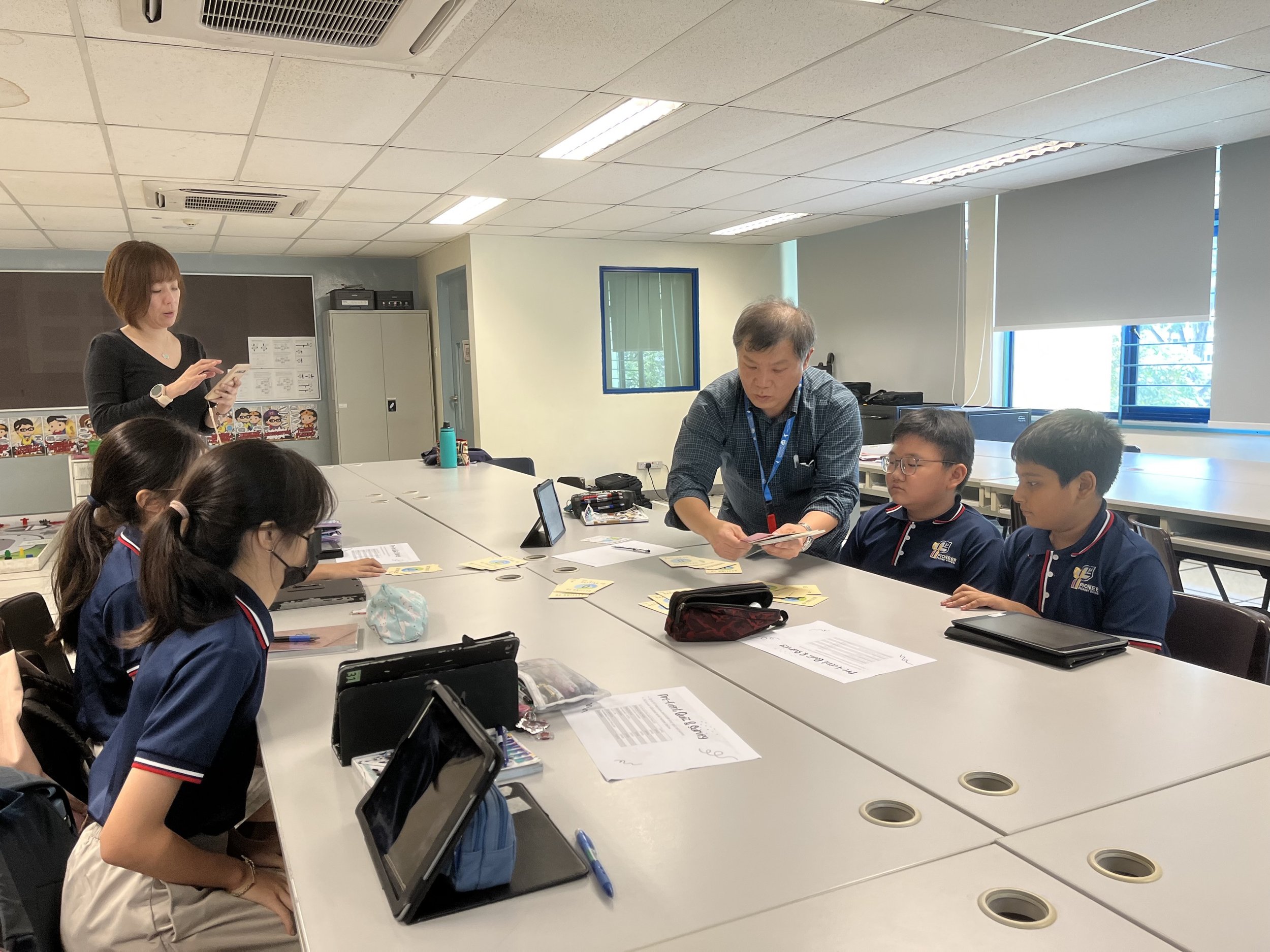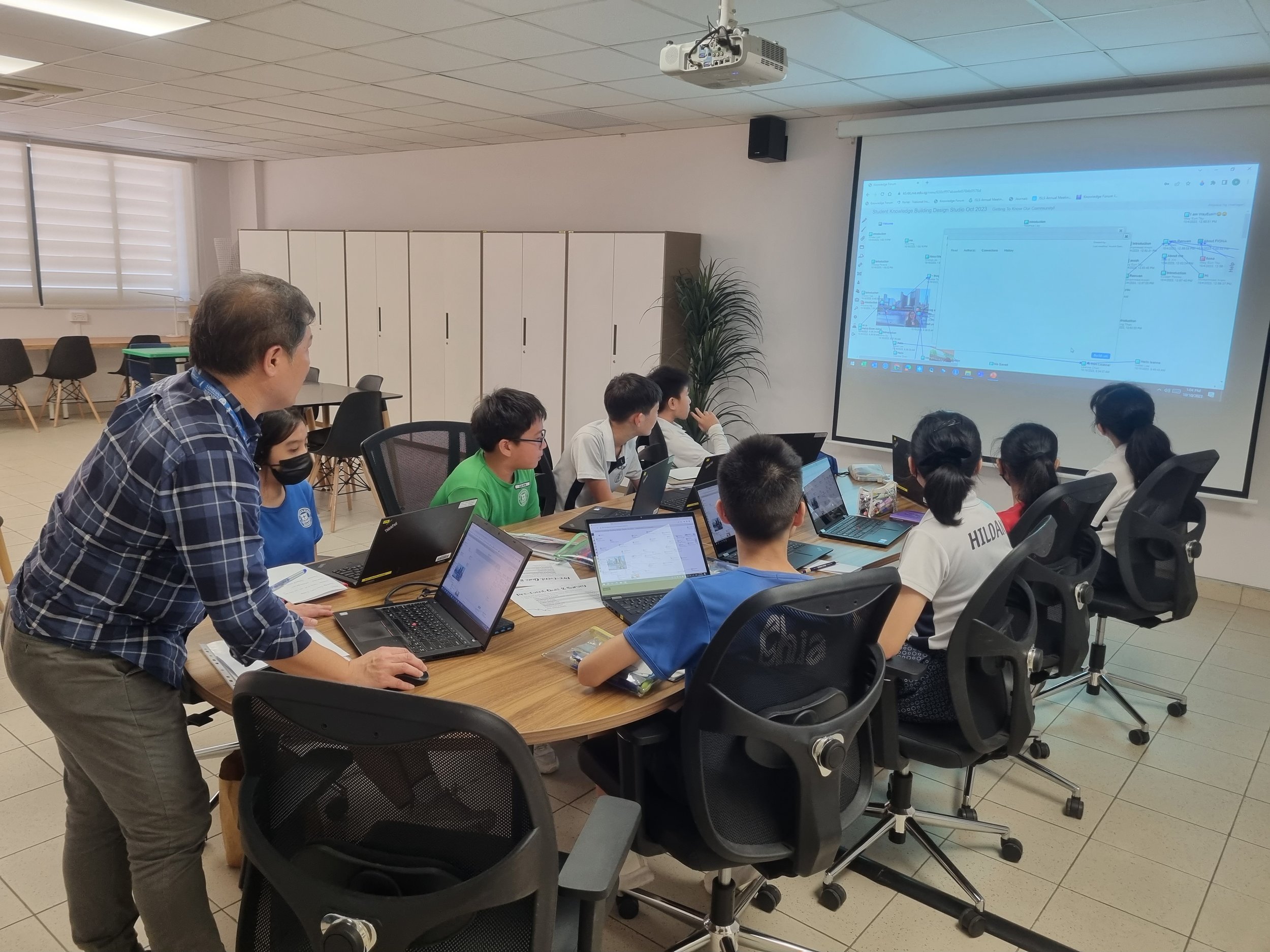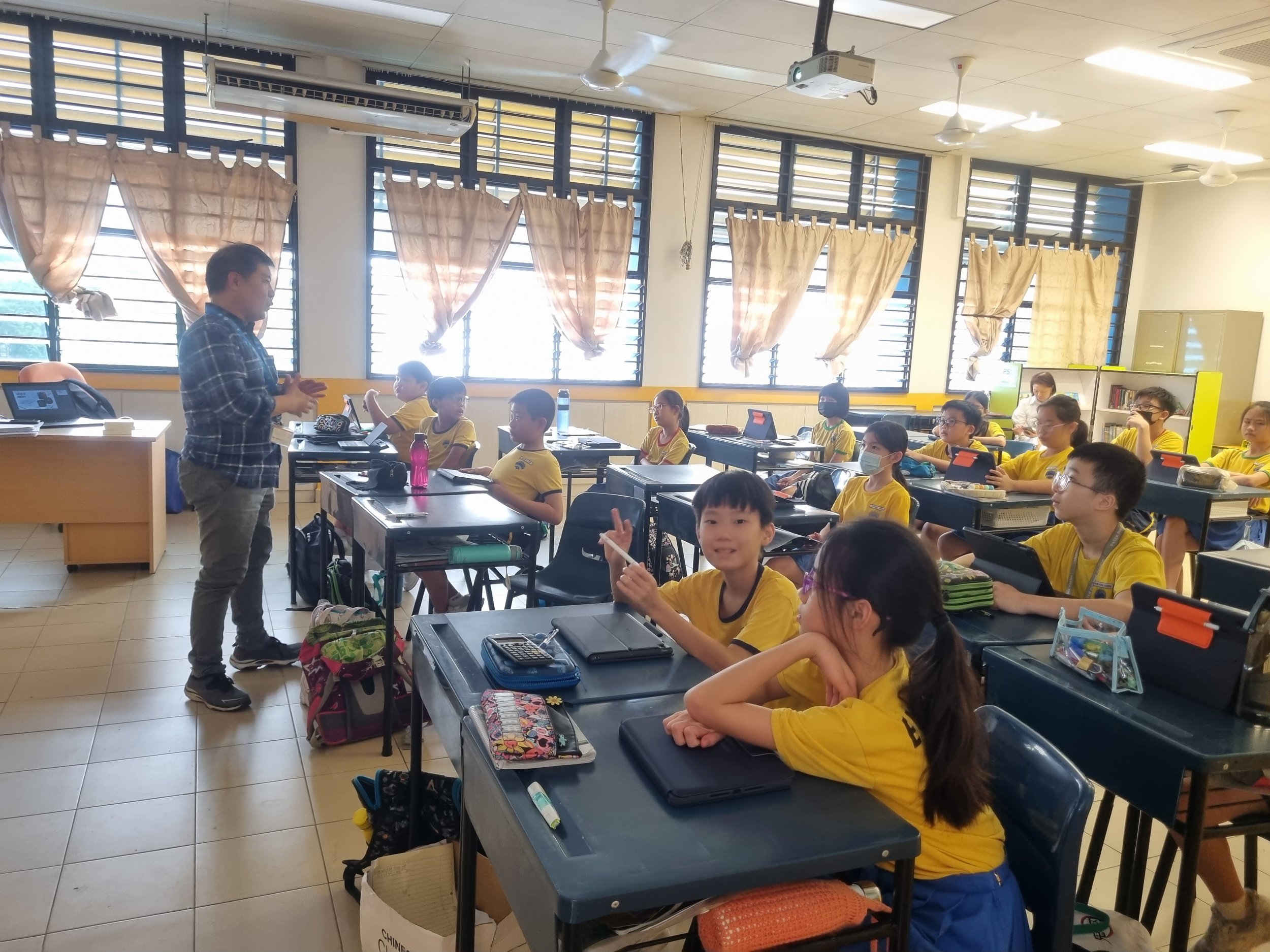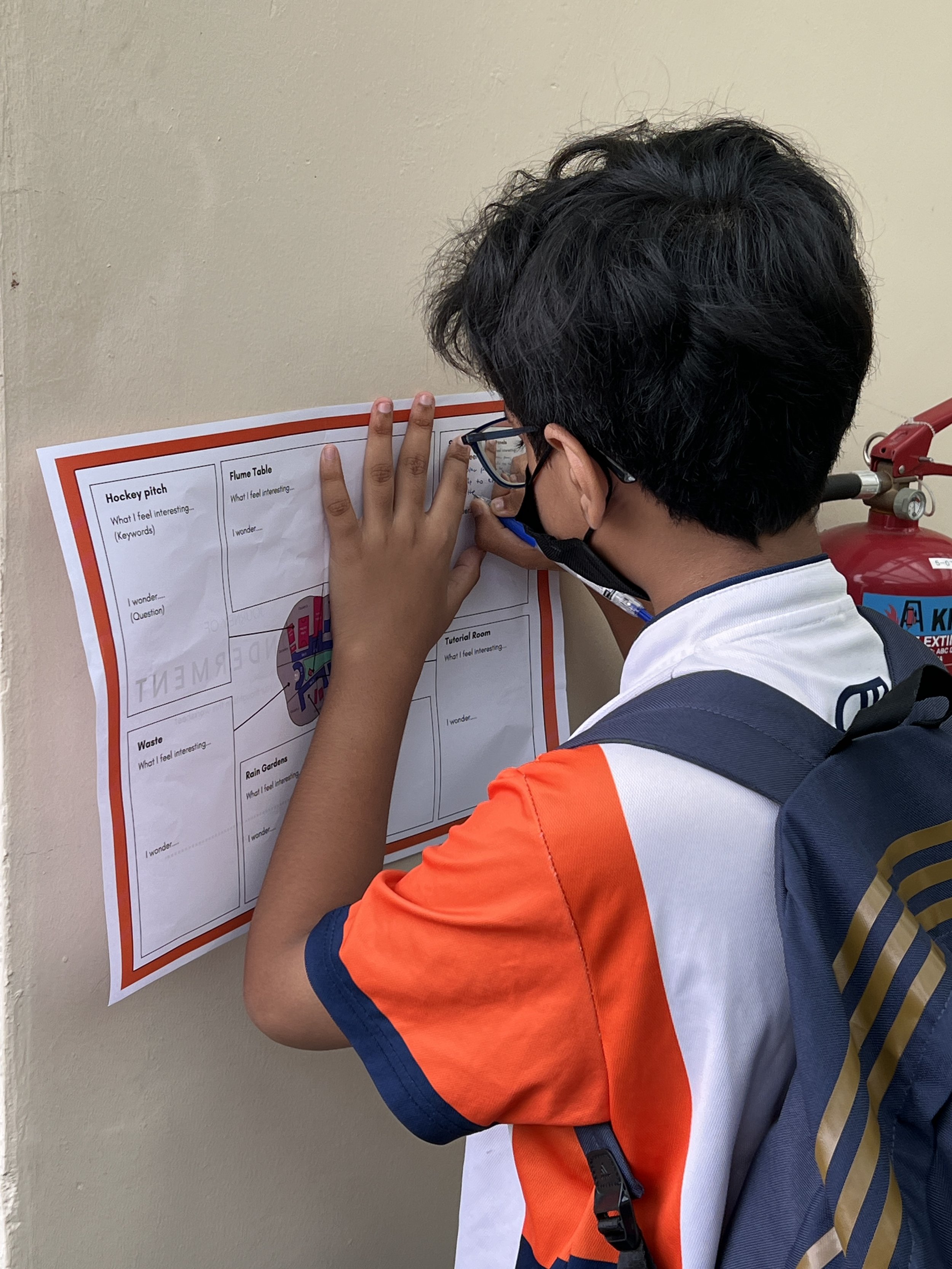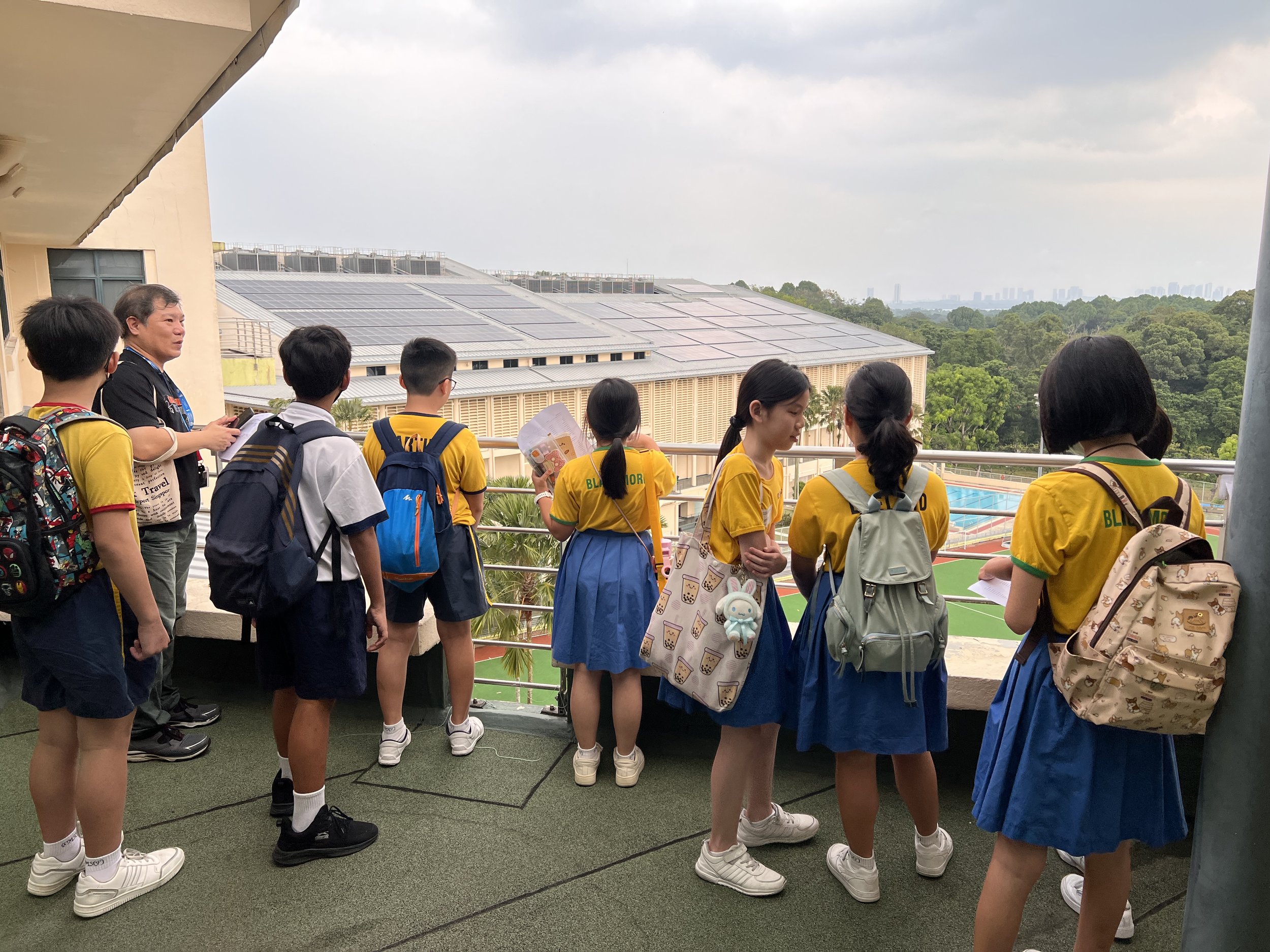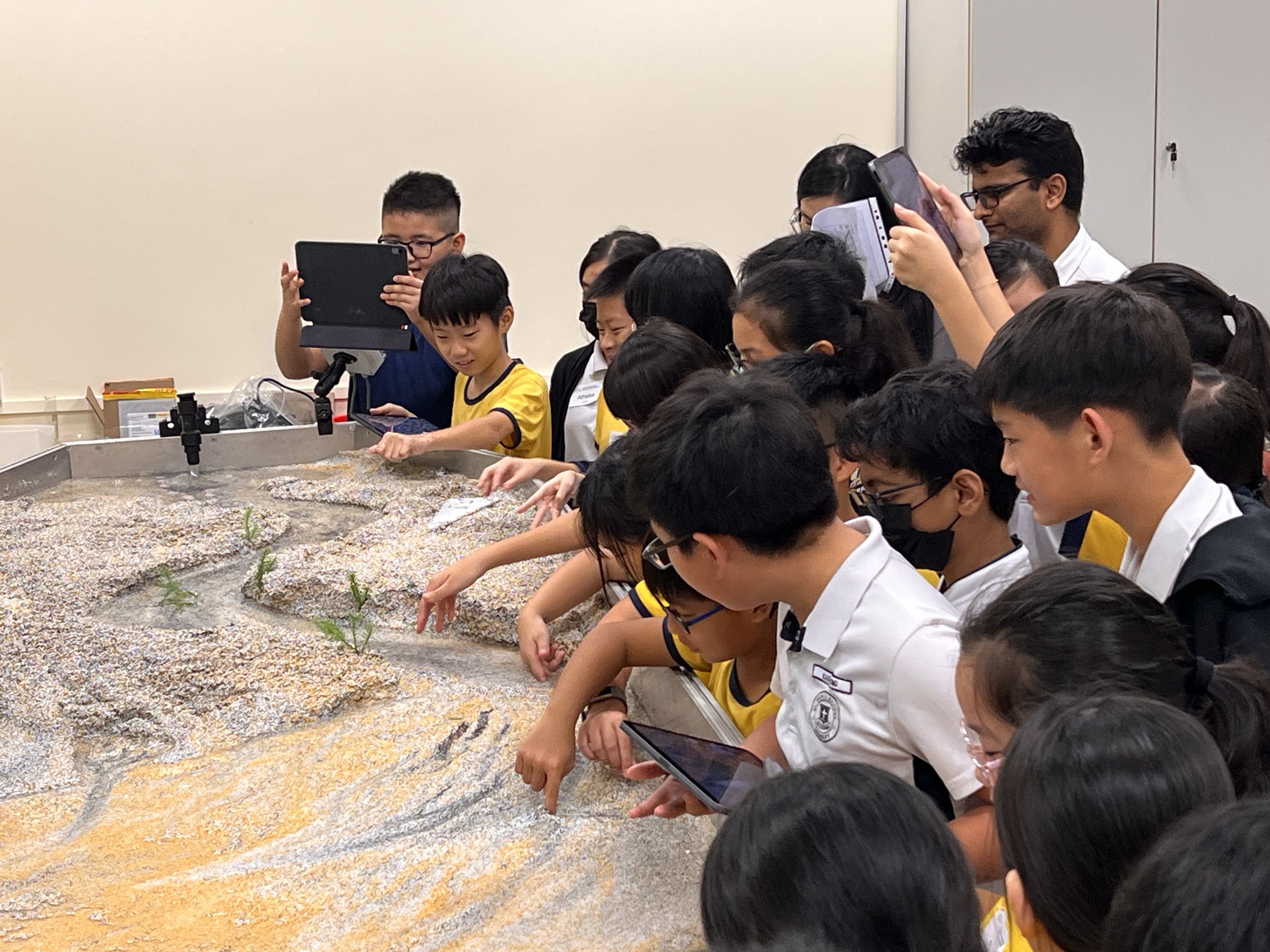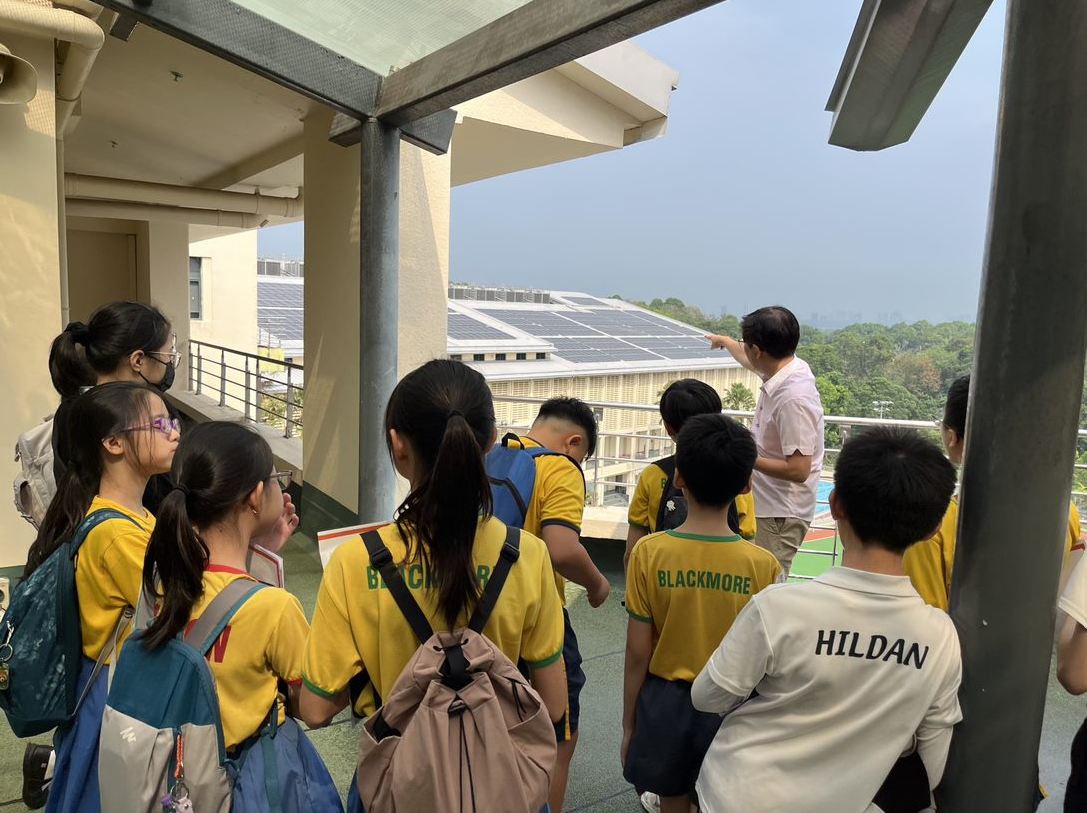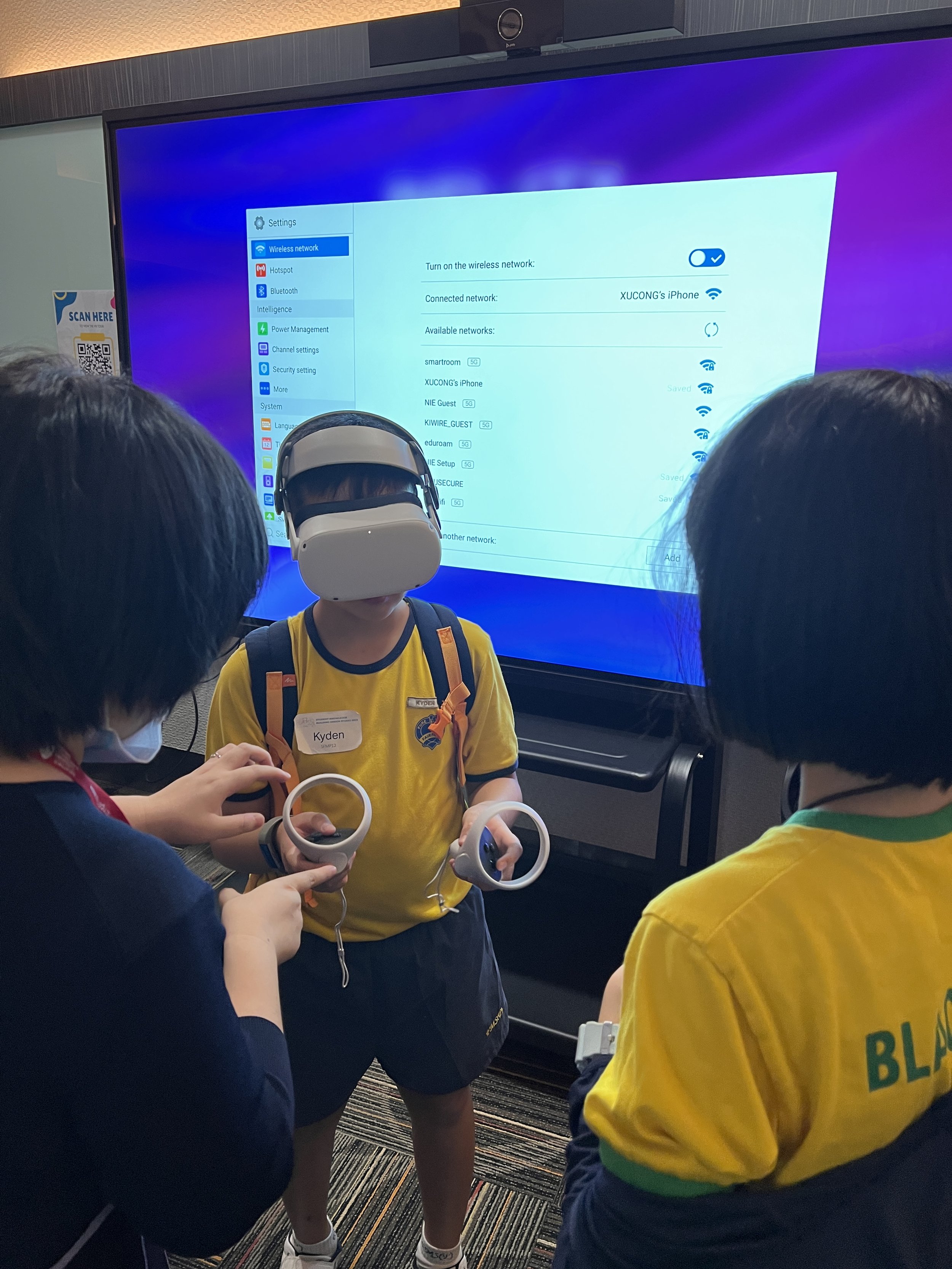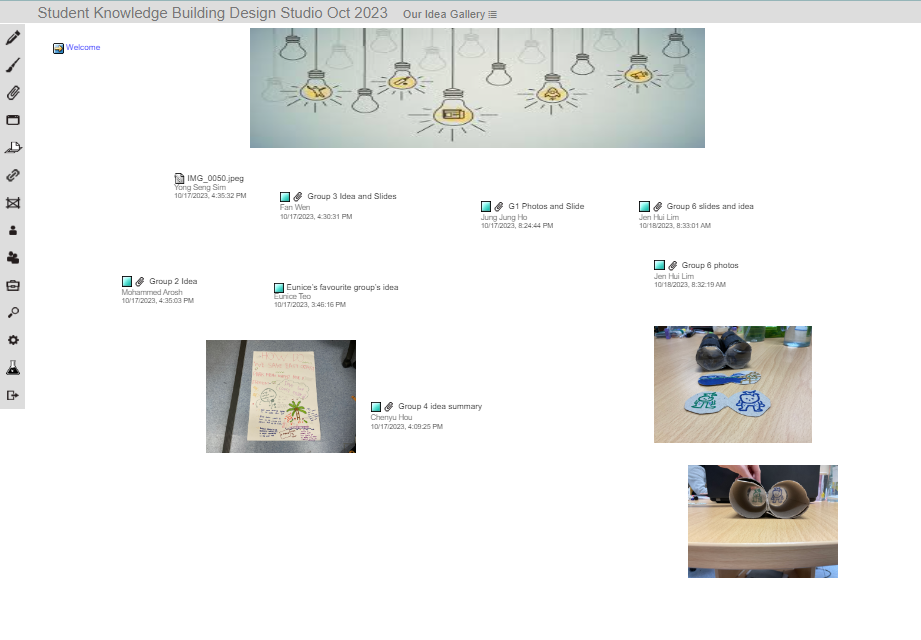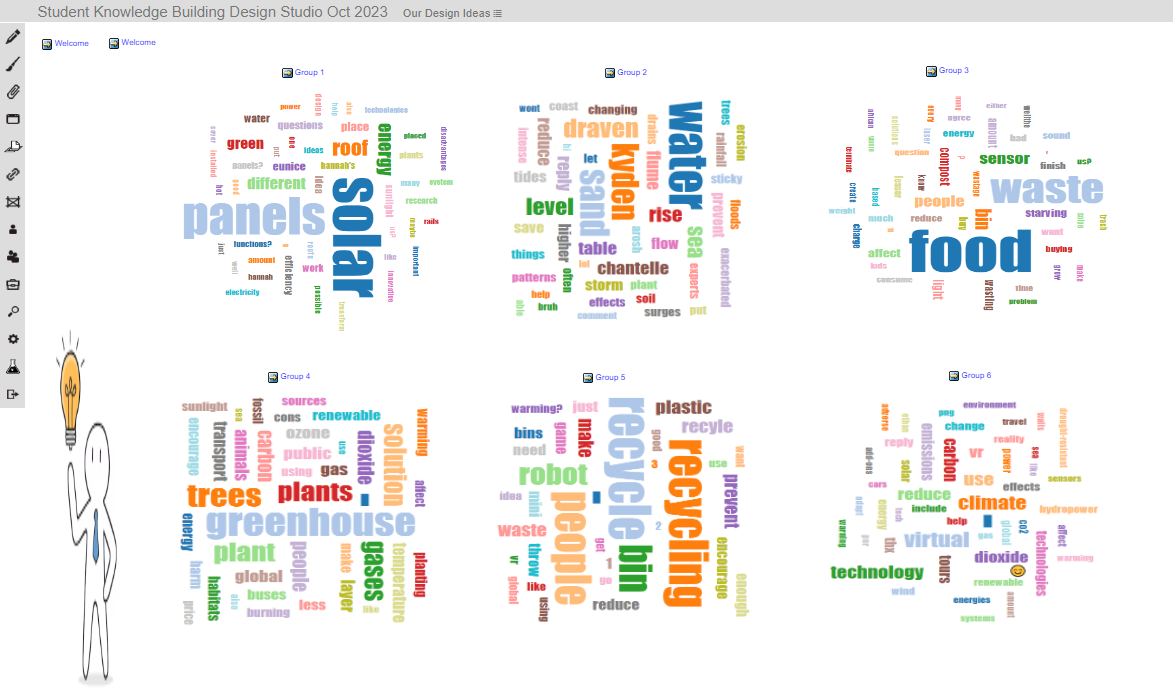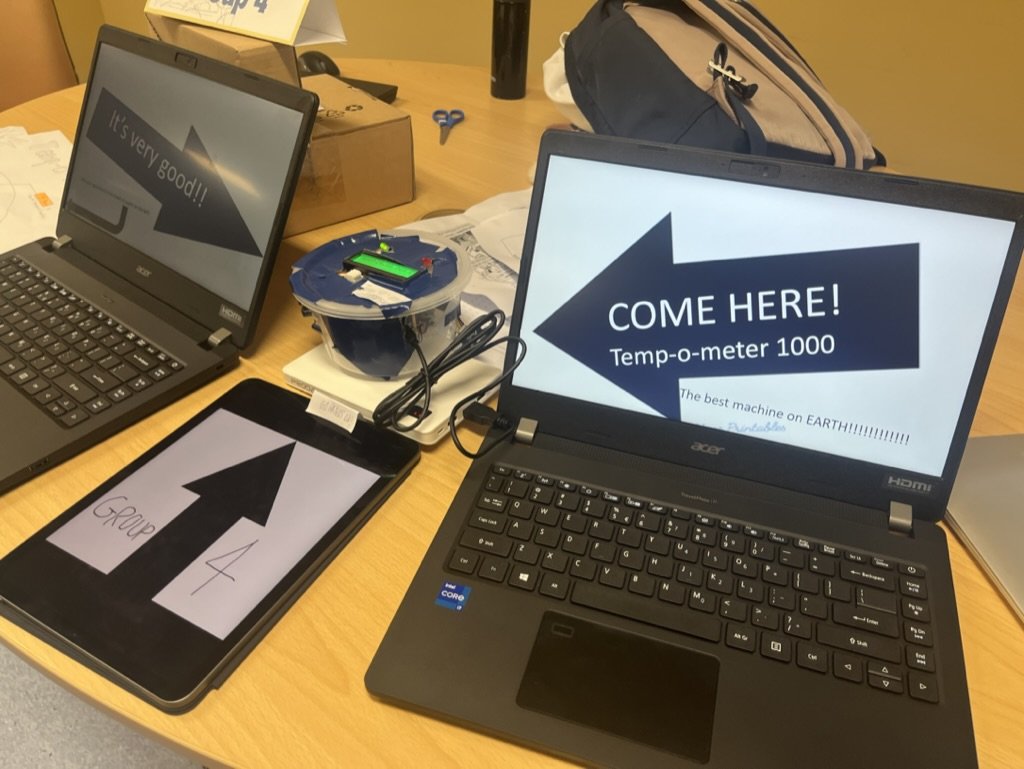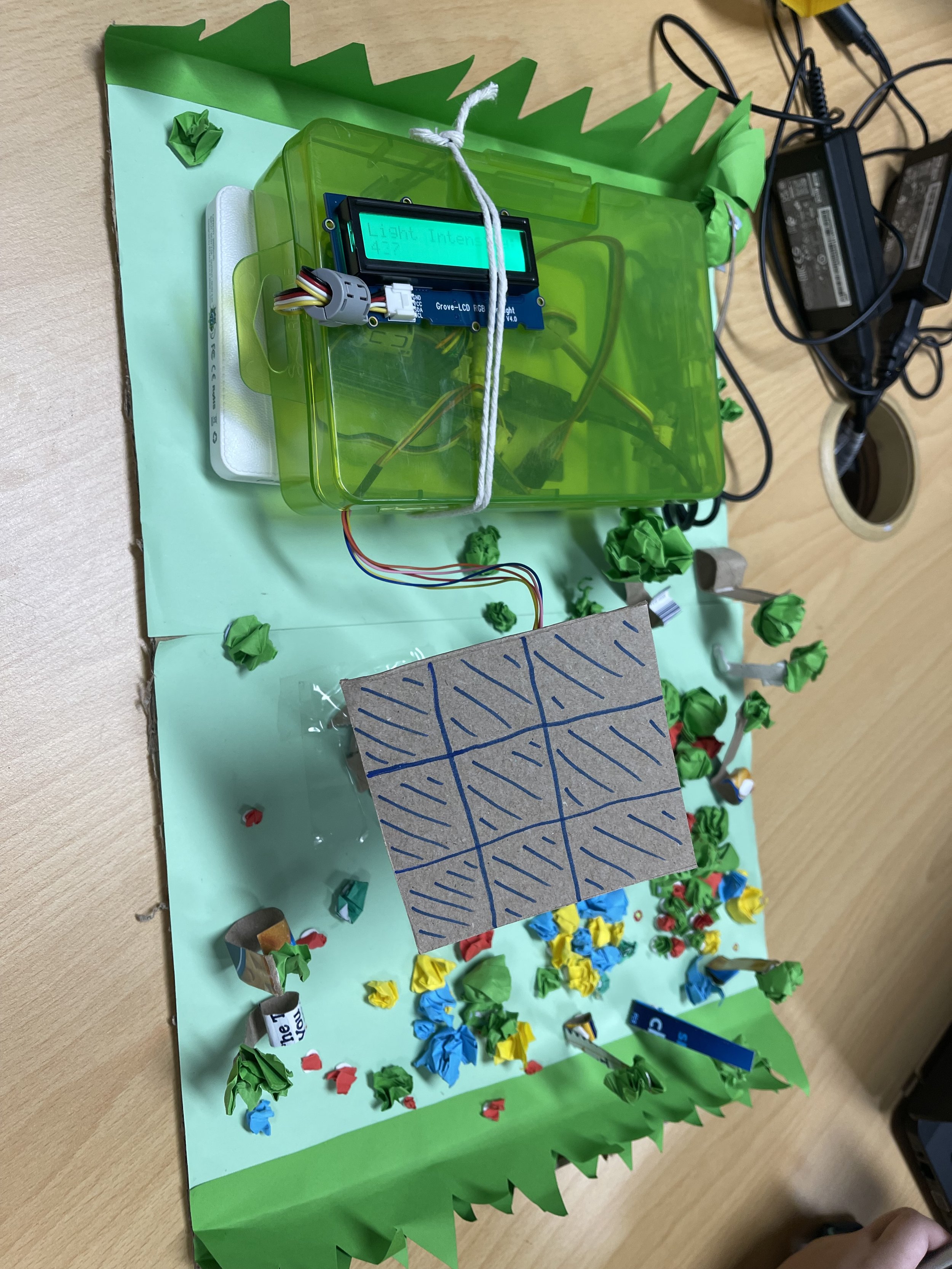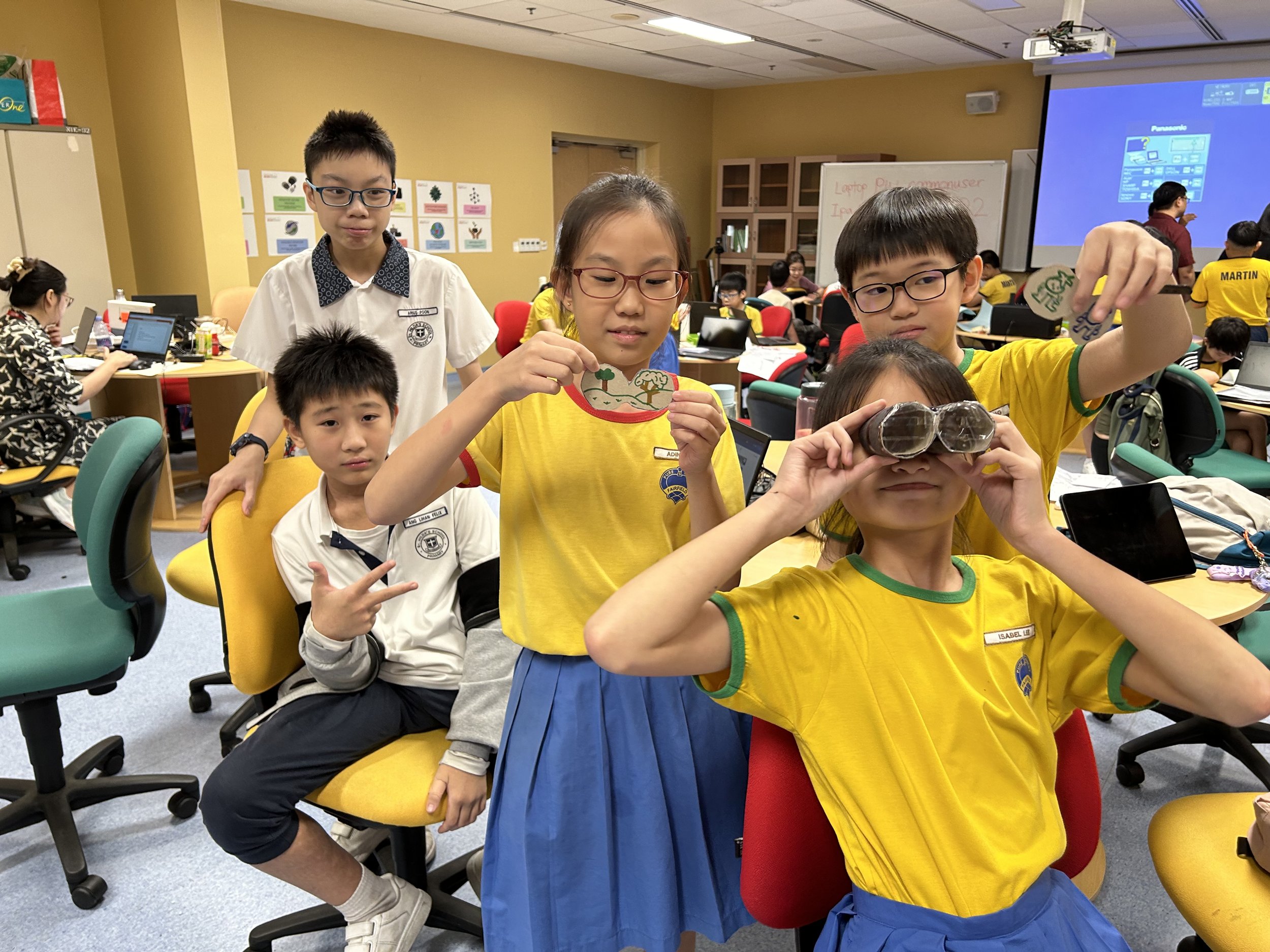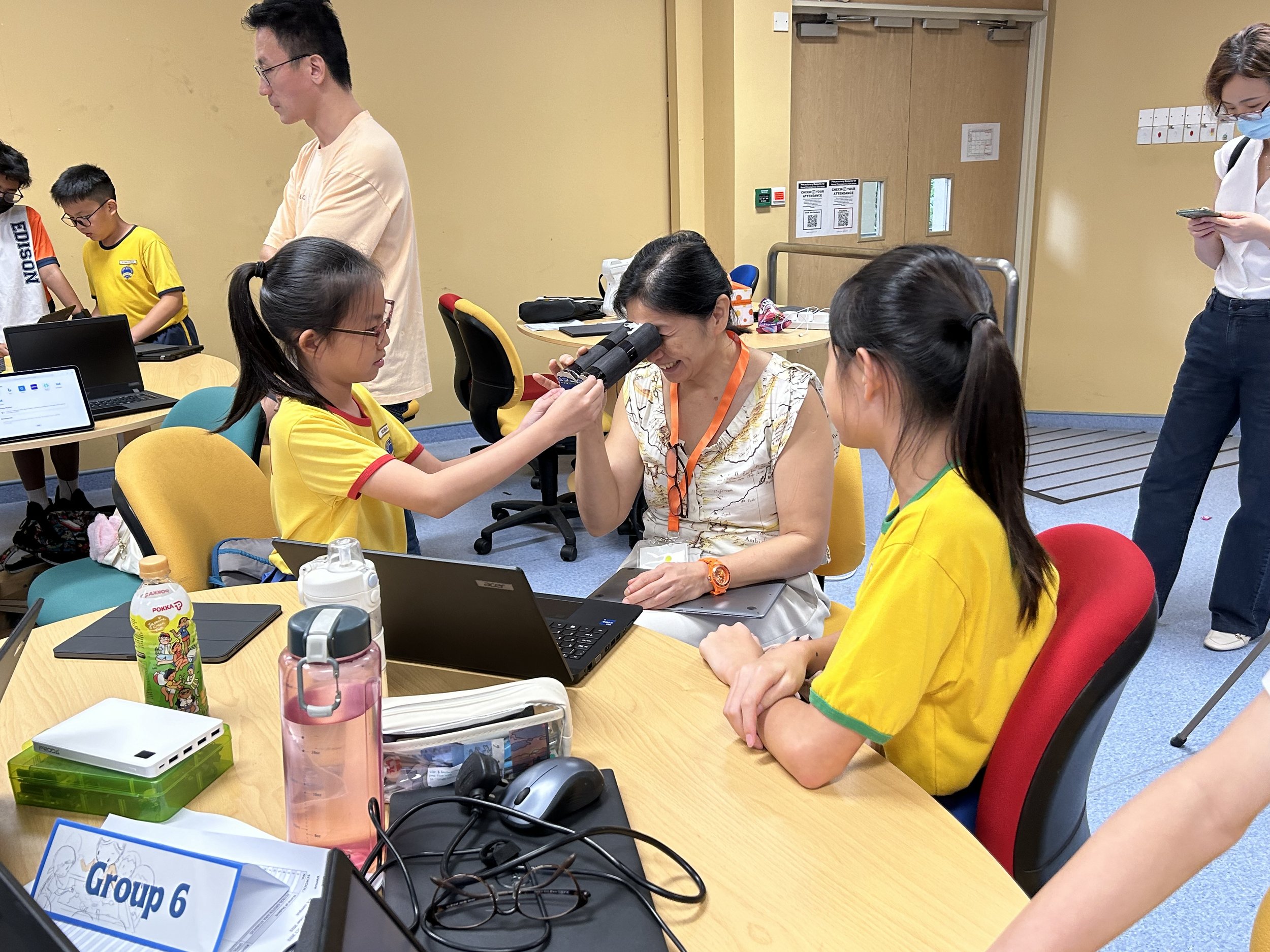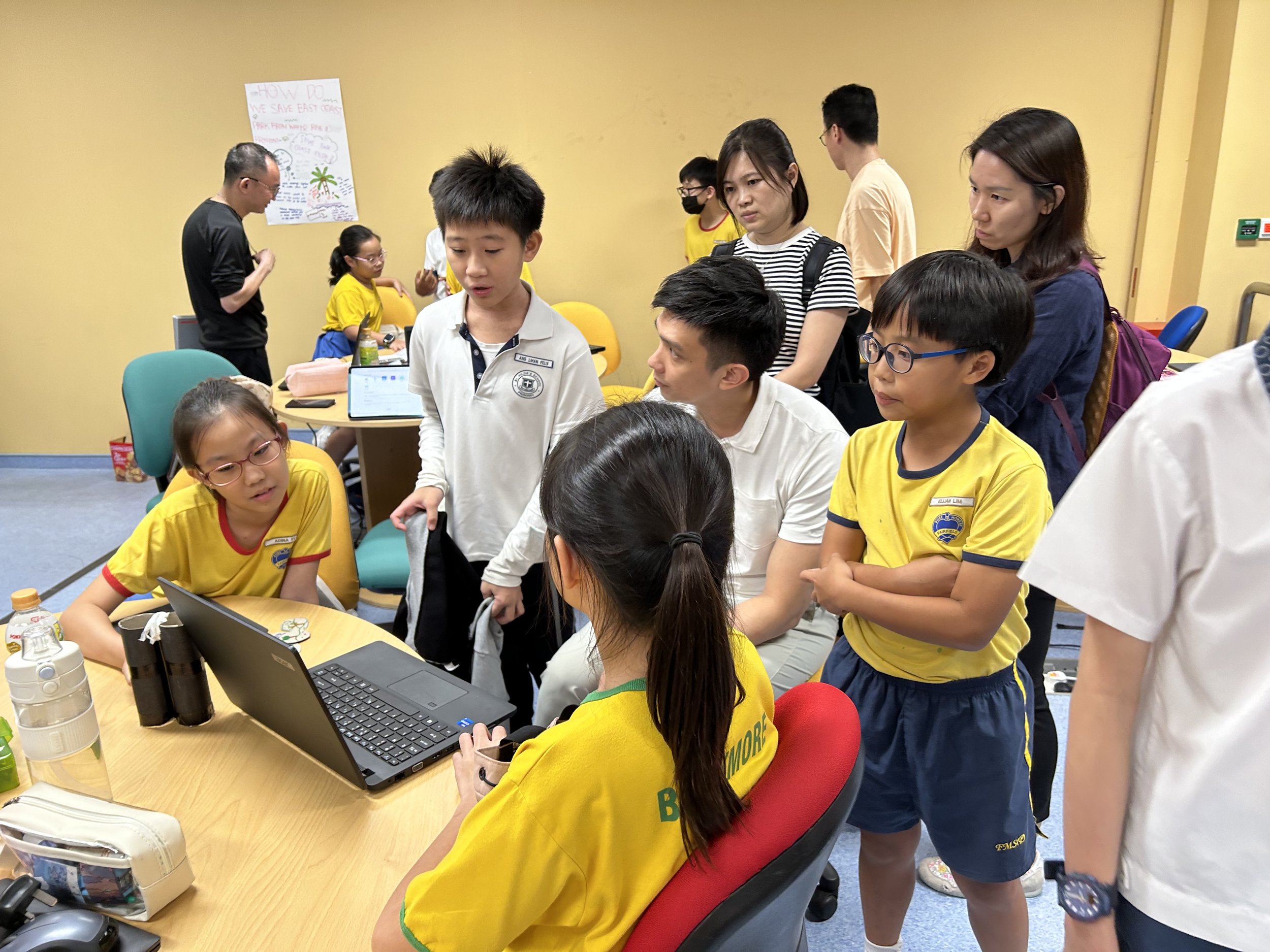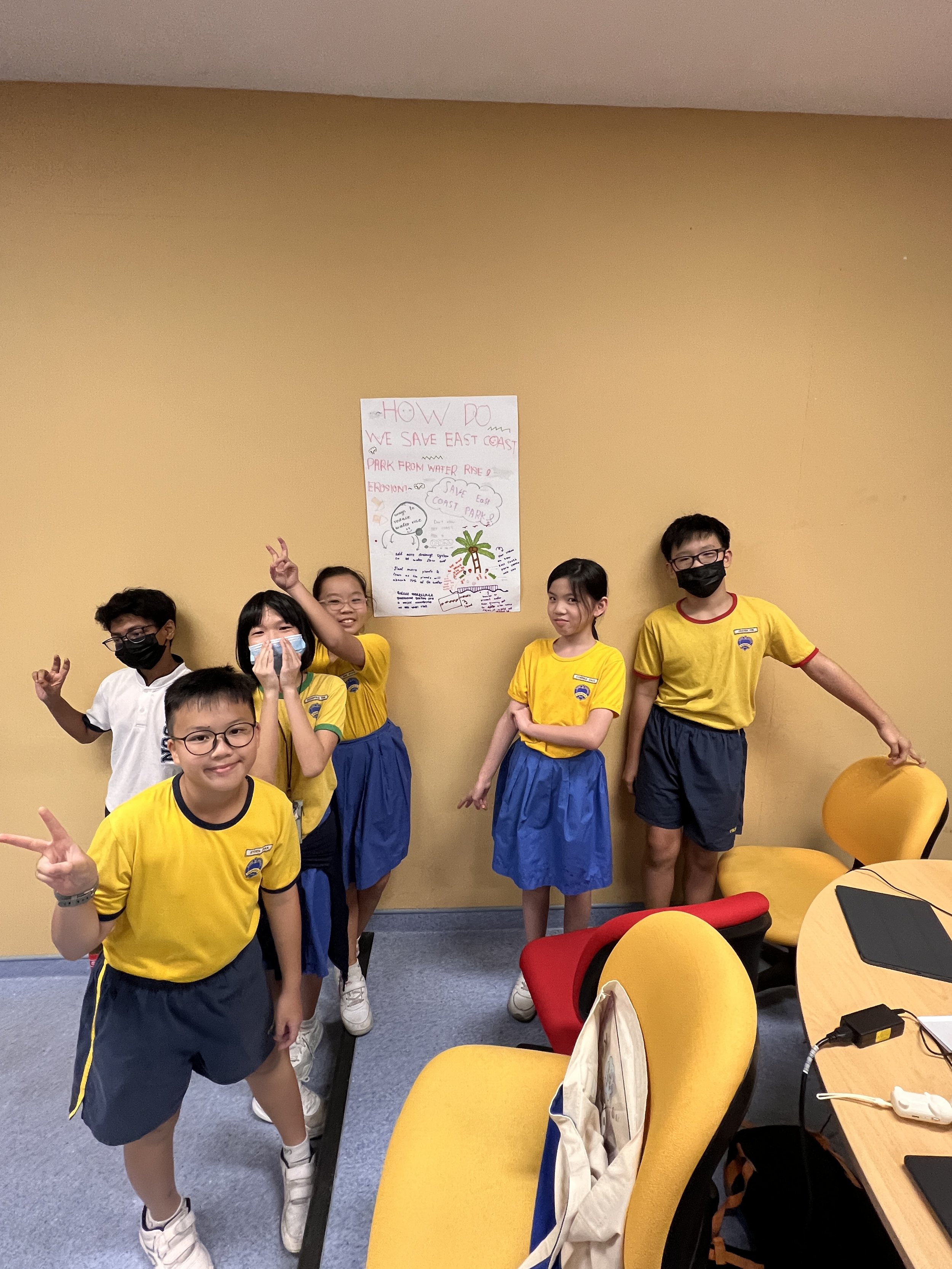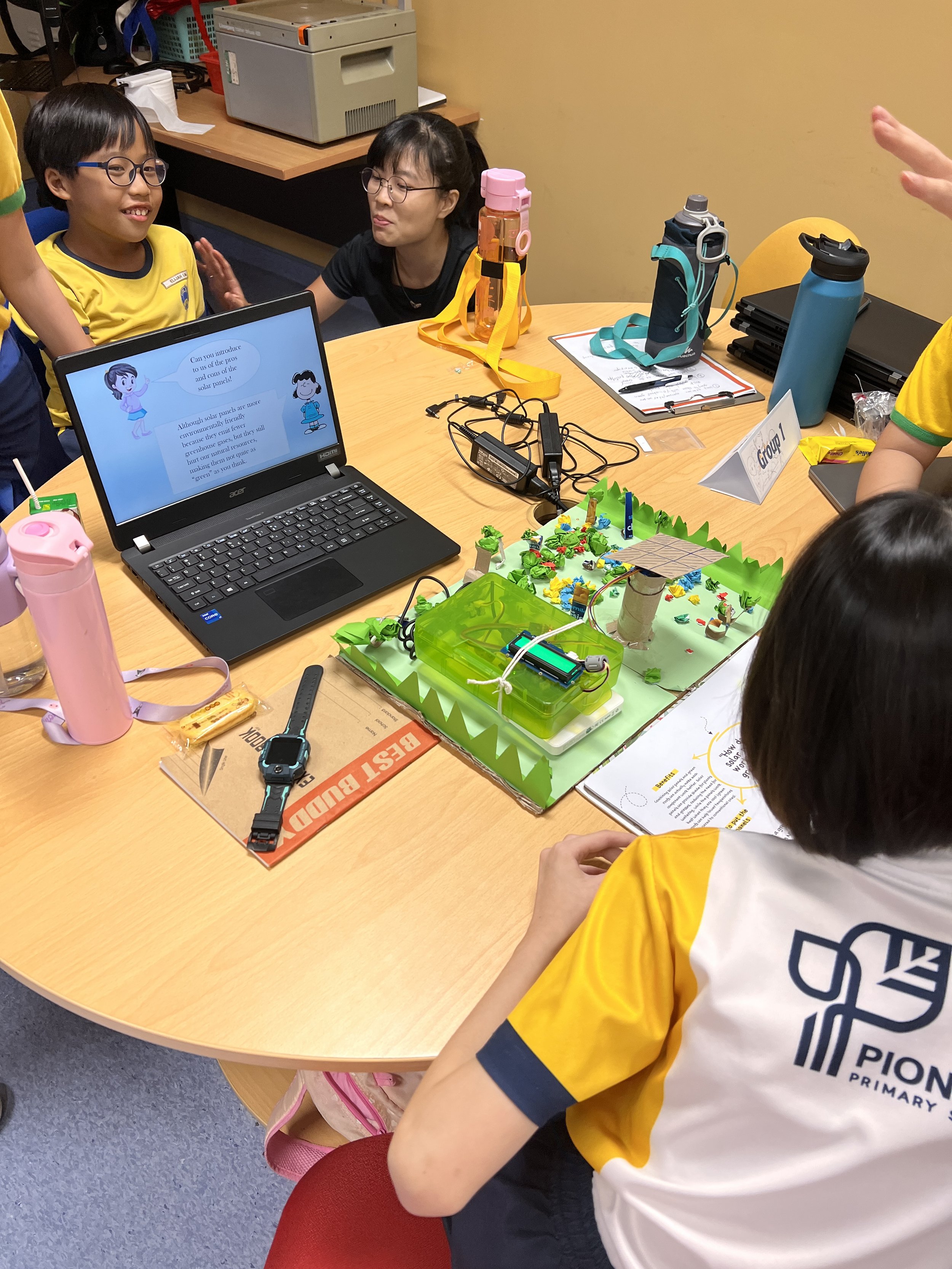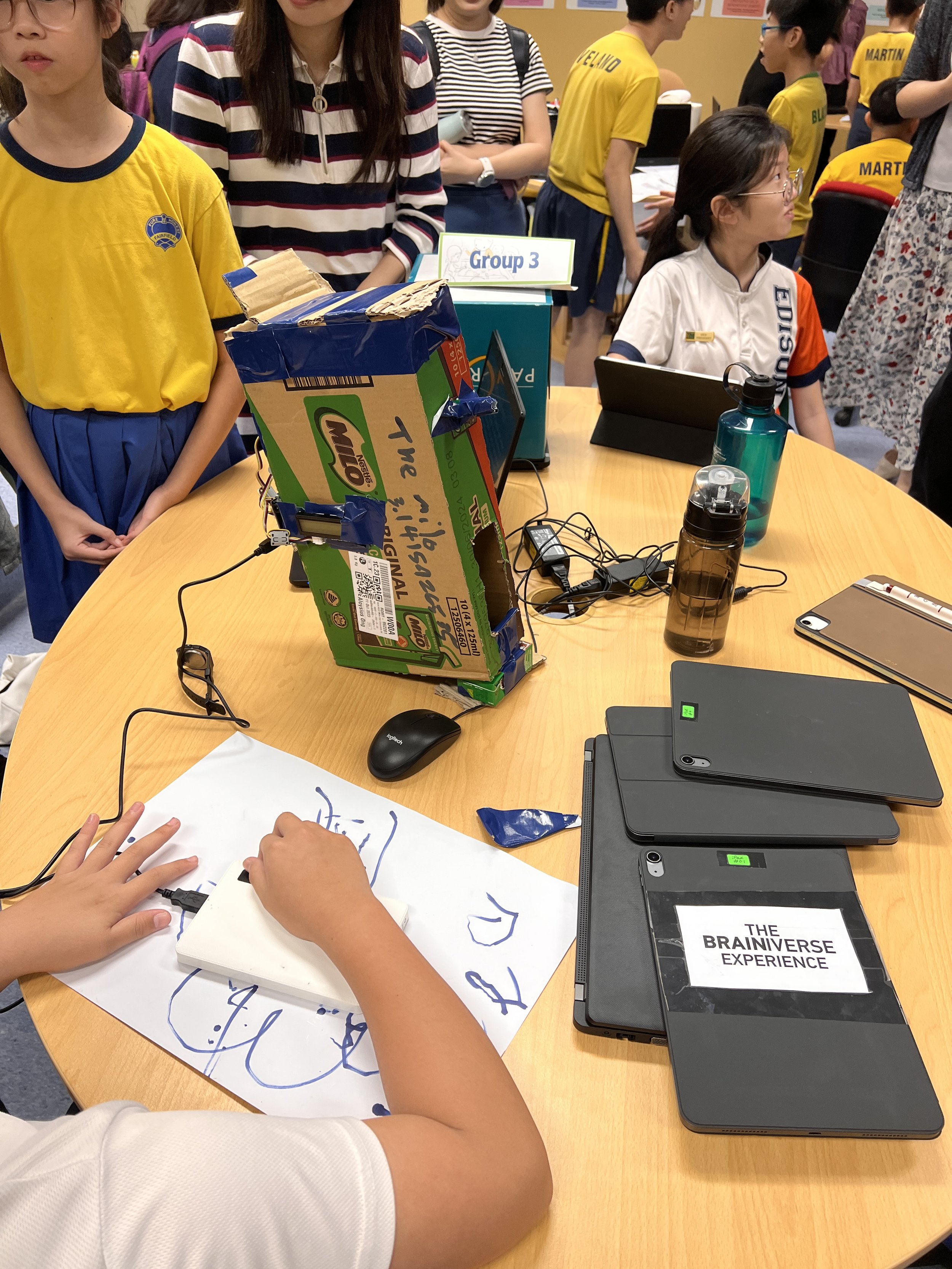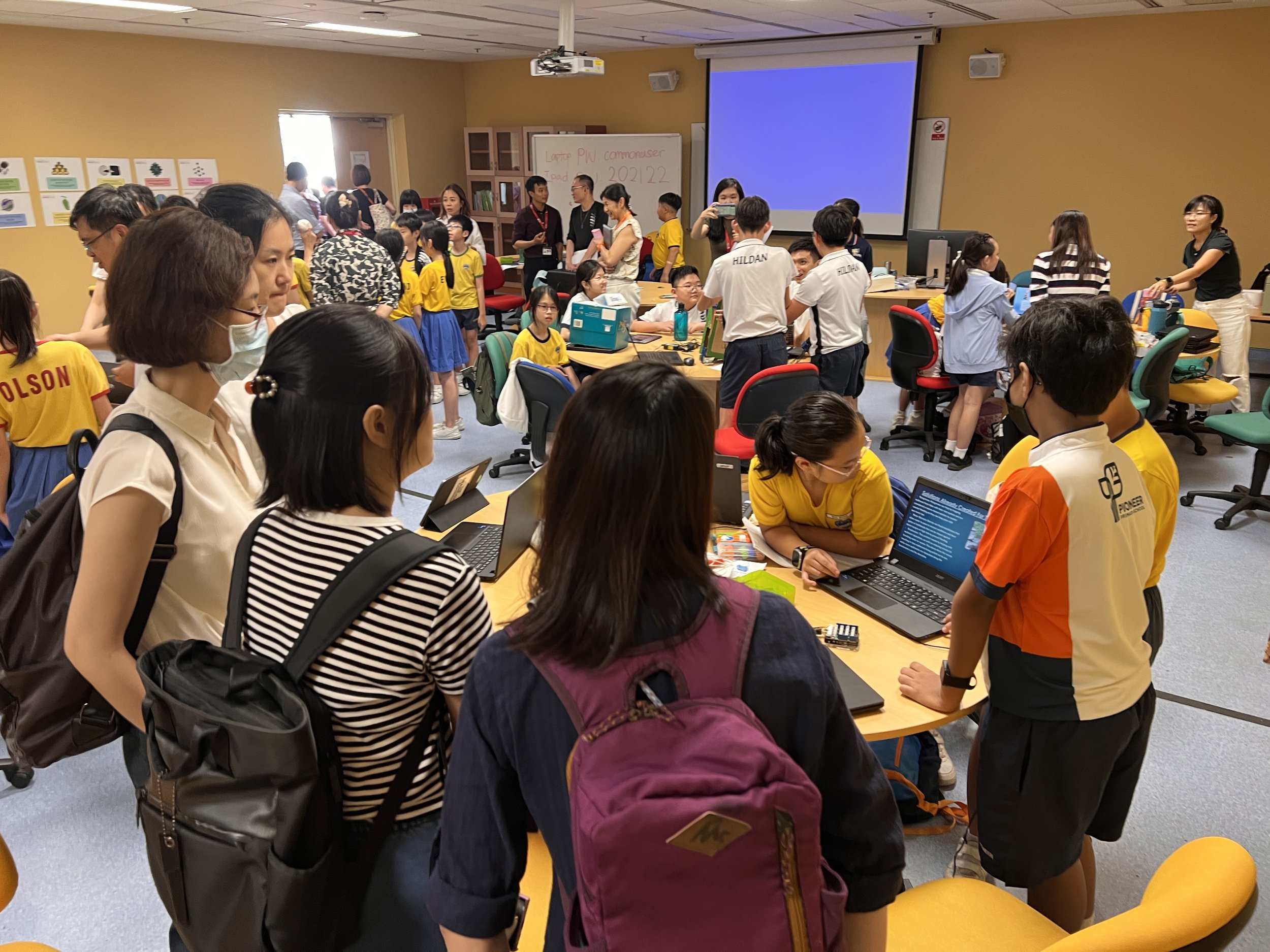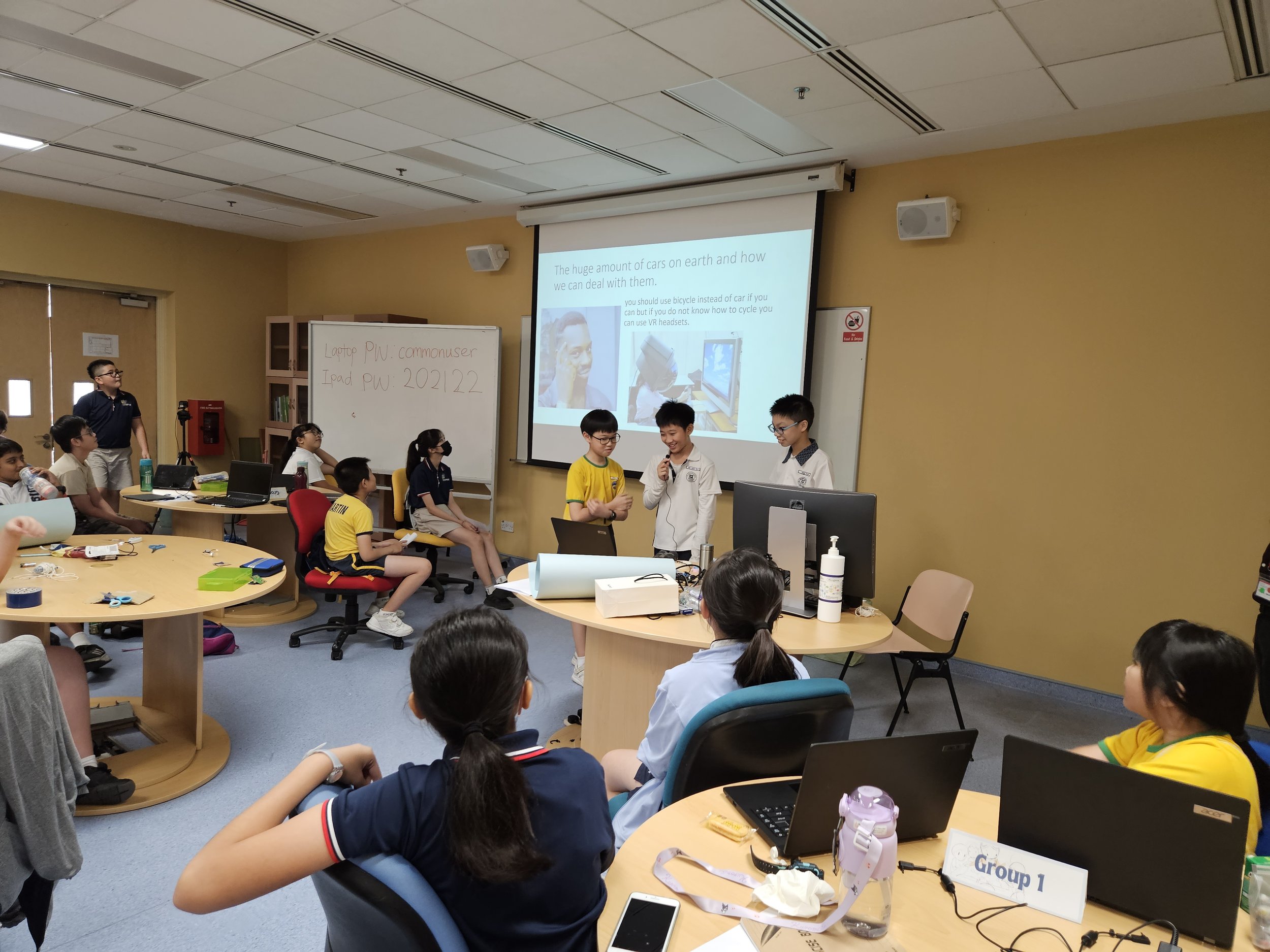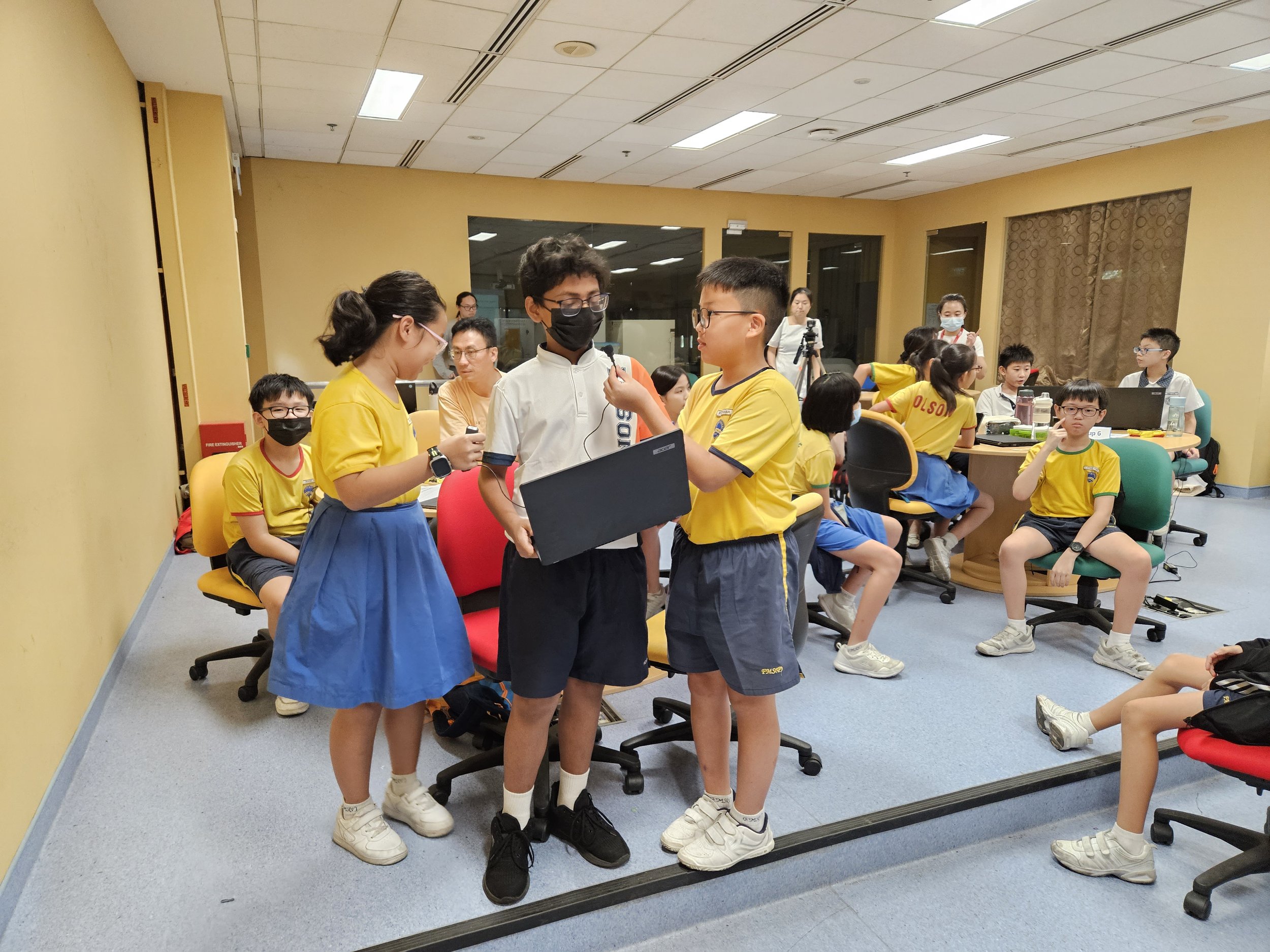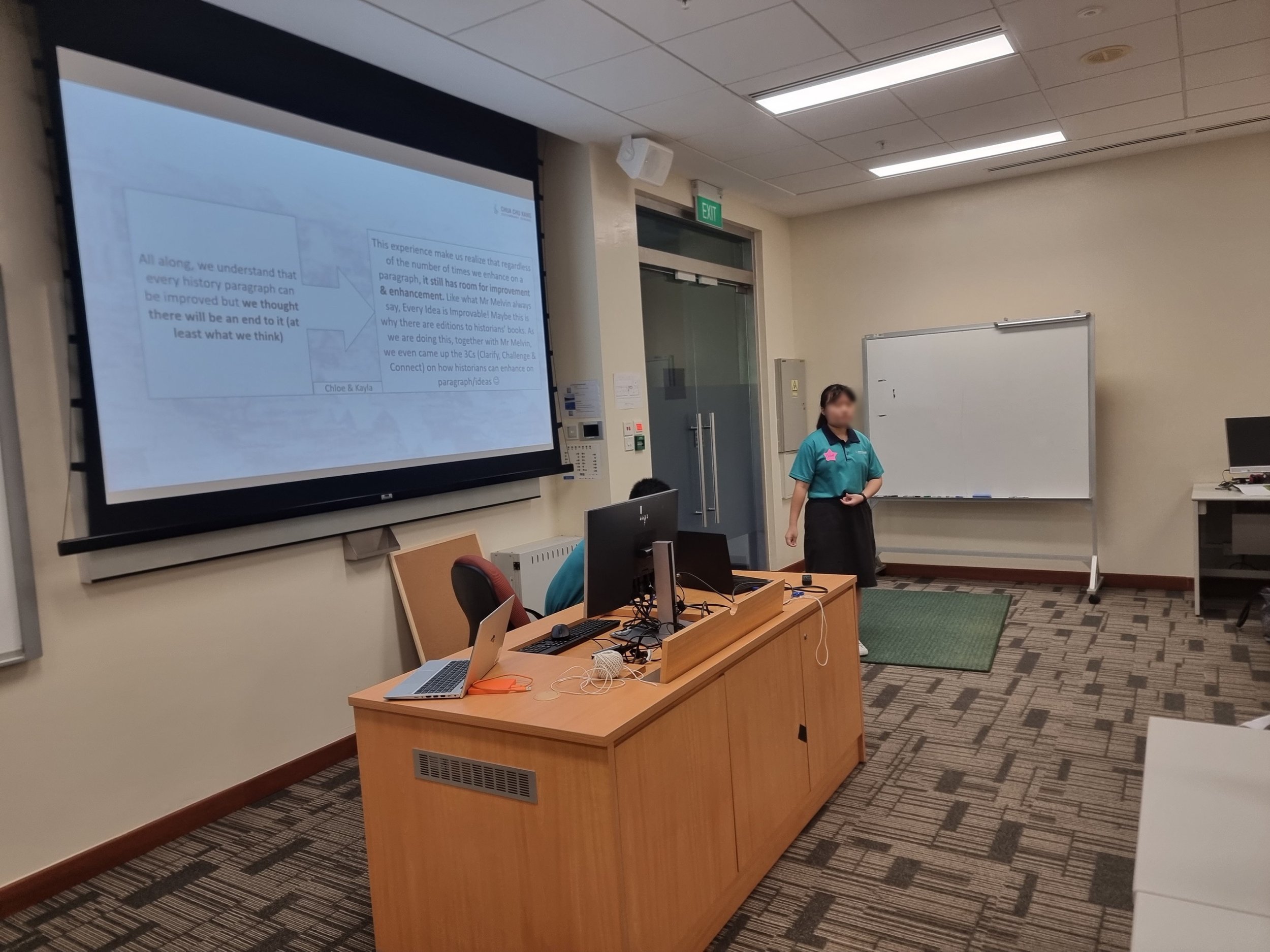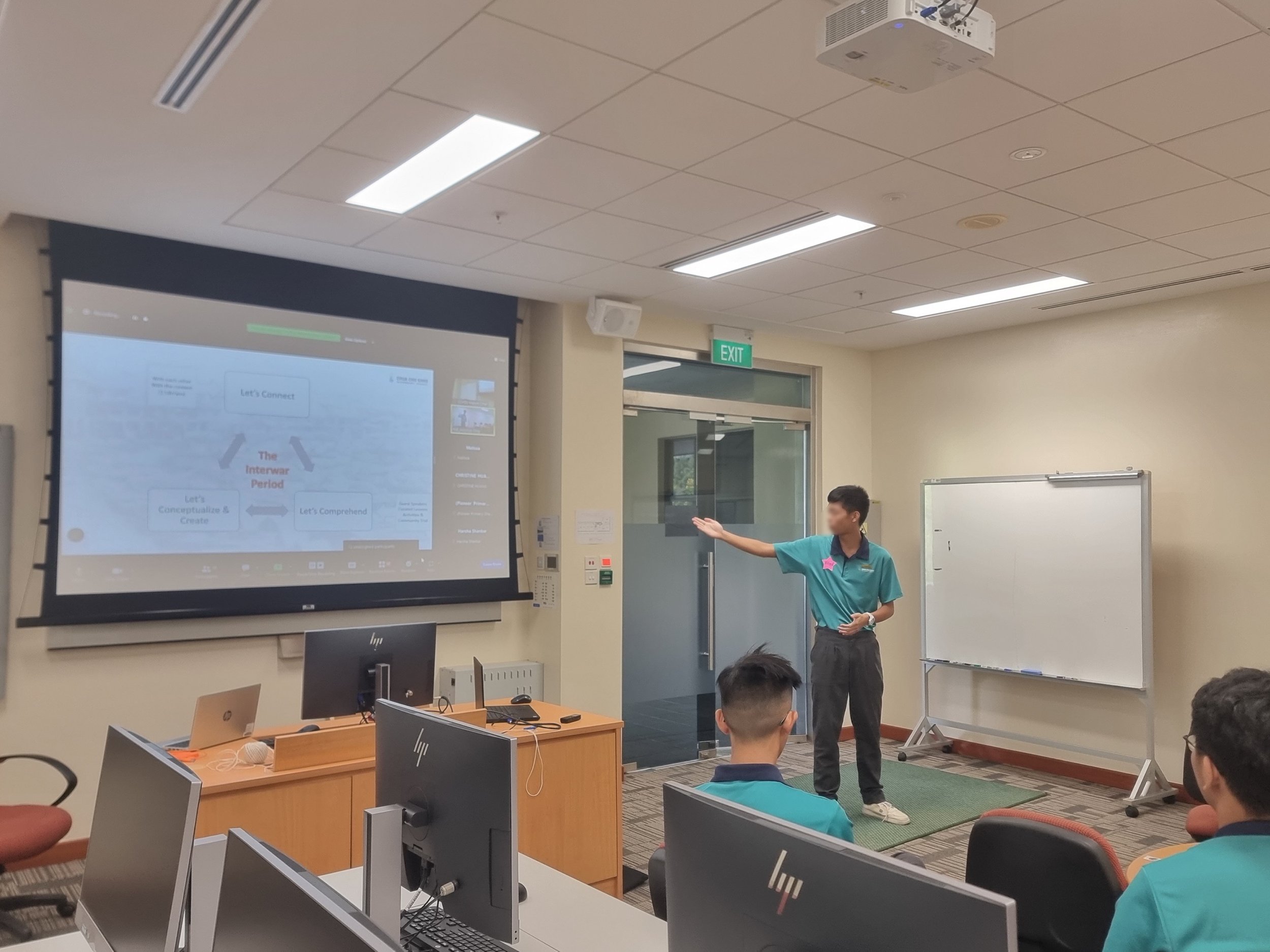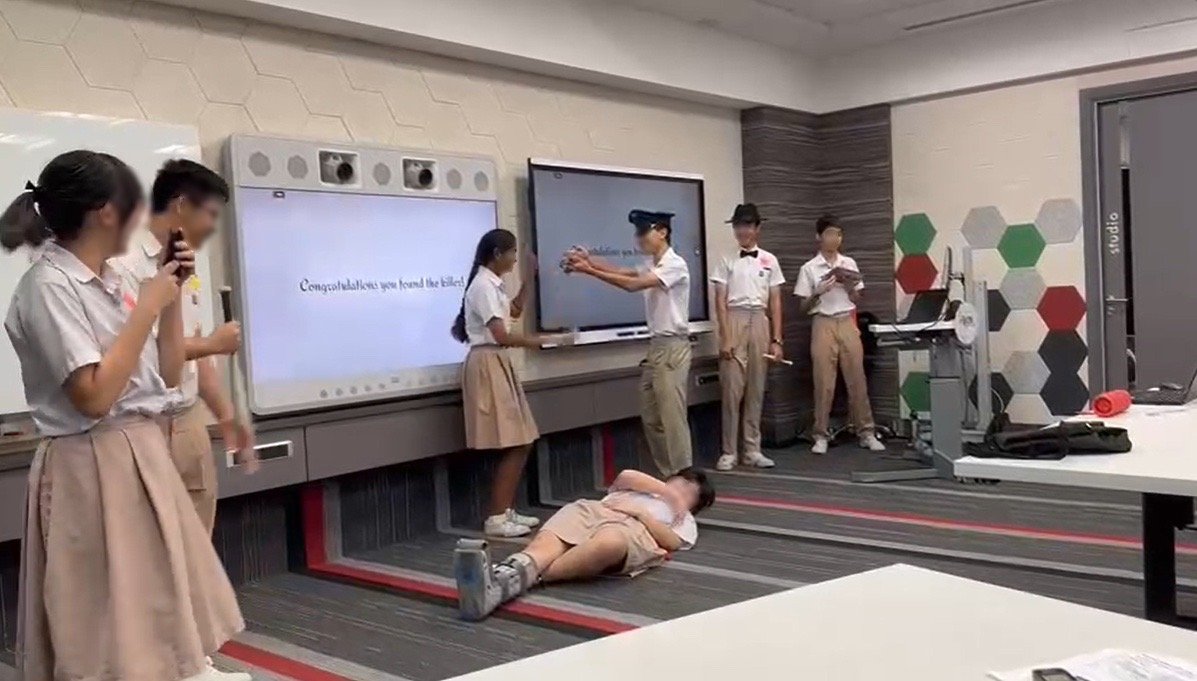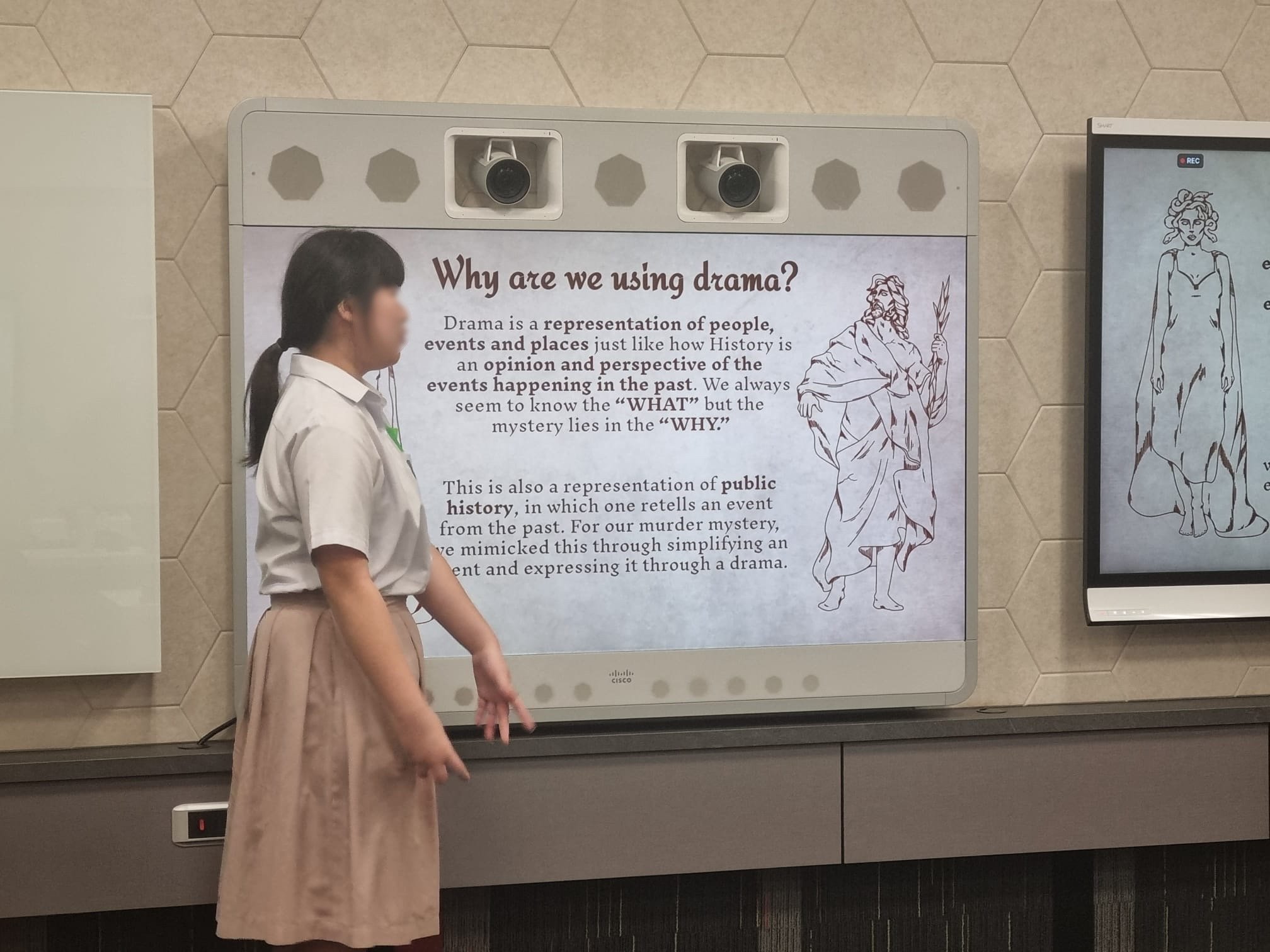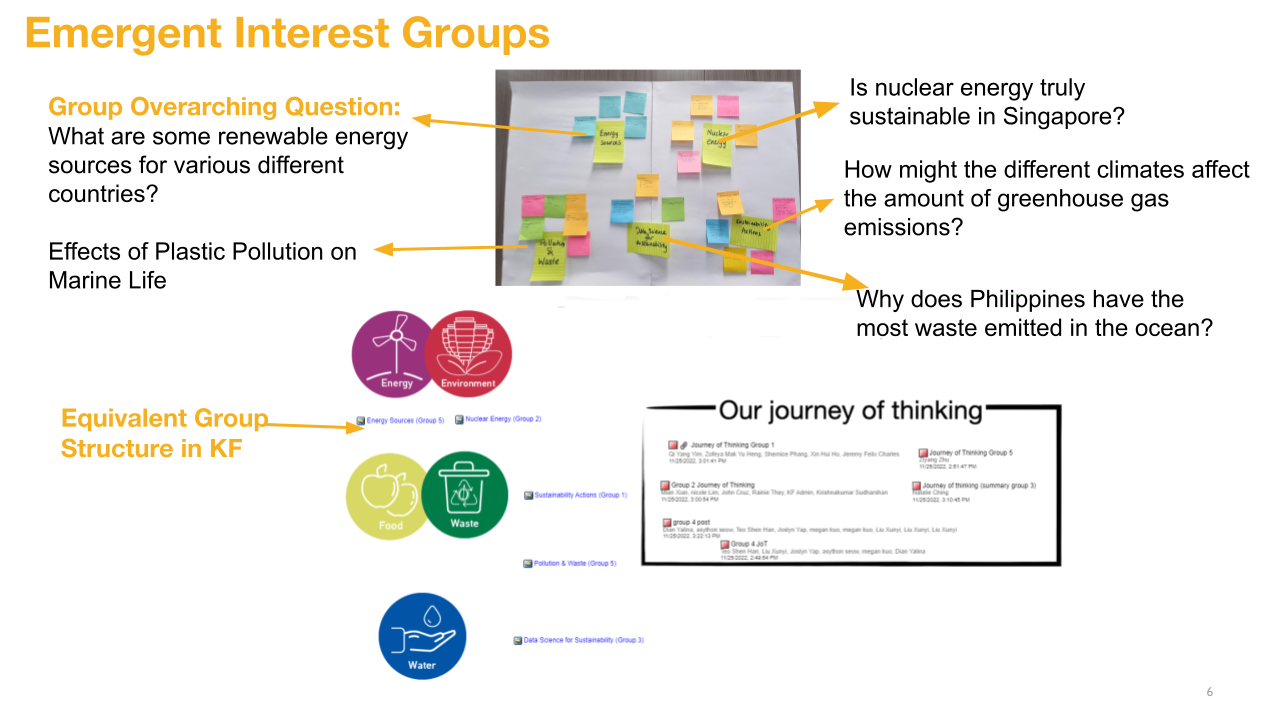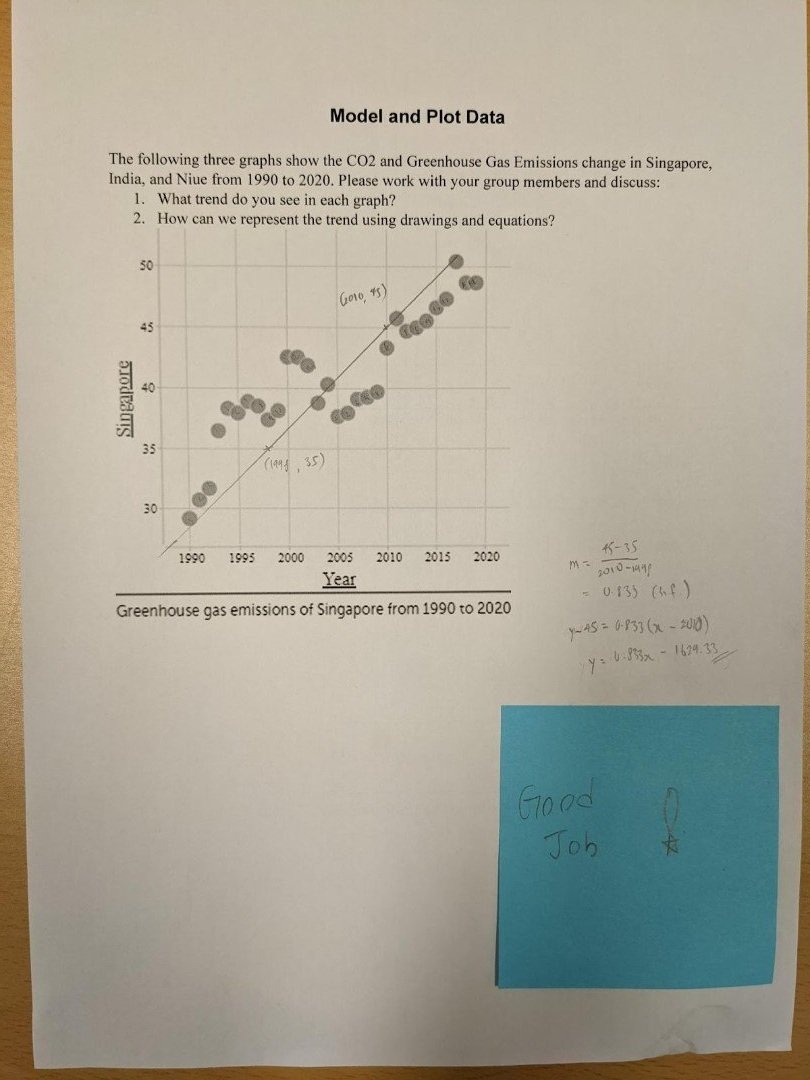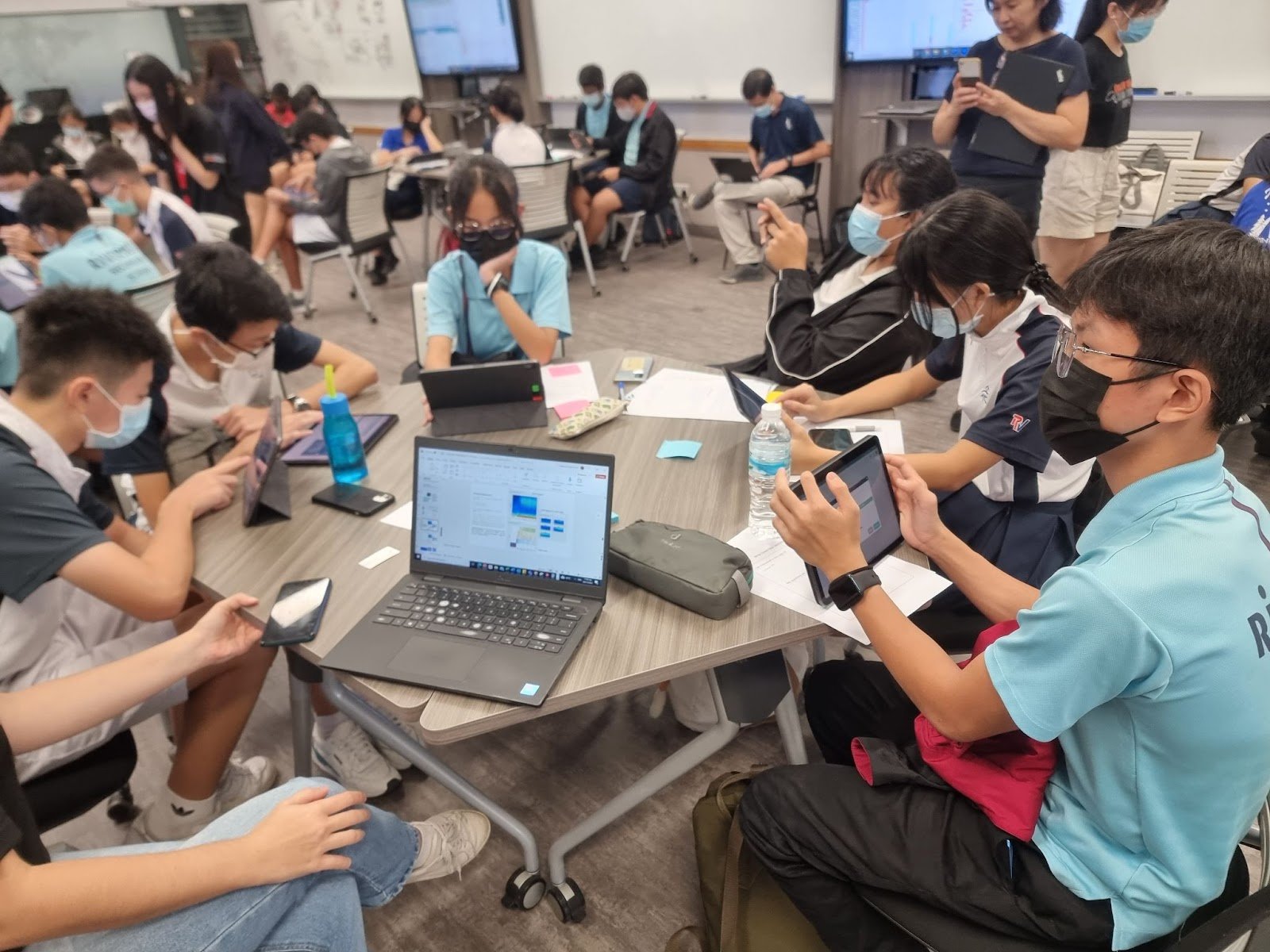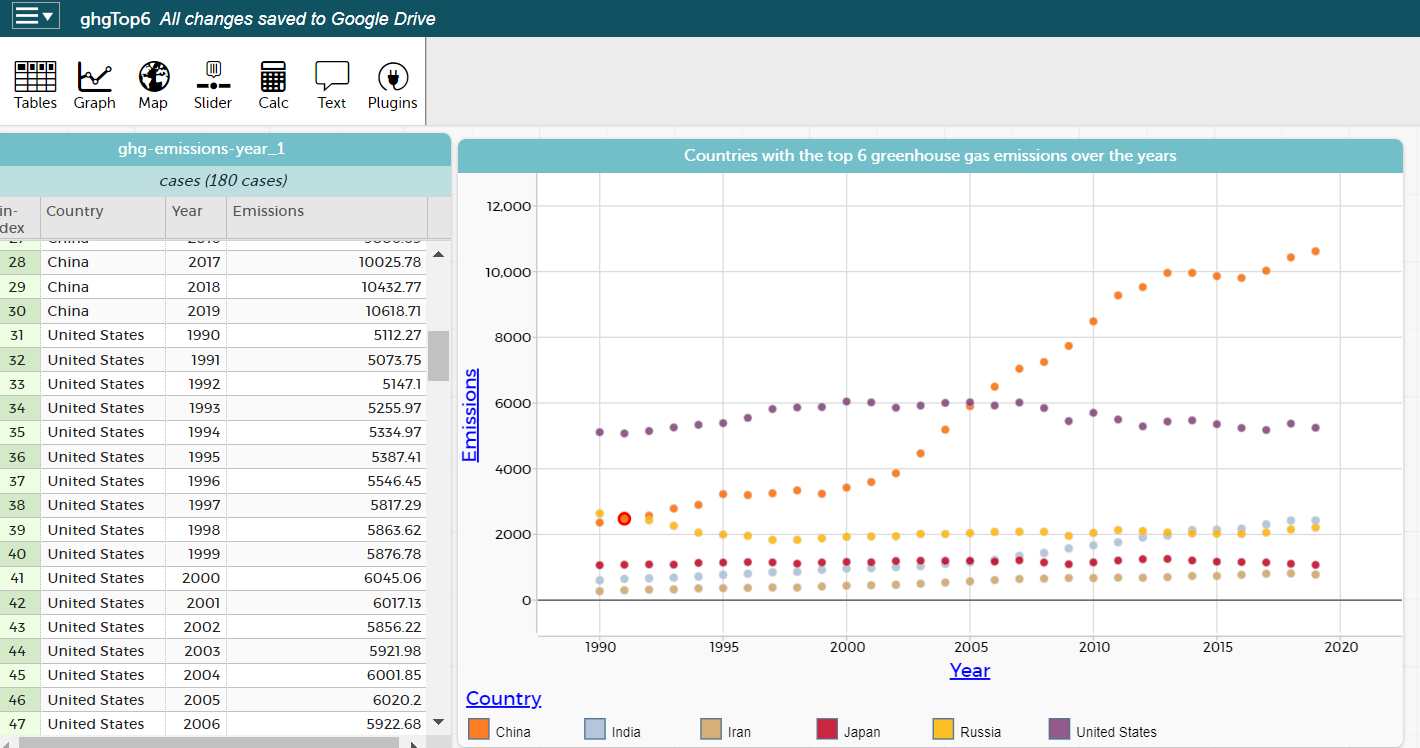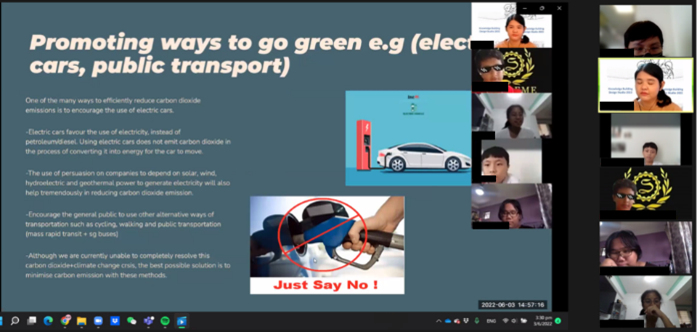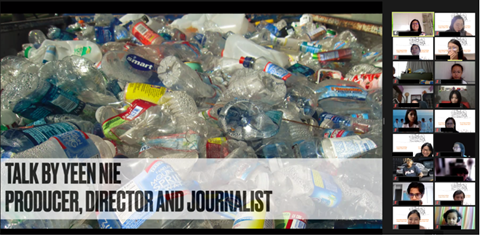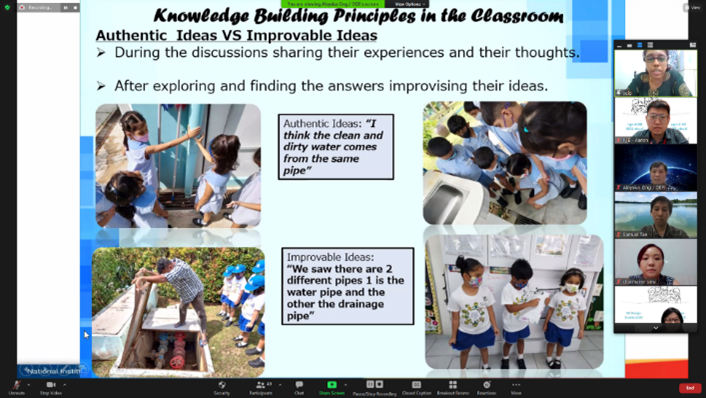Knowledge Building Community Network Learning (KBCNL) @ The POD, National Library Board
We have recently concluded a vibrant session of the Knowledge Building Community Network Learning (KBCNL) at The POD @ National Library. Themed around AI and Learning Analytics in Education, the event brought together more than 80 educators and researchers committed to deepening pedagogical practices through the lens of Knowledge Building (KB) principles. The event started with Dr Teo Chew Lee’s brief introduction of KB and its potential in classroom practices.
The session featured two thought-provoking sharing sessions:
Facilitate Students’ Knowledge Building and Supportive Emotions through Emotion Analytics and Socially Shared Emotion Regulation (by Prof Zhu Gaoxia and Mr Andy Ng)
Leveraging Knowledge Building Principles to Design a Gen AI-Supported Fair Bot and Curriculum for Science and Chinese Language Lessons (by Dr Katherine Yuan, Mr Han Zhijin and Mr Raymond Chan)
Those sharing sessions were guided by KB principles such as Rise Above, Improvable Ideas, Transformative Assessment, and Community Knowledge / Collective Responsibility. Following the sessions, participants engaged in collaborative discussion groups, exploring the question:
“As a community of KB practitioners and researchers, what pedagogical strategies can we co-design that leverage information from emerging technologies to support students’ knowledge building?”
Two focus areas framed these discussions—chatbots for metacognition and emotion analytics—with participants applying the PIC model (Passive, Interactive, Creative) to guide their thinking on technology integration in classroom practice and derive possibilities of creative implementations to using KB to level up their classroom practices.
Key Takeaways
Designing for Creative Use of Technology in the Classroom
Participants moved beyond passive or interactive applications of technology to co-develop strategies that place students in creative, generative roles—positioning them as knowledge builders.
Leveraging Emerging Technologies to Support Metacognition and Emotion-Aware Learning
The discussion groups surfaced practical examples of how tools like chatbots and emotion analytics could cultivate student reflection, regulation, and emotional awareness as part of the learning process.
Co-Designing Knowledge Building Practices Anchored in Collective Responsibility
Through collaborative reflection, participants envisioned pedagogical practices that embraced community knowledge advancement, affirming the importance of collective responsibility in meaningful knowledge creation.
This event marked another step toward growing a sustained community of practice that bridges research and classroom innovation. We look forward to future opportunities to build on these conversations and co-design practices that push the boundaries of learning together.
Knowledge Building Design Studio October 2024
The Knowledge Building Design Studio (KBDS) from October 14th to 16th, 2024, brought together a vibrant community of 25 students with their accompanying teachers from Rosyth Primary, Oasis Primary, St. Hilda's Primary, and Fairfield Methodist Primary. This dynamic, three-day event centered on cultivating a mindset of sustainability.
Day 1 started well with an introduction to the design studio by Dr Teo as the students were sorted into the different groups that was a mix of people from different schools. In order to help them build cohesiveness, the students engaged in a specially curated icebreaker activity was prepared in order to prime and excite the senses, students were given the opportunity to work together to look at some plants and identify the different features and scent.
They then set off for the exploration of Yunnan Gardens as well as the sustainable buildings in NIE like the Hive and Gaia. These man-made constructions embodied the “City in Nature” theme, serving as a living model of sustainable urban design. This excursion provided students with both inspiration and an immersive sensory experience of what it means to live with nature. Equipped with weather trackers, the students also gathered data from the natural environment, an exercise that helped them realize the significance of data-driven decisions in order to identify and tackle real-world challenges.
A metacognitive talk was then conducted by Dr Katherine when the students returned from the excursion in order to help the students consolidate their learning and identify their authentic sustainability issue that the group would like to find a solution to.
Day 2 took the form of a collaborative think tank, where the students from different schools united in their groups to brainstorm, ideate, and share perspectives on sustainable solutions. An important segment in the early part of the day was also the engagement with the international Knowledge Building Community and listened to a sharing by Amanda, a student in the University of Pennsylvania on the affordances of DataX. The students also had the invaluable opportunity to learn from expert insights, with Professor Bodong from the University of Pennsylvania and Professor Gaoxia from NIE, offering advice and sparking new ideas for effective problem-solving strategies. This day reinforced the importance of design mode thinking and the sharing of knowledge as critical components of sustainable solutions.
On Day 3, the students completed their designing of their group artefacts and refined their solutions, transforming their ideas into tangible representations of sustainable problem-solving. This final day also allowed students to proudly present their creations to their peers, teachers, and the broader KBDS learning community, showcasing the remarkable synergy of creativity, collaboration, and commitment.
To end off the day, the students went through a metacognitive talk where they sat in a circle with Dr Katherine and expressed what they have learnt over the three days. The participants expressed that they were not only inspired but have also become equipped with essential tools and a forward-looking perspective to contribute positively to their communities.
As we conclude this year’s KBDS, it is clear that these young thinkers have taken the first steps towards becoming conscientious problem-solvers, ready to foster a sustainable future for their communities and beyond.
Kids' Conference Asia 2024
Promising Ideas, Knowledge Builders, Future Ready
The inaugural Kids' Conference Asia 2024, held on 9th July, marked a milestone for the Knowledge Building community in Singapore. Hosted by the National Institute of Education, Nanyang Technological University, Singapore (NIE NTU, Singapore) in collaboration with Kids’ Conference, the event featured Ms. Beatrice Chong, Deputy Director-General of Education, as the esteemed Guest-of-Honour.




The event commenced with an insightful opening address by Dr. Teo Chew Lee. Dr. Teo delved into the rich history of Knowledge Building efforts in Singapore, providing a comprehensive overview of the progress and achievements in fostering a collaborative and inquiry-based learning environment.
Following Dr. Teo's address, Dr. Stephen Spain, the principal founder of Kids' Conference, joined online to deliver an introduction speech about the conference. Dr. Spain emphasized the importance of the event in providing a platform for students’ voices.
The highlight of the opening ceremony was the inspiring keynote speech by Ms. Beatrice Chong, the Deputy Director-General of Education and the Guest-of-Honour for the event. Ms. Chong's speech resonated deeply with the audience, as she spoke about the importance of cultivating future-ready knowledge builders and the impact of innovative thinking in creating a sustainable future. Her words inspired the young attendees, reinforcing the significance of their contributions to society.
A standout segment of the conference was the student forum hosted by Dr. Katherine. During this forum, several students took the stage to discuss their reflection on their journey of thinking through the Knowledge Building Design Studio in June 2024. They shared how these experiences had profoundly shaped their final sustainability designs. The depth of thought and insight displayed by the students was truly mind-blowing, revealing their nuanced understanding of sustainability and process of their learning. This was followed by a dialogue from two teachers about their takeaways of the forum as well as a short sharing from an alumni of Knowledge Building Design Studio.
Themed "Promising Ideas, Knowledge Builders, Future Ready," the focal point revolved around the showcase of the innovative sustainability ideas of Primary and Secondary school students from the Knowledge Building Design Studios. These young visionaries presented their projects, demonstrating a deep commitment to addressing real-world problems with sustainable solutions. Alongside them was a special feature by the NIE Library team that presented a virtual reality tour of the sustainability aspects in NIE as part of the collaborative design for Knowledge Building Design Studio.
With around 180 enthusiastic participants, from students to teachers as well as principals from the various schools, the conference was not only an intellectual feast but also a lively, carnival-like event. Attendees engaged in activities like the Earthquake Challenge, the Sustainability Challenge and brain-based games that complemented the student exhibitions, adding an element of fun and interactive learning to the proceedings. Participants also collected stamps from each booth and activity that was used to exchange for the different treats. The vibrant atmosphere underscored the joy and excitement of the participants, making the event a memorable experience for all.
The event concluded with a ceremony recognizing the efforts and achievements of the participating students. Each group that presented at the conference received e-certificates and a framed poster of their work, honoring their valid ideas and contributions to sustainable solutions. This gesture celebrated their hard work and innovation, providing them with a lasting memento of their journey.
Kids' Conference Asia 2024 served as a celebration of the students' journey in exploring their interests and potential in sustainability. It highlighted their role as future-ready knowledge builders, capable of inspiring their peers and the wider community. This inaugural event emphasized the importance of nurturing young talent in the quest for sustainable solutions to global challenges and sets a precedent for this annual event.
Knowledge Building Design Studio June 2024
Introduction
The Knowledge Building Design Studio, held from June 19th to 21st, 2024 has concluded. The event brought together 27 students and teachers from three distinguished secondary schools: Broadrick Secondary, Chua Chu Kang Secondary, and Damai Secondary. This collaborative event aimed to inspire and educate participants through a series of thoughtfully planned activities, emphasizing the integration of nature and sustainability into practical solutions for real world problems.
Day 1 - Yunnan Gardens
On the first day, participants embarked on a walkaround in the Yunnan Gardens. This immersive experience allowed students to witness firsthand how the theme of 'City in Nature' has influenced the garden's design and layout. With the help of specially curated sensory activities and ‘Carelyn’, an AI chatbot, the students were able to identify the different features that makes Yunnan Gardens unique. The serene and meticulously curated environment served as a perfect backdrop to prime students for the task ahead—planning sustainable and nature-inspired solutions.
Day 2 - Brainstorming
The second day was dedicated to brainstorming. Students were divided into diverse groups, fostering an environment of collaborative learning and idea exchange. This phase was crucial as it allowed participants to build on each other's knowledge and insights, promoting a deeper understanding of the issues at hand. Additionally, further research was conducted, enabling students to refine their ideas and develop more robust solutions.
A highlight of the day was a sharing session by Dr. Jack Fogarty on neurofeedback and regulation. Dr. Fogarty's engaging presentation introduced students to the concepts of neurofeedback, a method of training the brain to regulate itself more effectively, and self-regulation techniques. Students had the opportunity to participate in an interactive game that applied these concepts, providing them with a hands-on understanding of how neurofeedback can enhance focus and cognitive control.
Day 3 - Showcase
On the final day, the focus shifted to the completion of artefacts and solutions. Each group worked diligently to bring their ideas to fruition, creating tangible representations of their innovative concepts. The culmination of the event was marked by a vibrant sharing session, where students presented their completed projects to their peers from Hong Kong’s St. Margaret's Co-educational English Secondary & Primary School. The students from Hong Kong also took turns to share their sustainability solutions and ideas. This exchange provided a platform for cross-cultural learning and showcased the diverse perspectives and creative approaches developed during the studio. We were also privileged to have Professor Carol Chan to join us on Zoom to observe the presentations and to interact with the different groups of students.
The Knowledge Building Design Studio was a testament to the power of collaboration and the potential of students’ ideas. The event allowed the time and space for students to explore their interests and in turn gain valuable skills and knowledge about sustainability issues. The three days also fostered a sense of global community and shared purpose. This sets the stage for a platform to share at our next event, Kids’ Conference Asia 2024.
Knowledge Building Design Studio October 2023
Introduction
We are excited to announce the successful conclusion of the 8th cycle of the Knowledge Building Design Studio (KBDS) with the theme 'Sustainability.' This event took place on 16th and 17th October 2023, and it was a unique opportunity for students, teachers, and researchers to explore real-world sustainability challenges.
A total of 35 students from St Hilda’s Primary School, Fairfield Methodist Primary School and Pioneer Primary School came together to refine their knowledge and think about sustainability. Accompanying the students were their teachers, who were actively engaged in their professional development in the Knowledge Building Pedagogy while observing their students' knowledge advancement.
We were also privileged to have Dr Lydia Cao as one of our experts, whose contributions in EarthXDesign enabled the students to reevaluate their initial comprehension of sustainability issues. This conceptual framing served as the cornerstone for delving into the technical aspects of the Internet of Things (IoT), with valuable guidance from Dr Alwyn Lee.
Main Design of the KBDS
CAMPUS TOUR
In their respective groups, students were led on an eco-trail campus tour around NIE, enabling them to explore various sustainability features.
The campus tour included four specifically curated venues namely, the raingarden, a tutorial room, solar panel site, flume table room. Each location represented a feature adopted by NIE over the years of which some had also allowed the campus to clinch the GreenMark Platinum in 2012, 2017, 2022.
EXPERT SHARING EARTHXDESIGN – DR LYDIA CAO
To enhance the students' knowledge acquisition, we had the privilege of having Dr Lydia to share about her work on EarthXDesign via Zoom. Dr Lydia is a Postdoctoral Fellow at the Harvard Graduate School of Education, with her research focusing on the convergence of innovative design, climate consciousness, and the potential of technology.
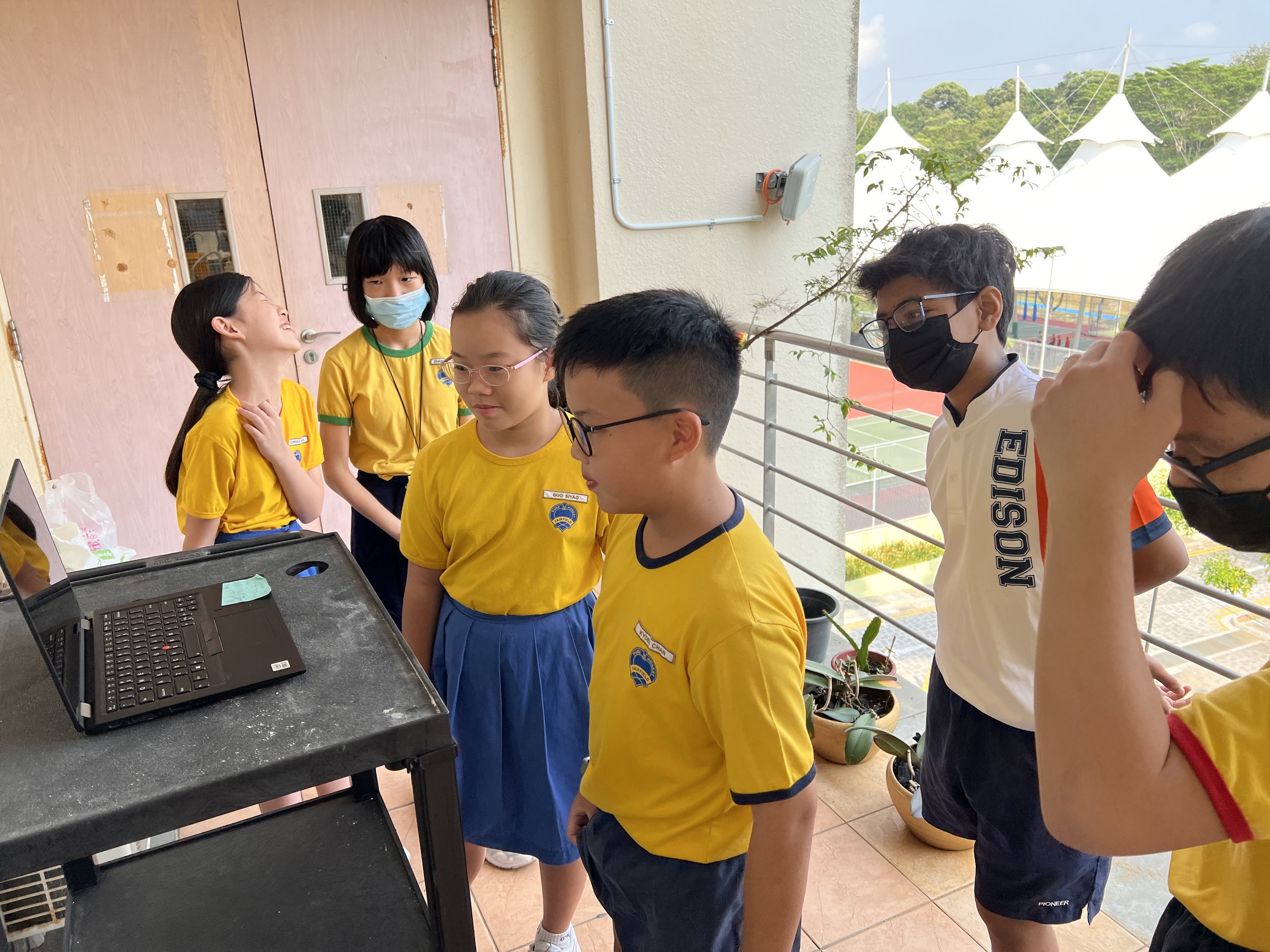
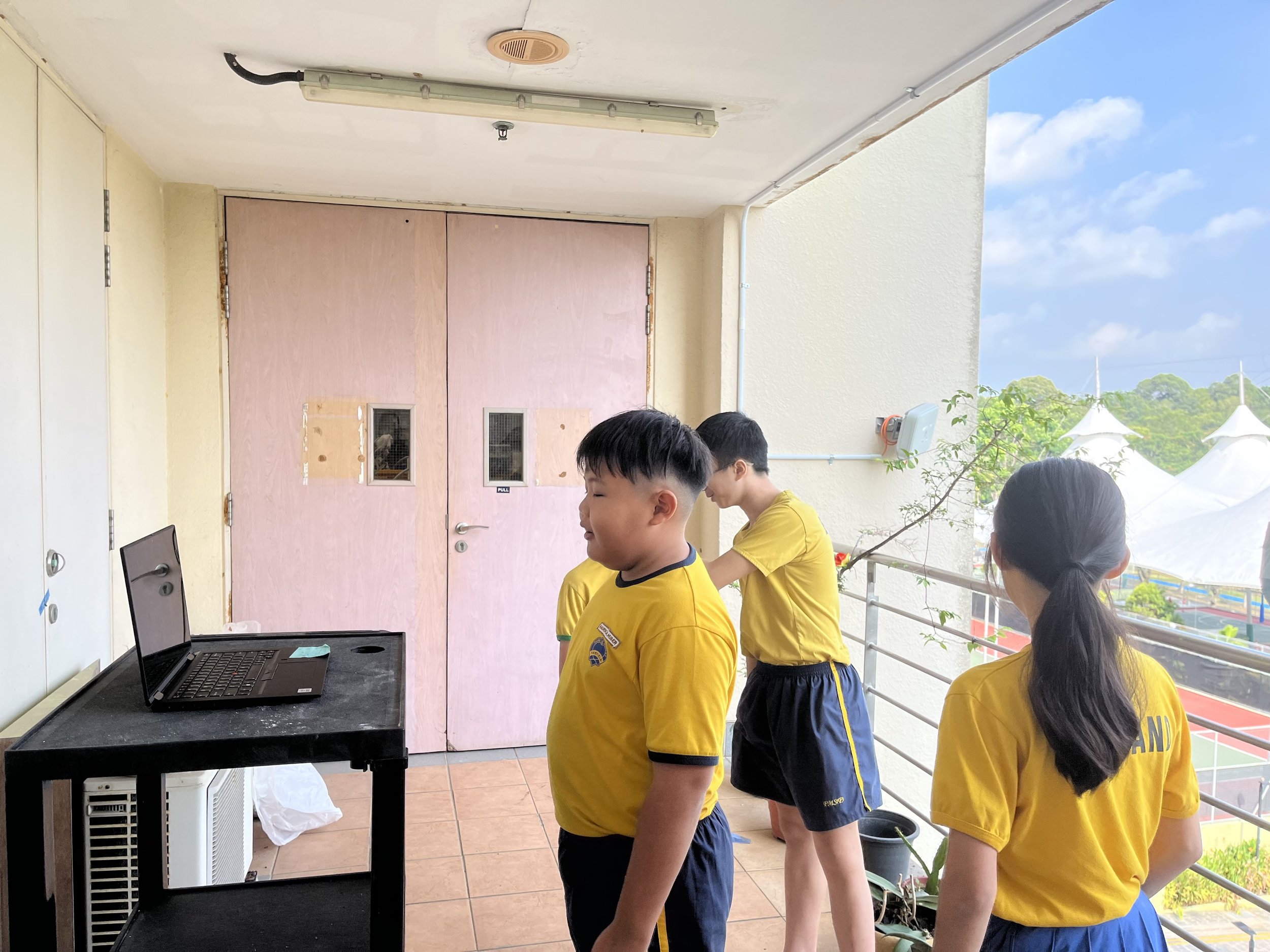
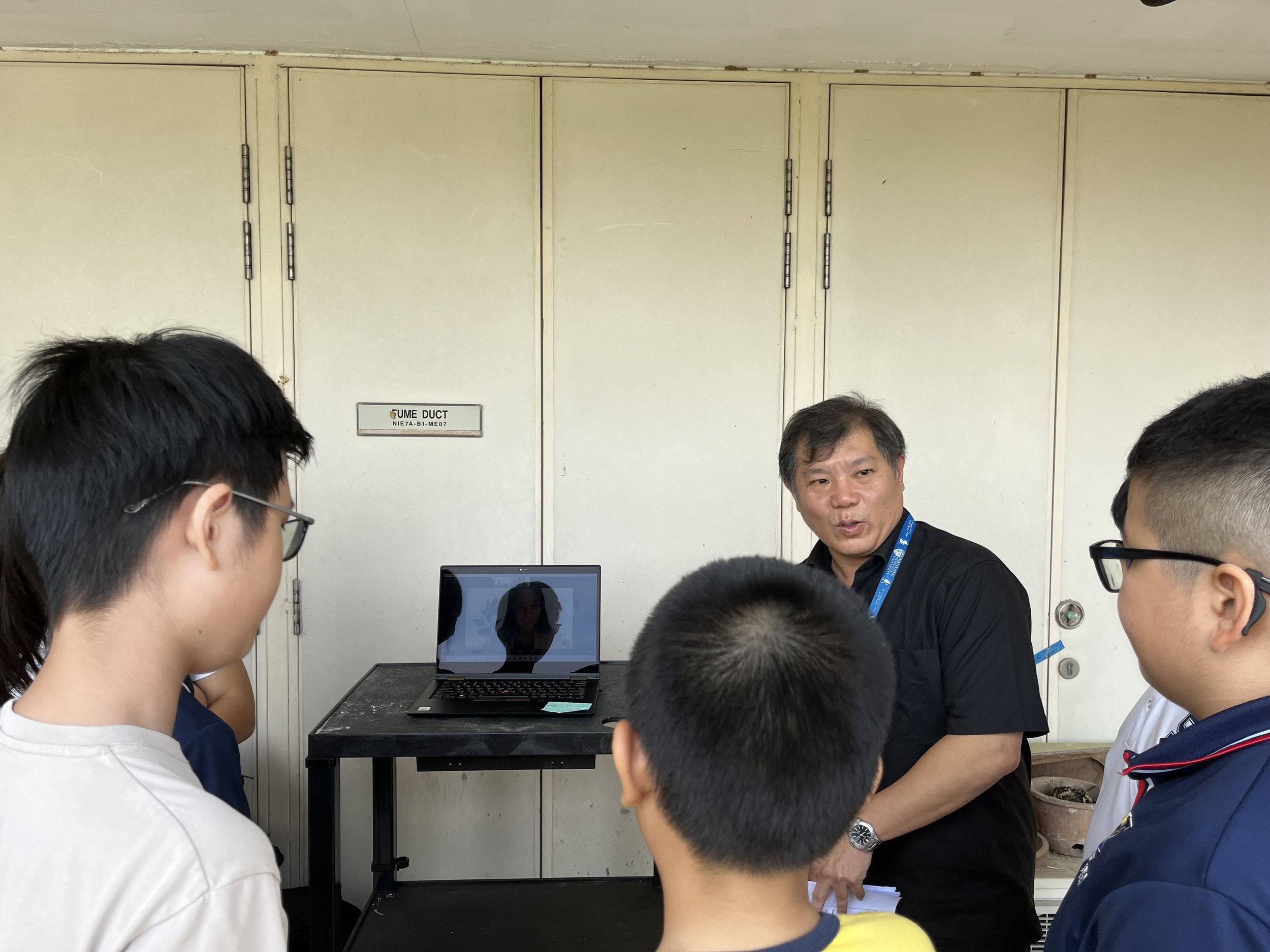
EXPERT SHARING INTERNET OF THINGS – DR ALWYN LEE
For this particular session, we took great pride in having the expertise and support of Dr Alwyn Lee. Dr Lee has over 12 years of experience in both industrial and educational research, with a specific focus on Artificial Intelligence in Education and knowledge building. During his segment, he introduced the Internet of Things (IoT), which refers to a network of interconnected devices and sensors designed for data sharing.
Small Group Sessions
Co-create A Journey of Thinking to Synthesise the Learning Progress
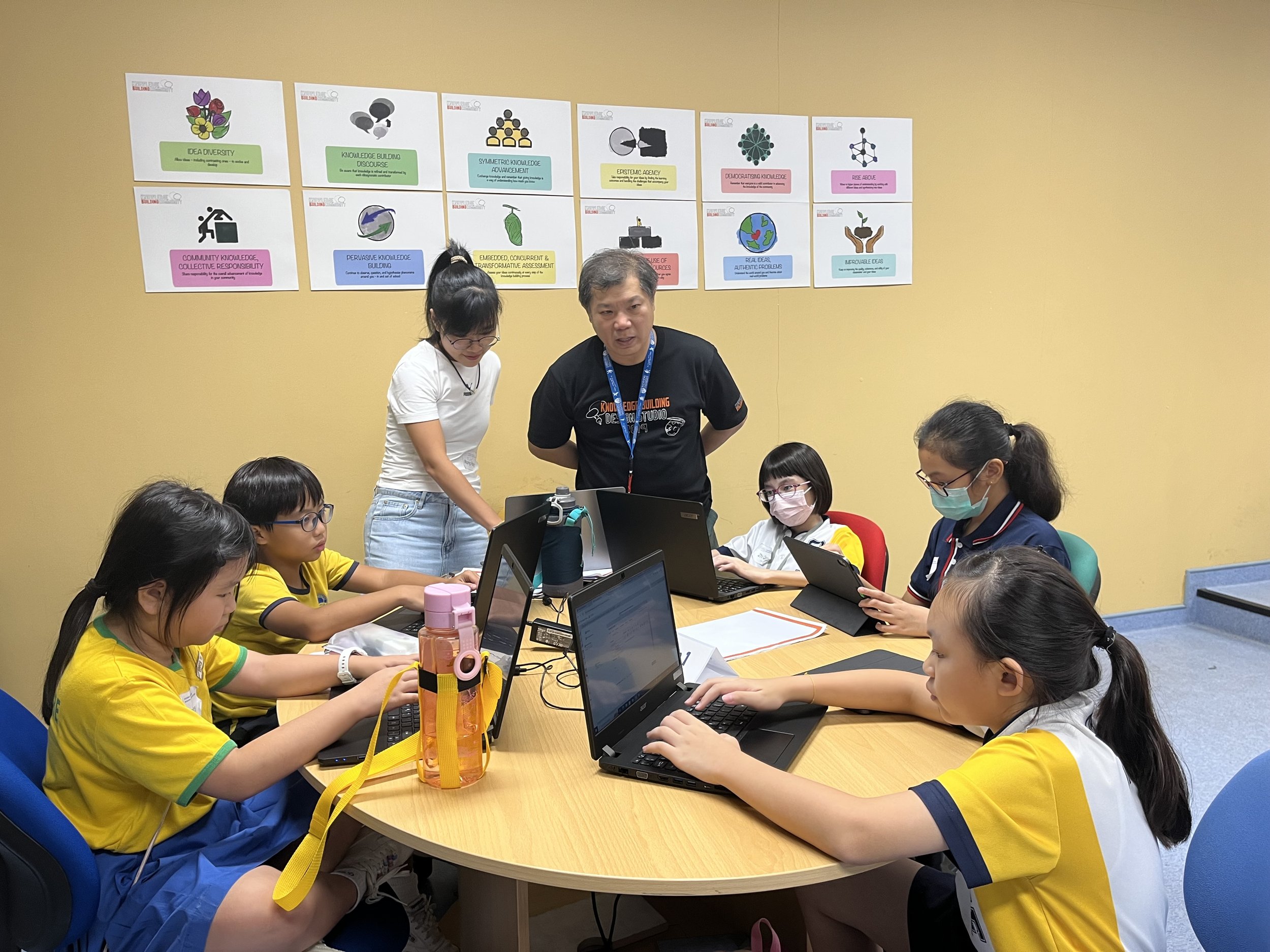
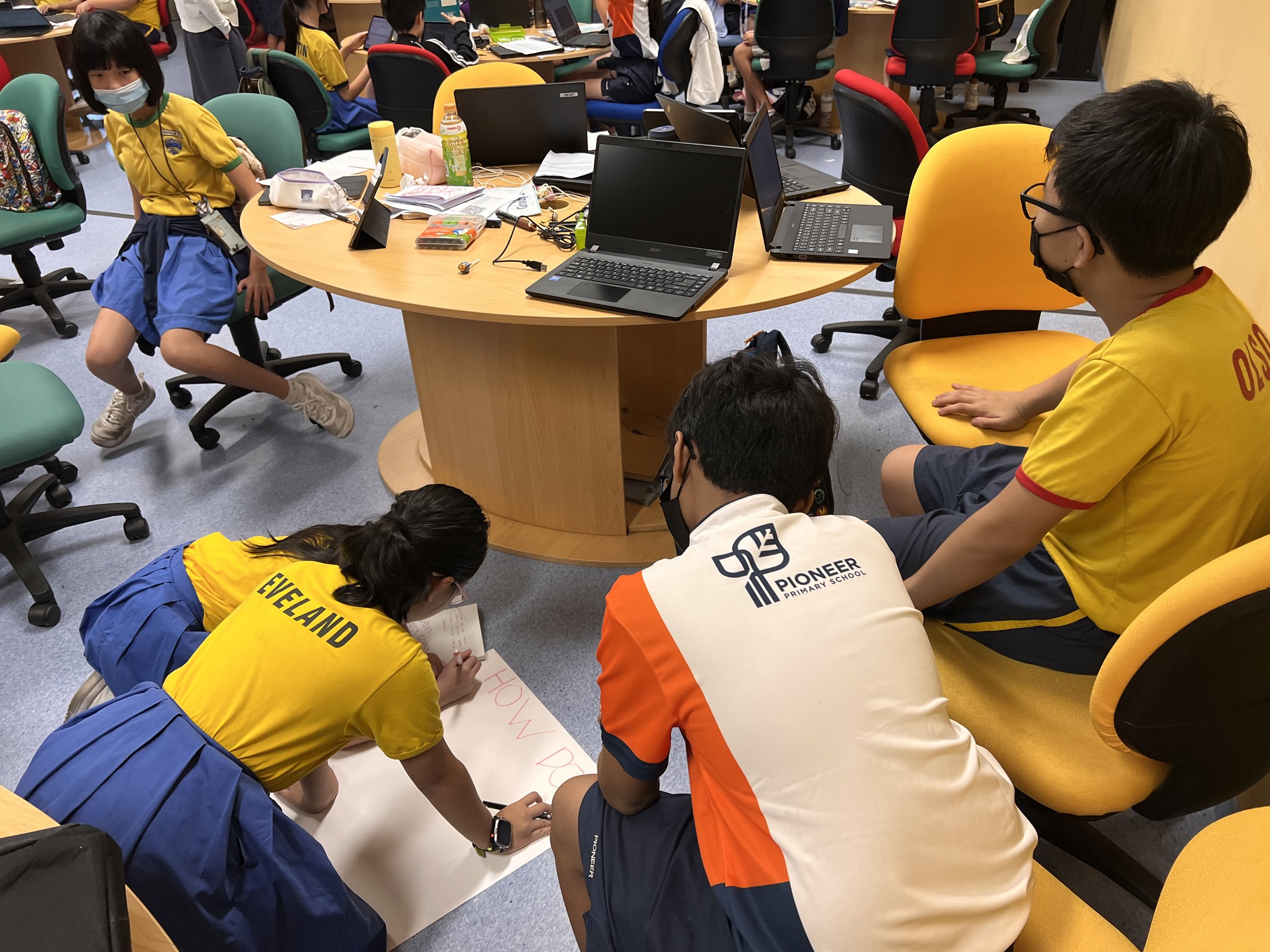
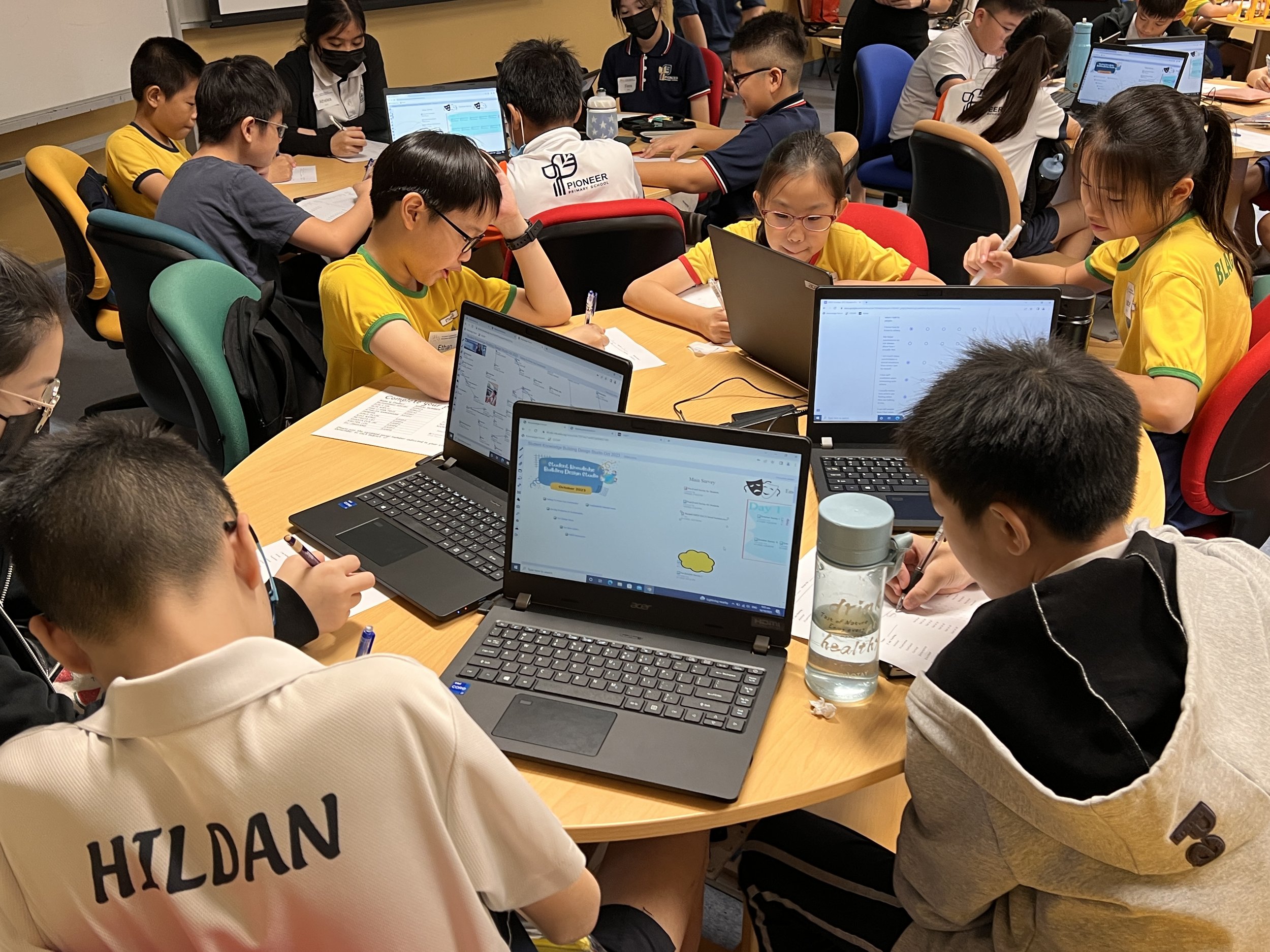
Student Presentations & Gallery Walk
In their groups, students created artefacts that highlighted their understanding of their design solution to the Sustainability issue that was selected.
Meta Talk
Guided by Dr Katherine Yuan and Dr Teo Chew Lee, students were asked some questions to reflect further on their ideas and knowledge building understanding with the community.
Moving Forward
In this edition of KBDS, students actively engaged in knowledge building. This highlights the potential of young minds to improve ideas and unleash their creativity in solving sustainability problems.
International Knowledge Building Design Studio (KBDS) June 2023
Introduction
The 7th cycle of Knowledge Building Design Studio (KBDS), themed “Data Science and Sustainability”, was held on 22 - 24 June 2023. The aim of this KBDS was to facilitate student groups to use data science to investigate real-world problems relevant to Sustainability. It was the first full face-to-face event since the outbreak of the COVID pandemic. Furthermore, for the first time, an international KBDS was held, whereby 27 Hong Kong students and their 3 teachers flew over to Singapore for the event, which enabled students to bring diverse funds of knowledge to the event and engage in collaborative Knowledge Building with international peers. Along with 16 students from Broadrick Secondary School and Unity Secondary School, the students formed seven groups based on their common inquiry interests. The teams worked together with researchers and various field experts to research and utilize data to answer their negotiated investigative questions. This KBDS integrated multiple technology platforms like ZOOM to support international video conferencing; Knowledge Forum, an online discussion tool for knowledge building, to support progressive discourse; and Jeffreys's Amazing Statistics Program (JASP) and Common Online Data Analysis Platform (CODAP) for data analysis and visualization.
Group photo of all who took part in KBDS June 2023
Video montage of KBDS June 2023
Main Design of the KBDS
The KBDS was driven by students’ authentic ideas and real problems inspired by videos and invited guest talks. Firstly, two carefully curated videos about sustainability relevant to Singapore and Hong Kong were played. Secondly, we invited one data scientist and one sustainability expert. Each student was provided with a piece of post-it to write down the topic that they are interested in. Based on their common interests, the students were grouped into seven groups for a deeper investigation. A correspondent group structure was created in the online KF platform to support groups’ data-inherent Knowledge Building.
To help students understand how data can be collected and analyzed, we designed a simple game to collect data, which was then used to teach the concept of linear regression.
Tennis ball game to learn about regression
Small Group Sessions
Besides the segments happening at the community level, some segments occurred at the group level, for more focused idea-sharing.
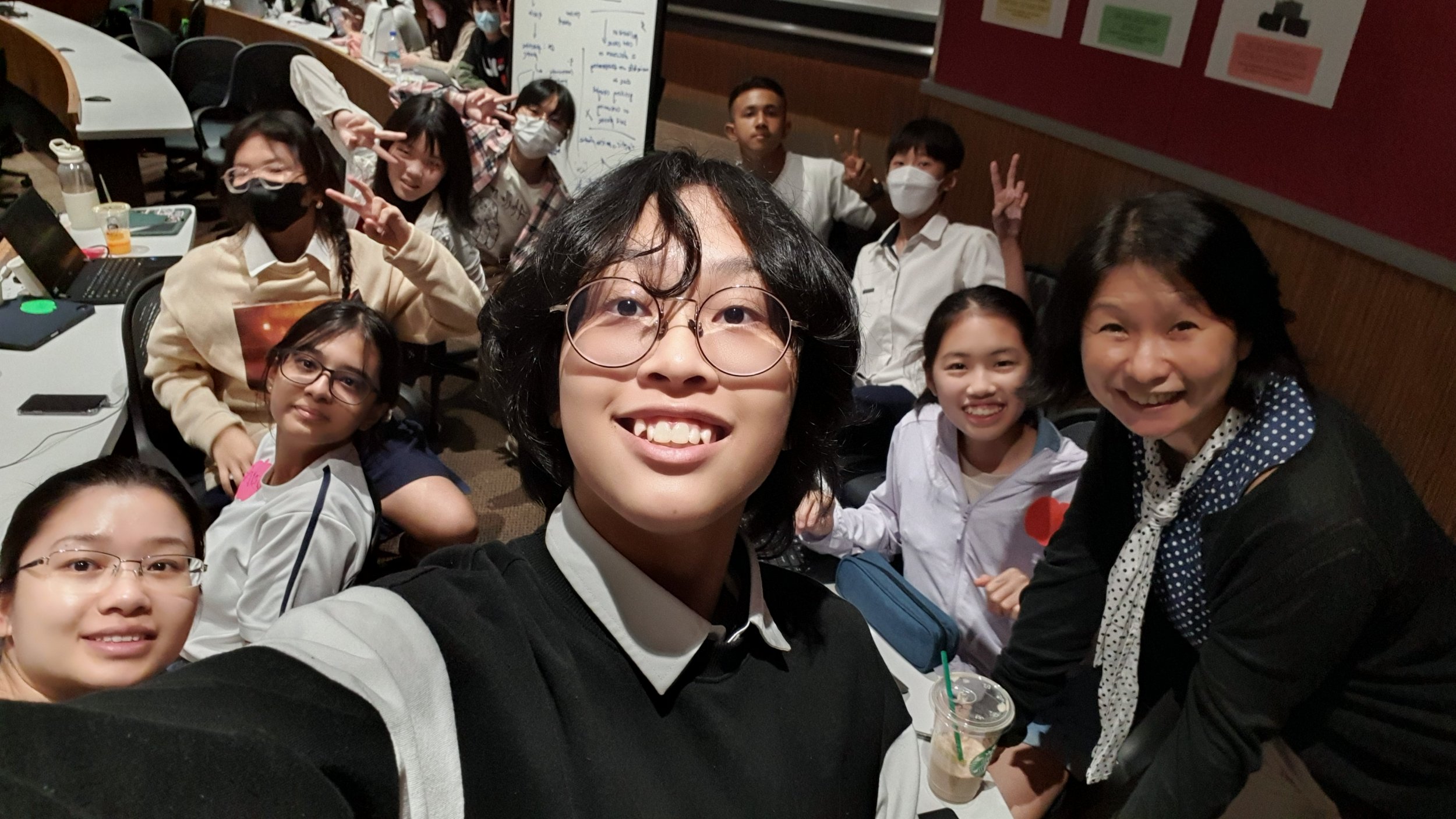
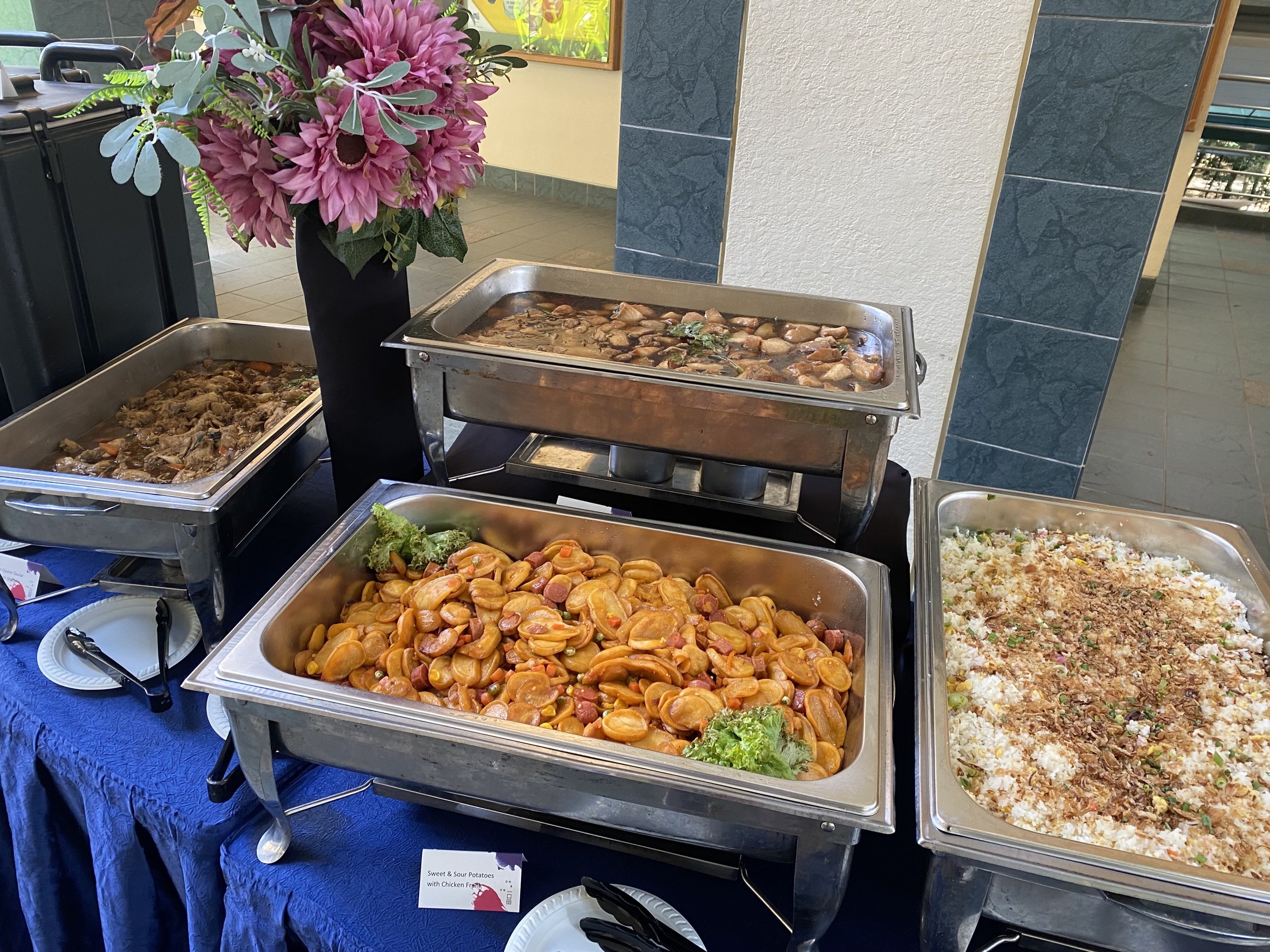
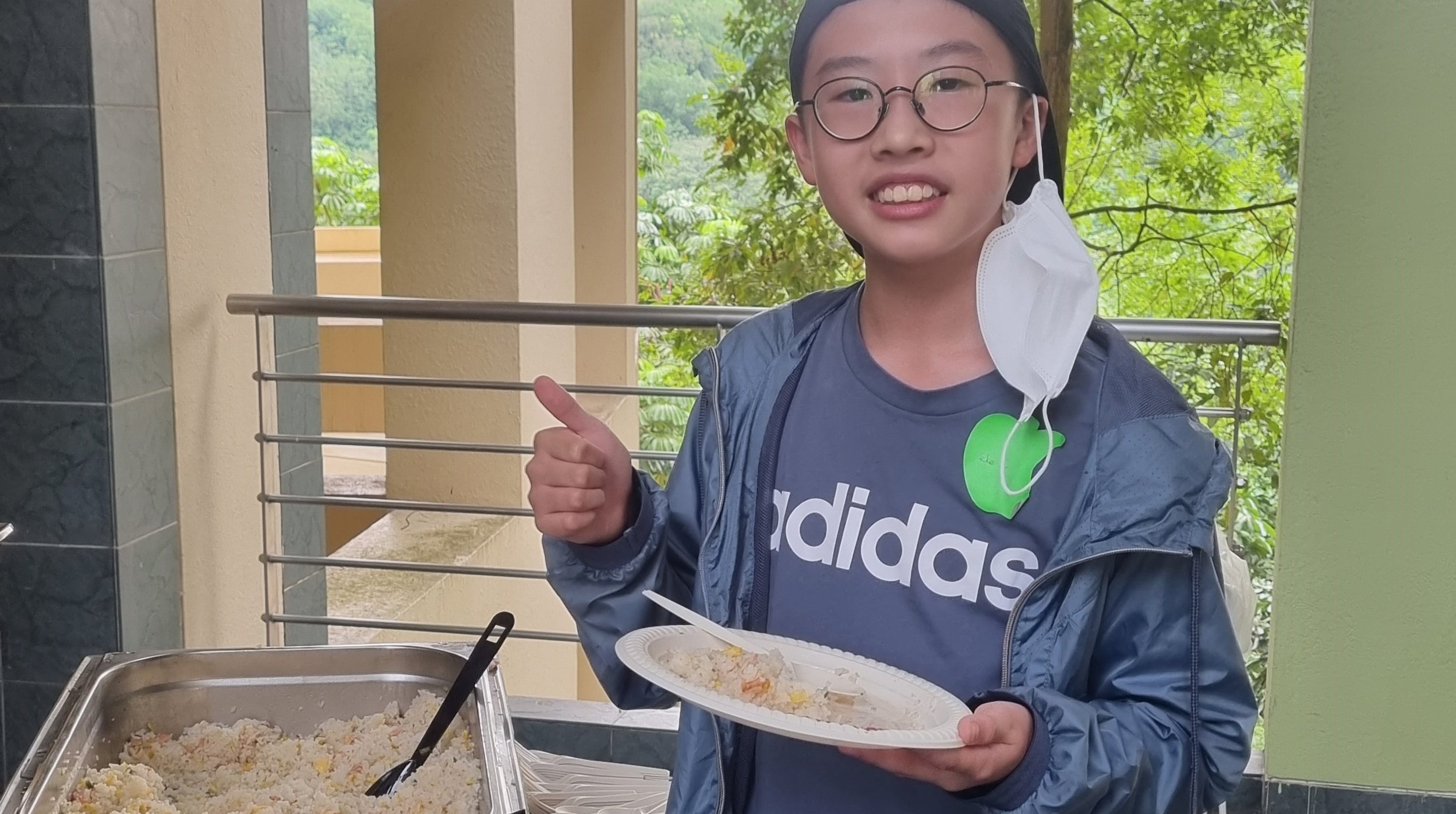
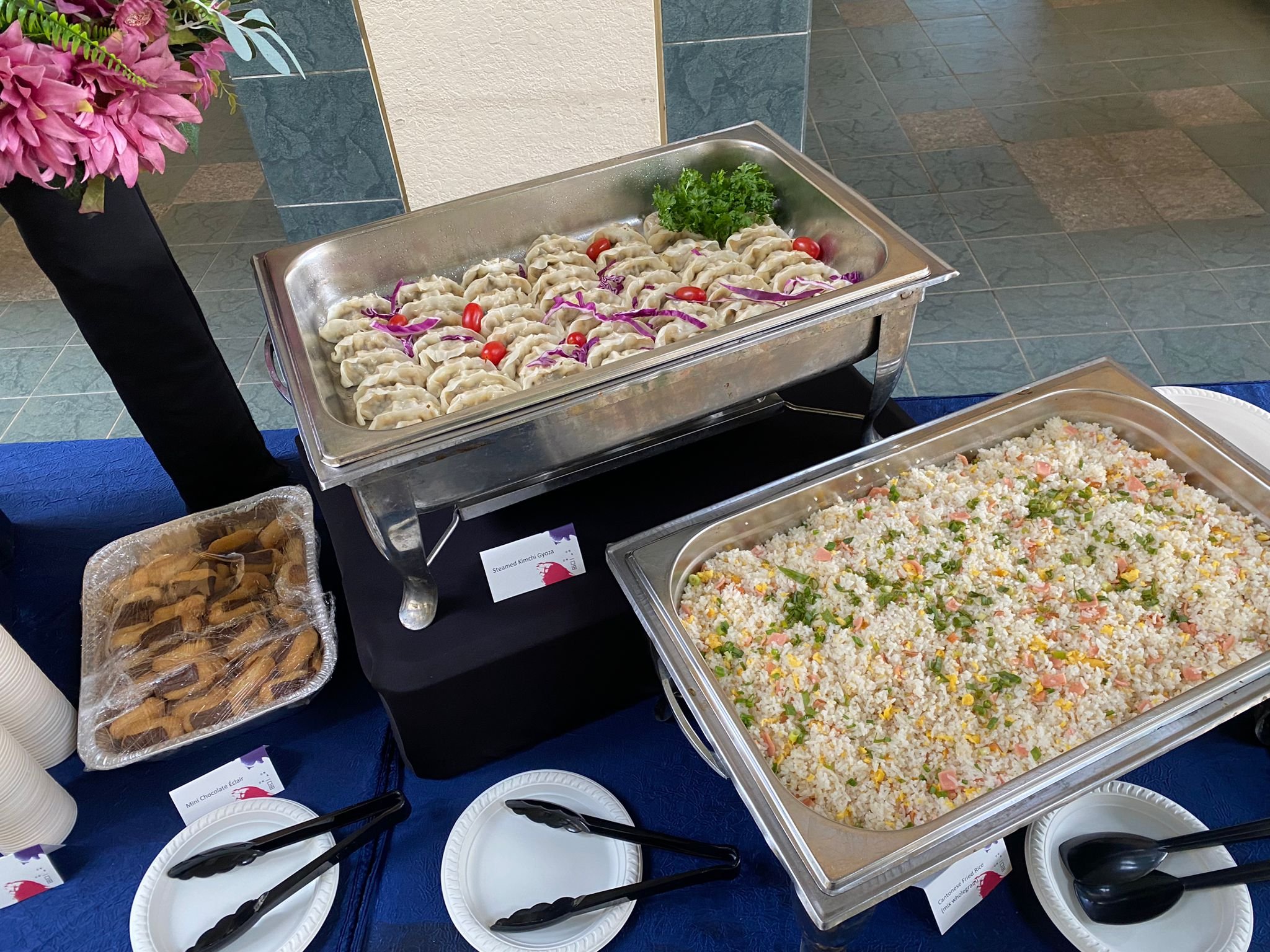
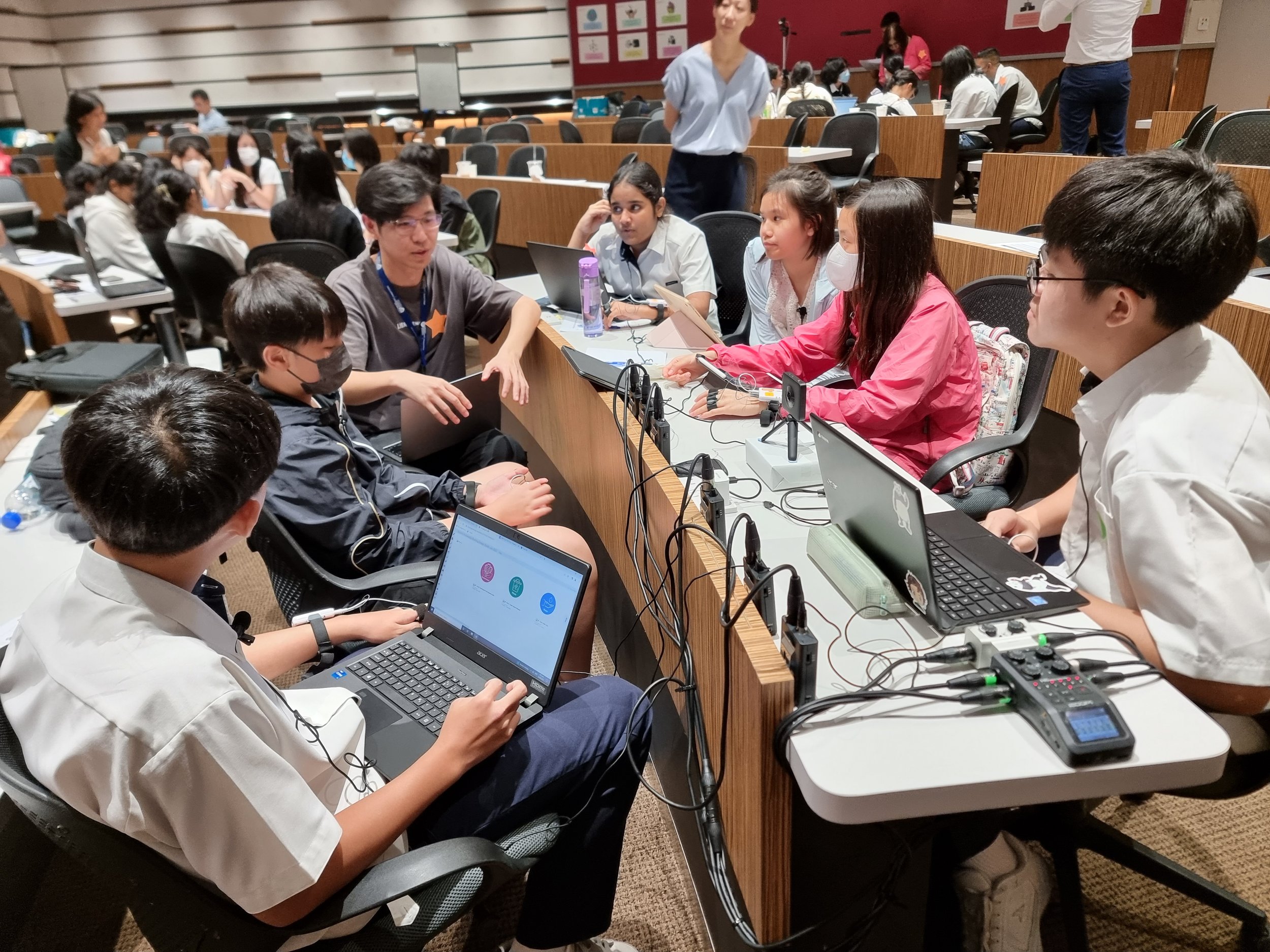
Co-create A Journey of Thinking to Synthesize the Learning Progress
Students wrote and shared in their group views, pursuing an in-depth understanding of their inquiry. Students reviewed the diverse idea contributions and synthesized their shared advances through co-authoring a reflection note - Journey of thinking (JOT). JOT facilitated students in synthesizing ideas and rising above in KF with scaffolds. Students created one group JOT to reflect on how their ideas have progressed. Students were also given time to build on various ideas, respond to their peers’ comments, or write about what they have learnt.
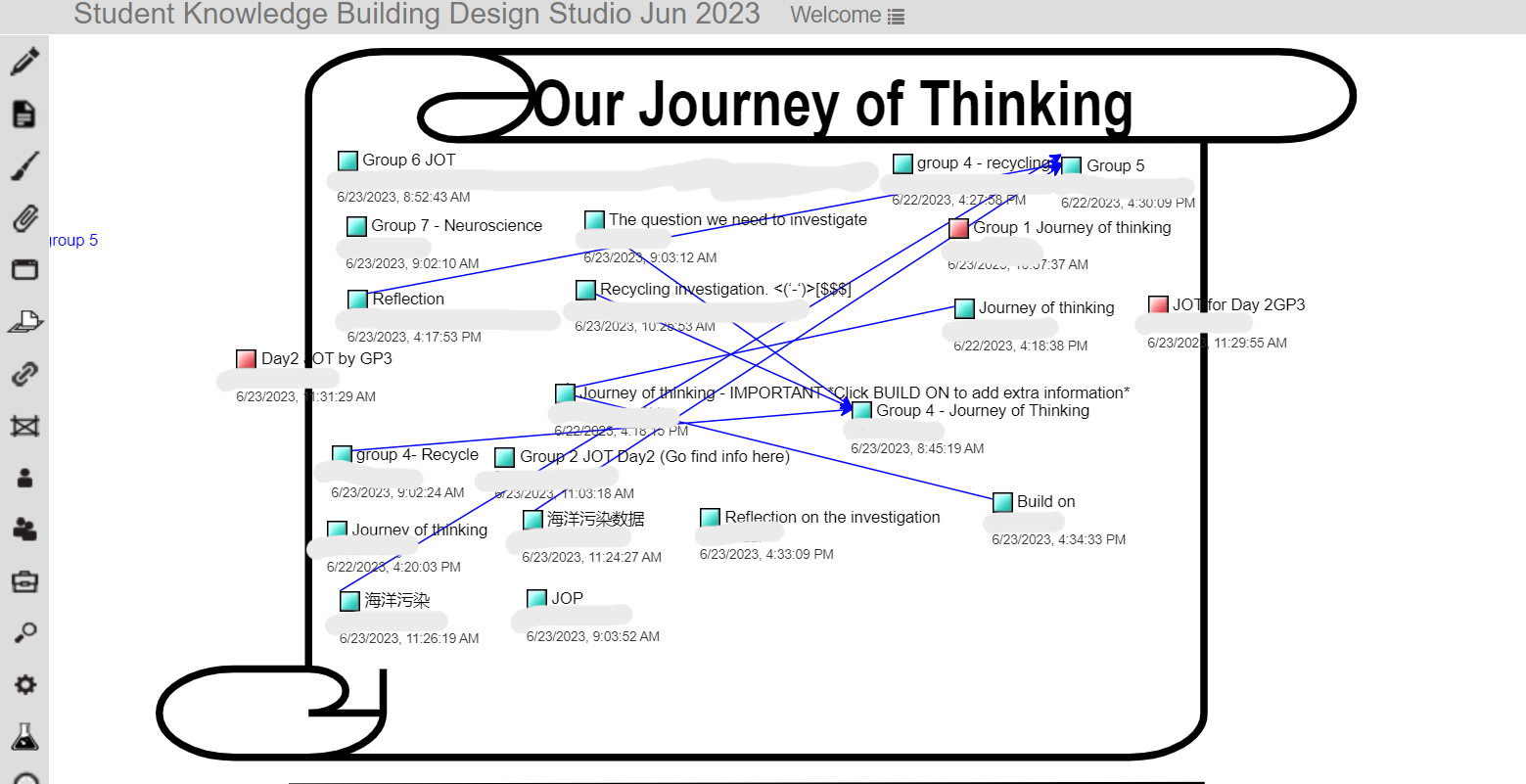
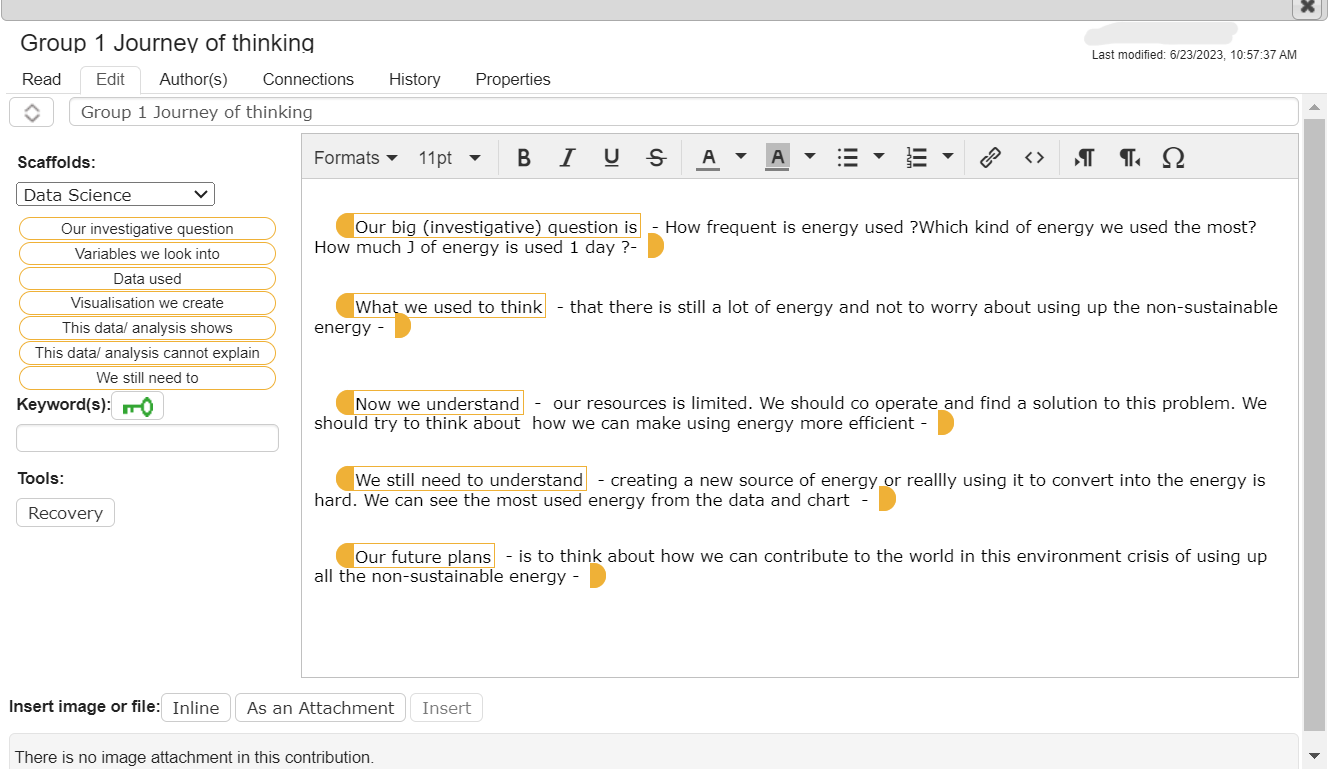
Experts of Data Science and Research in our Community
Several experts were invited to share their expertise regarding Data Science and Sustainability. The expert sharing sessions had helped students to learn more about what they can do with data and how data analysis can be used to solve real-world sustainability problems.
Expert Sharing by Ms Jeanne McClure
Ms Jeanne McClure, a Ph.D. Student in Learning Analytics from the North Carolina State University in the States, kickstarted by setting the stage– that Data Science is everywhere and helps us understand the world. Jeanne is involved in many data science education efforts in both K-12 and higher education. She shared her insights about data science and invited students to engage in multiple interactive online interactions.
Expert Sharing by Dr Stephen Tay
The sharing continued with Dr Stephen Tay, who is from the National University of Singapore (NUS). Dr. Stephen Tay is currently an Associate Professor in the Department of the Built Environment and an Adjunct Researcher at the Solar Energy Research Institute of Singapore (SERIS). During his sharing, he shared about sustainability issues, efforts, and their relevance to the world.
On day 2, there were three data scientists who concurrently went around to various groups for in-depth consultation sessions. The three data science experts were—Assistant Professor Farhan Ali, Dr Katherine Guangji Yuan, and Dr Lee Vwen Yen Alwyn. They were invited to give students feedback on refining their investigative questions and data analysis.
Dr Farhan Ali is an Assistant Professor in the Learning Sciences and Assessment Academic Group, National Institute of Education.
Dr Katherine Guangji Yuan is a Research Scientist in Office of Education Research, National Institute of Education.
Dr Lee Vwen Yen Alwyn is a Research Scientist in Office of Education Research, National Institute of Education.
Student Presentations
In their groups, students created an artefact showcasing their investigative question, explaining why the question is investigative and necessary, and detailed their data science inquiry process.
Students creating a video to showcase their proposal on electric cars


Meta Talk
During the Meta Talk session, students reflected on big questions, like — “How do the results inform future actions relevant to Sustainability?”
Sharing of thoughts with the community
Field Trip
On day 3 of KBDS, students went on a field trip to Marina Barrage and Science Centre. It was optional for Singaporean students.
Group Photo outside the Sustainable Singapore Gallery
At Marina Barrage, students learnt about the sustainability issues that Singapore is currently facing, as well as how the government tackles them.
Visit to Science Centre—The Tinkering Studio
Following the Marina Barrage tour, students visited the Singapore Science Centre—the Tinkering Studio. The Tinkering Studio is a hands-on activity space where students are encouraged to fiddle around and come up with new ideas. Students were given the autonomy to generate solutions to challenges posted. The booths include—playing with the marble machine, making a mini parachute, making a LED pixel art cube, etc. The highlight of the Tinkering Studio was the marble machine wall. Students explored everyday objects and constructed a maze-like passage for the marble, resembling a pinball machine game.
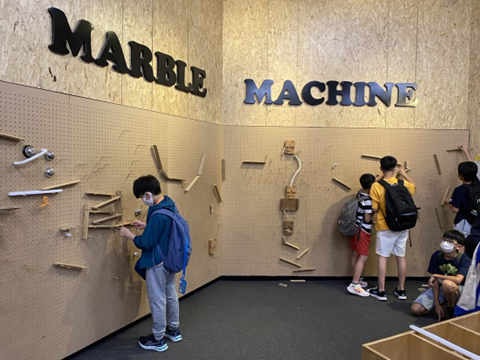
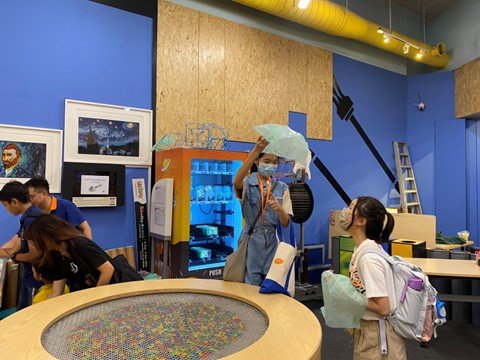
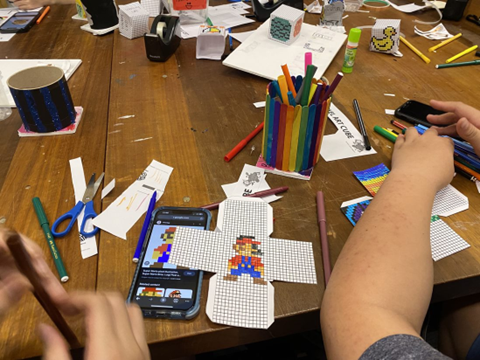
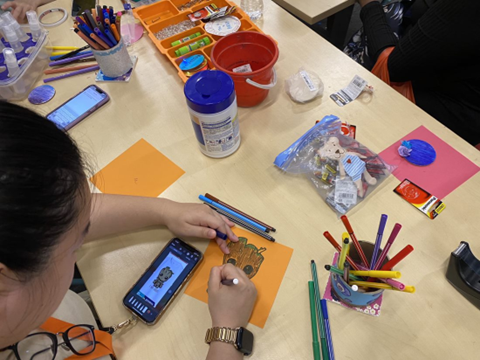
After exploring the hands-on activities, students were allocated free-and-easy time to explore the different exhibitions.
Moving Forward
Through this run of KBDS, students had built knowledge and continued to show potential in improving ideas related to sustainability in the community. This KBDS also included an exciting field trip component for the first time.
The next run of KBDS will be from 16 to 17 October 2023. We will be opening up KBDS to primary school students. Please look out for our next announcement on our website.
Knowledge Building Community - International Network Learning (KBCNL) April 2023
The Knowledge Building Community Network Learning (KBCNL), titled ‘Seeing Students Voices’ was held on 14 April 2023. This network learning session was held at the National Institute of Education (NIE) in a hybrid setting with both online and physical participants. More than 50 students, teachers, and researchers from Singapore, Hong Kong (China), and Shenzhen (China) came together for an afternoon of cross-community sharing and reflection on KB practice.
The focal point of this session revolves around the collaborative initiative by Chua Chu Kang Secondary School and Clementi Town Secondary School. Twenty students from both schools shared in-depth accounts of their experiences from their KB projects. Students explored real ideas and authentic problems during the interwar period. They discussed and built ideas, culminating into a newsletter in ‘The History Times’ shared across schools. This cross-community connection further supports teachers in expanding their KB knowledge and practice through the collaborative sharing of their KB stories and metacognitive reflection.
Live sharing on KB experience from students
To start off the sharing session, History students (from Chua Chu Kang Secondary School and Clementi Town Secondary School) presented their learning experiences from their KB projects in their respective schools. Students from both schools prepared their sharing in innovative approaches. Those from Chua Chu Kang Secondary School shared with the audiences a deep reflection on how they benefitted from the collective meaning-making processes as well as the rising above of each other’s ideas in a process of idea improvement. Students from Clementi Town Secondary School utilized an abstract method of presentation in the form of drama before concluding with their learning processes to manifest their idea improvement as a construct for the participants.
Teachers sharing of the thinking behind the design
Four humanities teachers Mr. Melvin Chan and Mr. Loh Liang See from Chua Chu Kang Secondary School alongside Ms. Sim Shin Jie and Ms. Tessa Ho from Clementi Town Secondary School shared their History KB design titled ‘The History Times’. The teachers presented their newly added approaches for this second iteration of the programme. The addition of new activities provided insight into the idea improvement journey of the teachers who have collaborated to improve upon the original design of yesteryear. An inclusion of lessons on historical fundamentals and new activities, like the abstraction of concepts into new contexts (e.g., the St John’s Island exploration), culminated in scaffolds that supported students to better visualise the progression of their ideas and to see possible avenues for exploration. The teachers also engaged participants with their reflections on the strategies that were used to support the growth of student ideas.
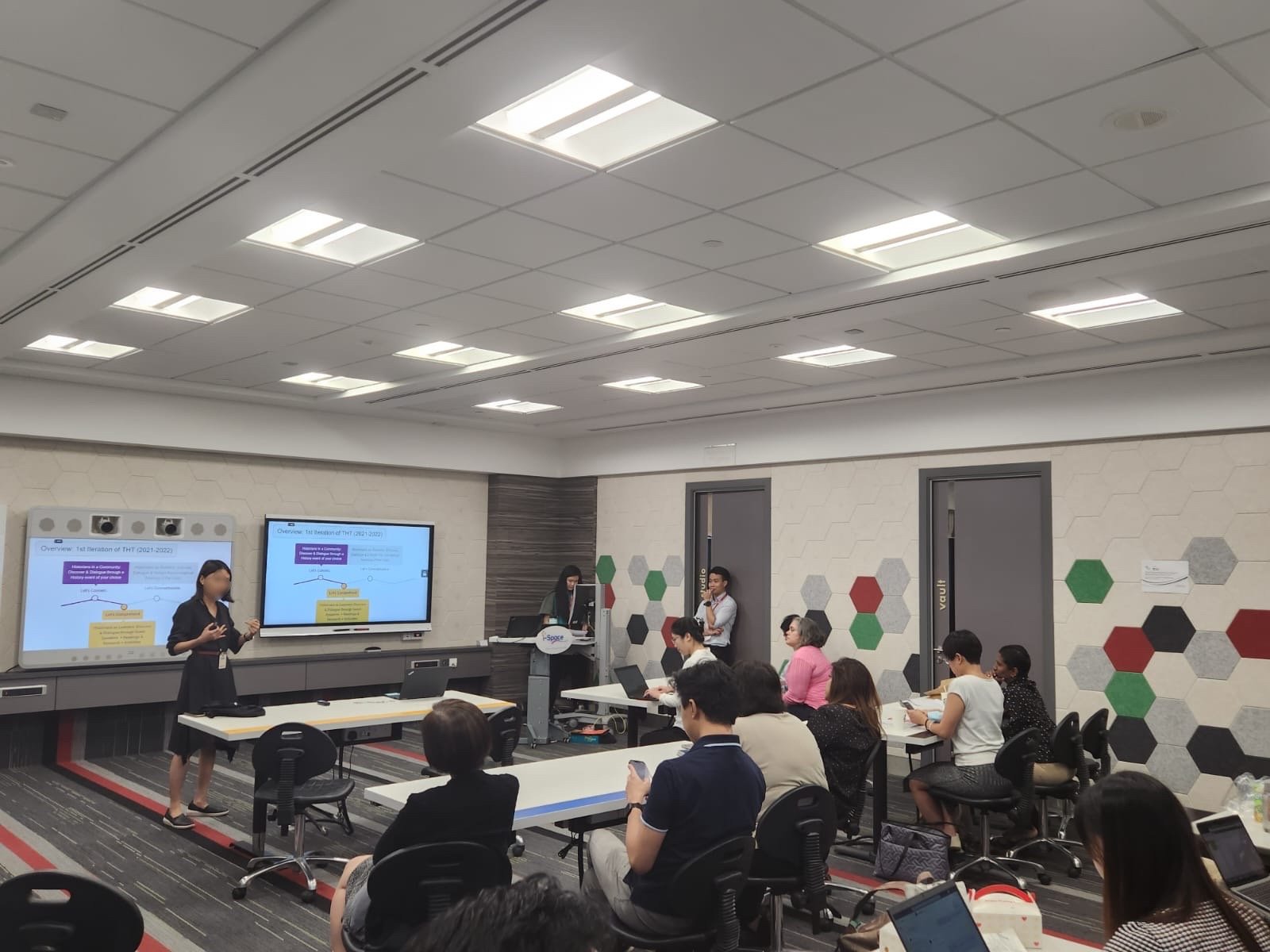
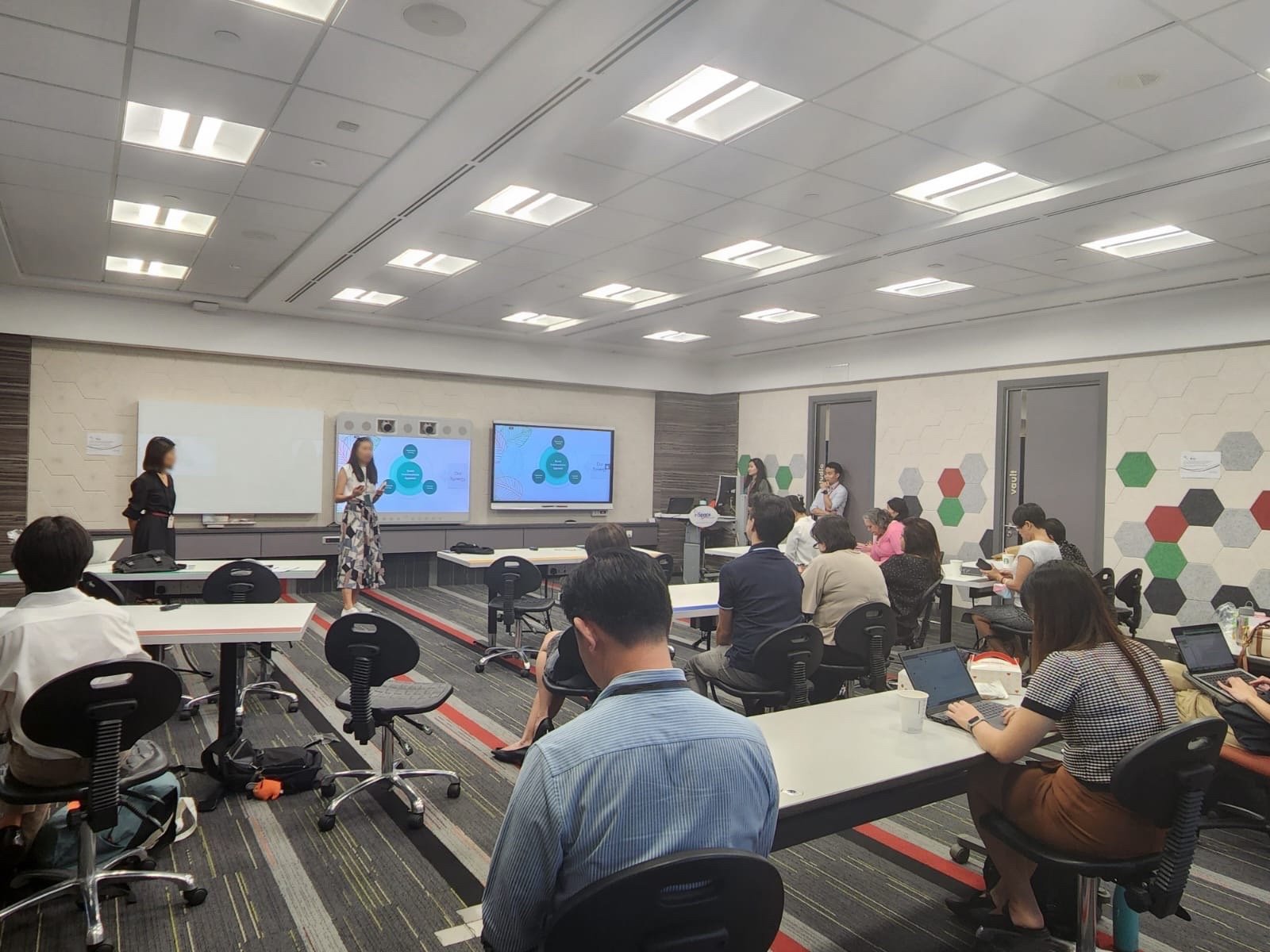
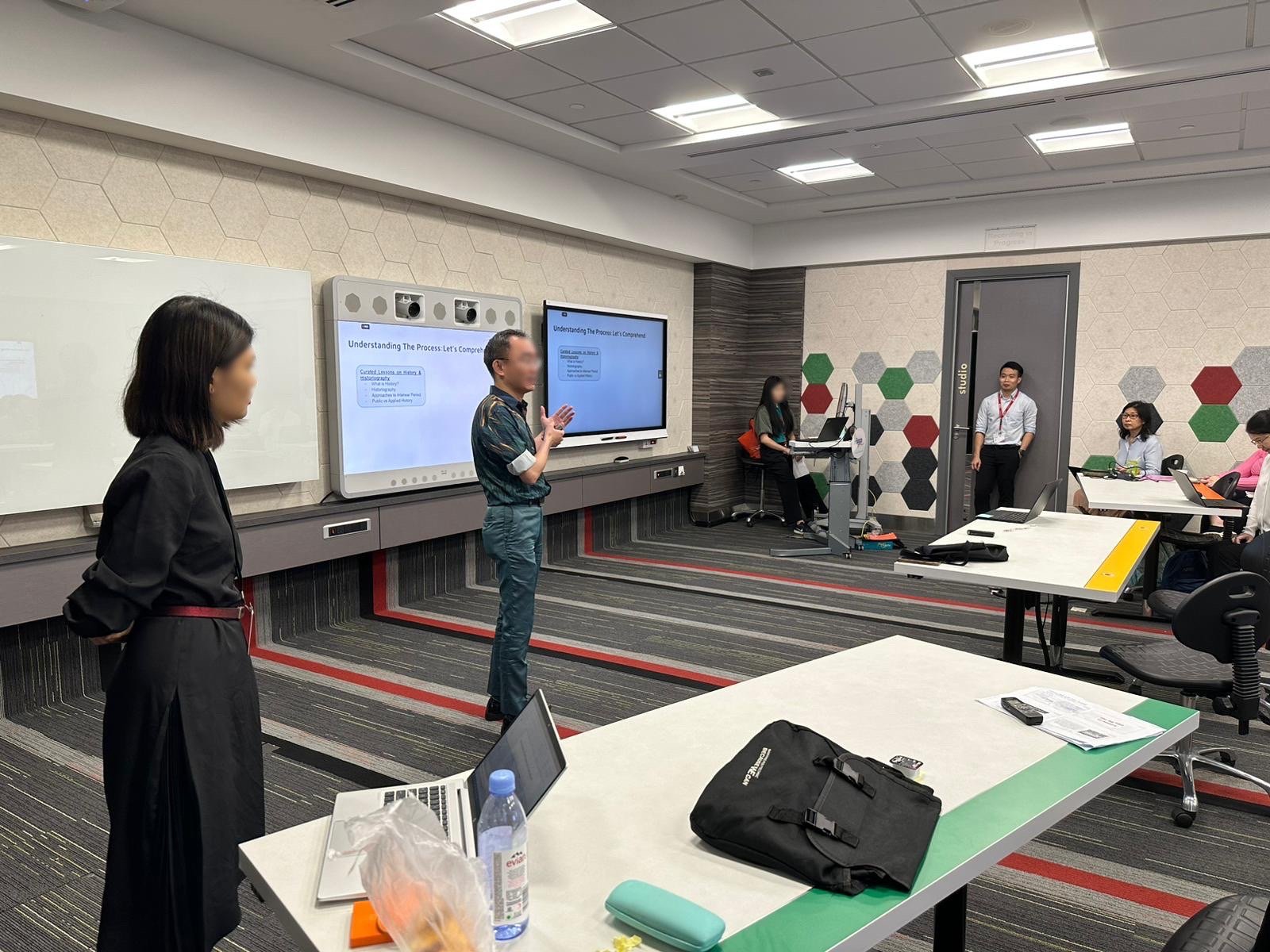
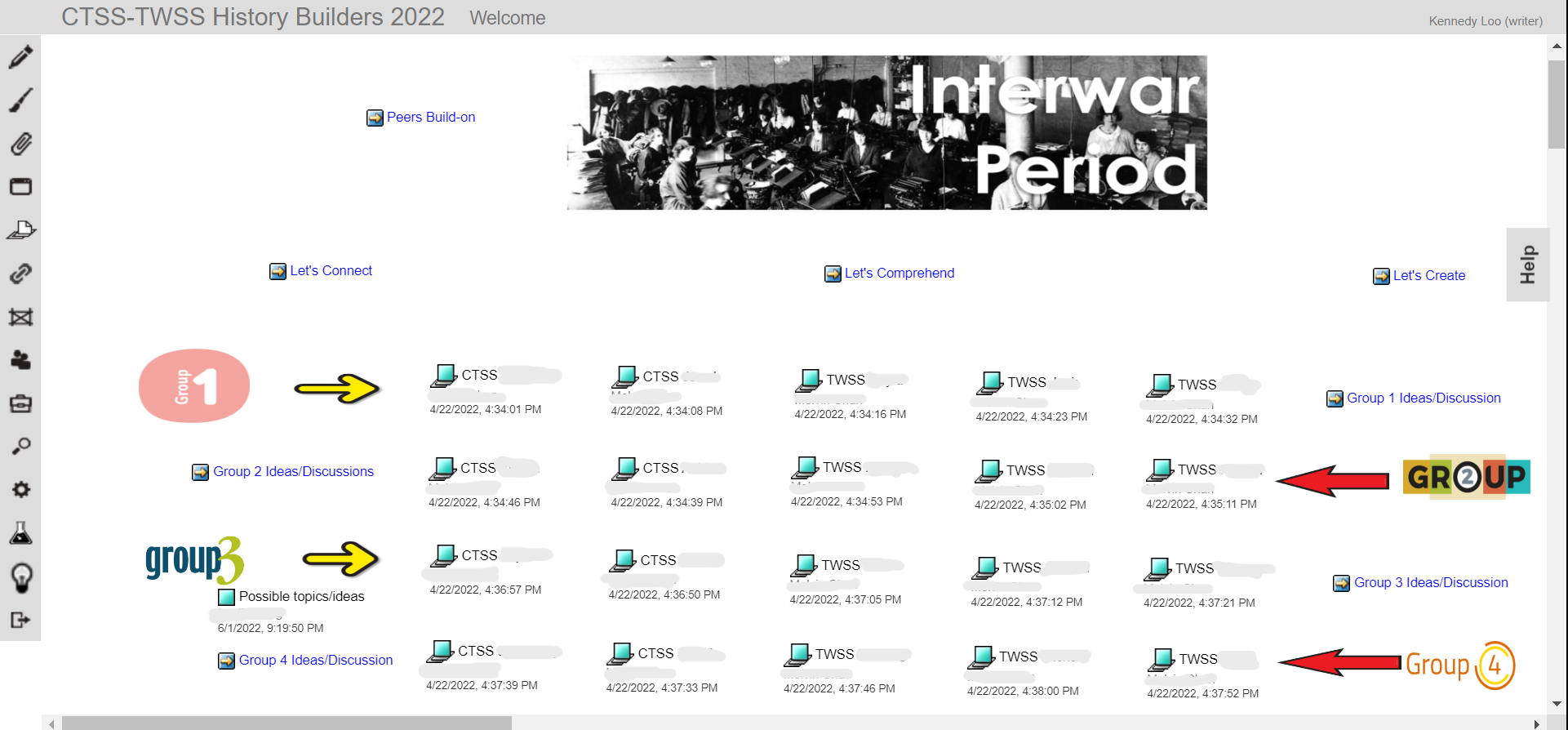
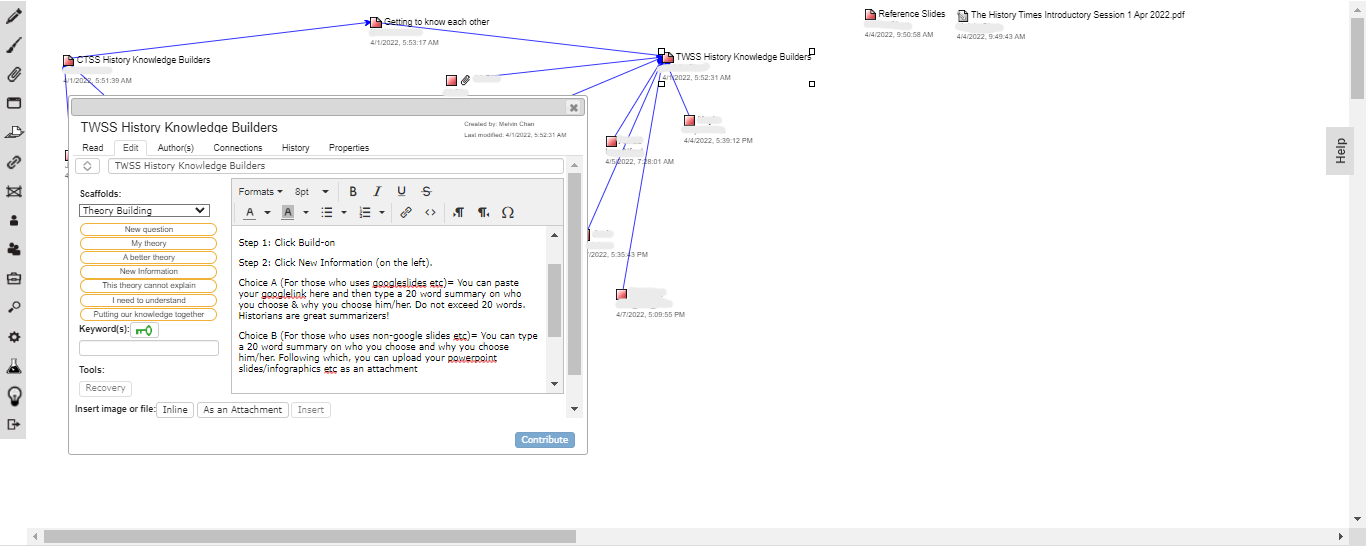
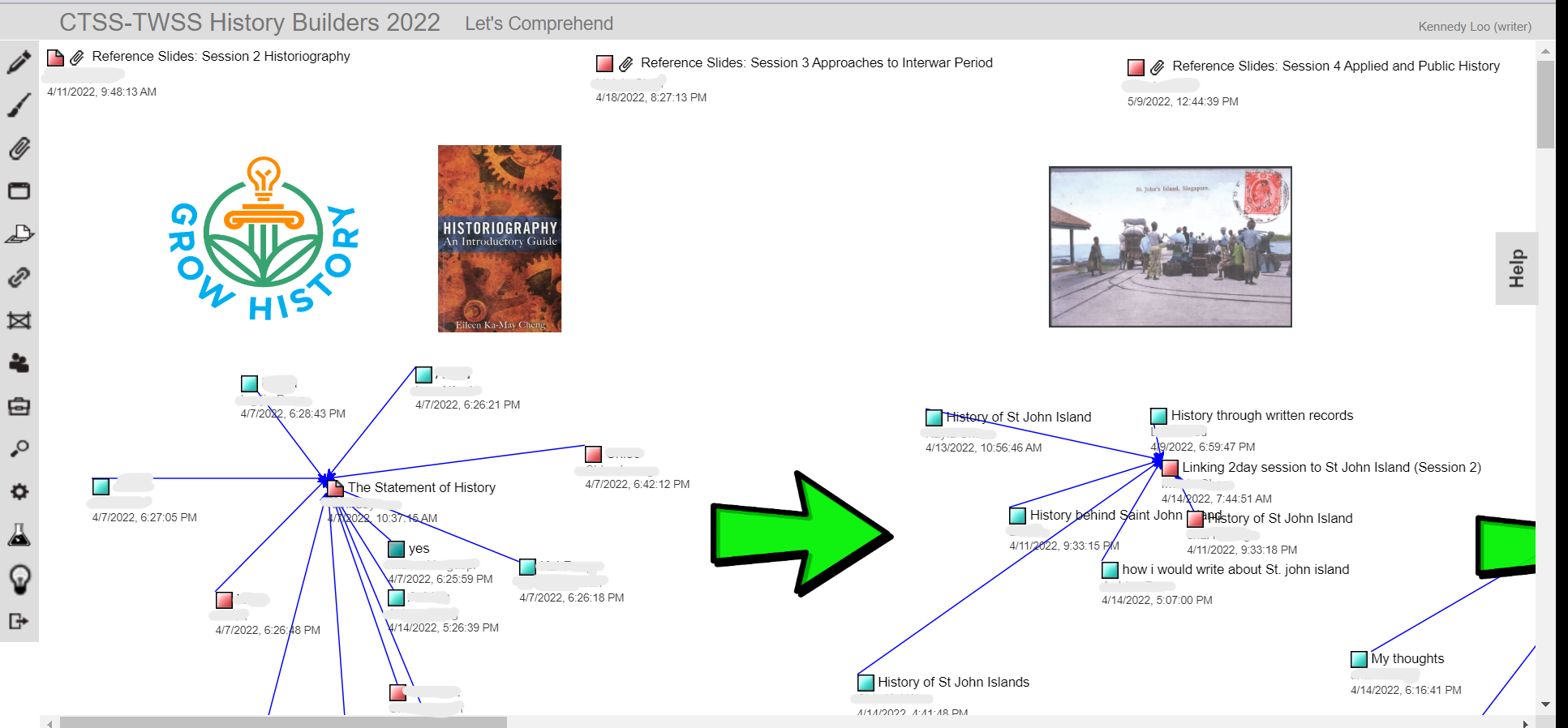
Metatalk: Reflection of Students
The metatalk was facilitated by Dr Katherine Yuan, where the students engaged in a community discussion.
They shared an appreciation of idea diversity arising from collaborative discussions and felt they had greater agency in building on each other’s ideas. Students from both schools were also keen to express their newly found ideas of the historical content that has been deepened through their partnership.
Closing
Prof Tan Seng Chee was invited to close the session. He identified key moments of the session that had exemplified the theme of ‘Seeing Students Voices.’ Prof Tan also shared his experience learning History and encouraged the students and teachers to continue pushing the frontiers of learning.
Moving Forward
Through the network learning session, educators were able to see and experience the voices of the students as well as take inspiration from the teachers who truly promoted students’ agency and supported the students in their knowledge building endeavour.
In the upcoming network learning sessions, we will continually work closely with teachers in the KB community to produce meaningful and enriching cross-community interactions through the ‘KB metaspace’ to enhance their professional development. We will also be showcasing new research opportunities in education that can provide further opportunities for practitioners and researchers of KB to come together.
Sharings at the KBCNL April 2023
These are 4 newsletters in this series of the ‘History Times’ which revolves around the historical period of the Interwar Years from 1918 to 1939. This is a period in between the two Great Wars. The First World War from 1914 to 1918 has commonly been studied in the Secondary School history curriculum in Singapore to illustrate the deep-rooted events during the previous age of empires. Often dubbed ‘the war to end all wars’, a phrase originating from the collection of articles titled ‘The War That Will End War’ by H. G. Wells (1914), students study the events as a context for the Second World War that dates from 1939 to 1945. However, the period that forms the bridge between the two wars has often been overlooked as events insignificant in comparison and thus often glossed over. Despite this, questions are often raised in the classroom about the events during this period.
This was the rationale behind the design to ensure opportunities for further exploration. With the help of Knowledge Building Principles, students from both schools collaborate to conduct historical exploration which serves to not only explore this void in their content knowledge but also enhancing the regulation of their individual knowledge through collaborative idea improvement.
Students in the four groups spearheaded the discovery based on their initial collective interests that culminated into researching about the forms of entertainment, development of music, the improvement and propagation of new technologies as well as in the field of a new culture of sports. These four newsletters traced each development in order to highlight the different social experiences of the people during that time.
Click below to scroll through the different groups’ work and you may pick up some interesting trivia to be learnt from History!



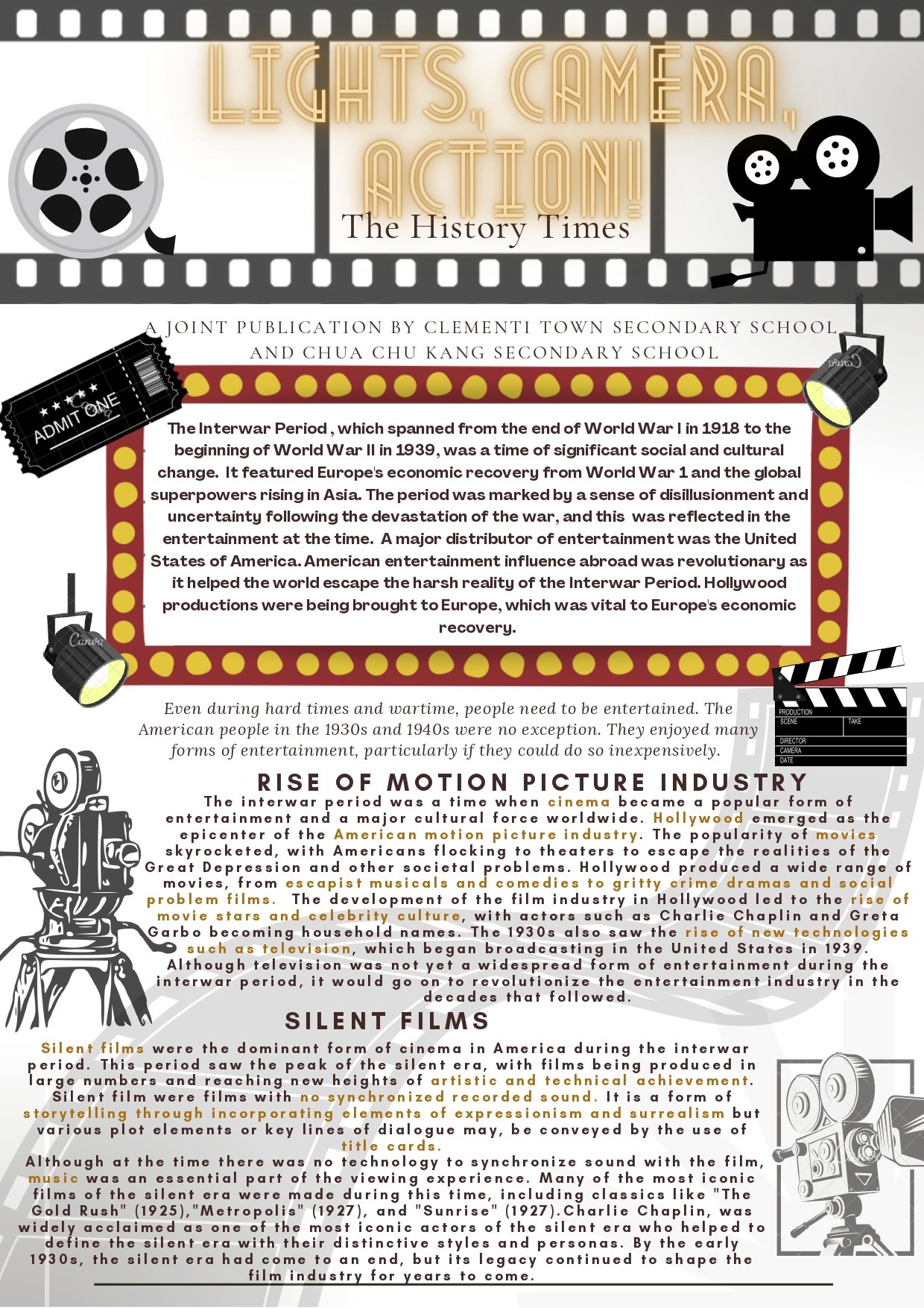
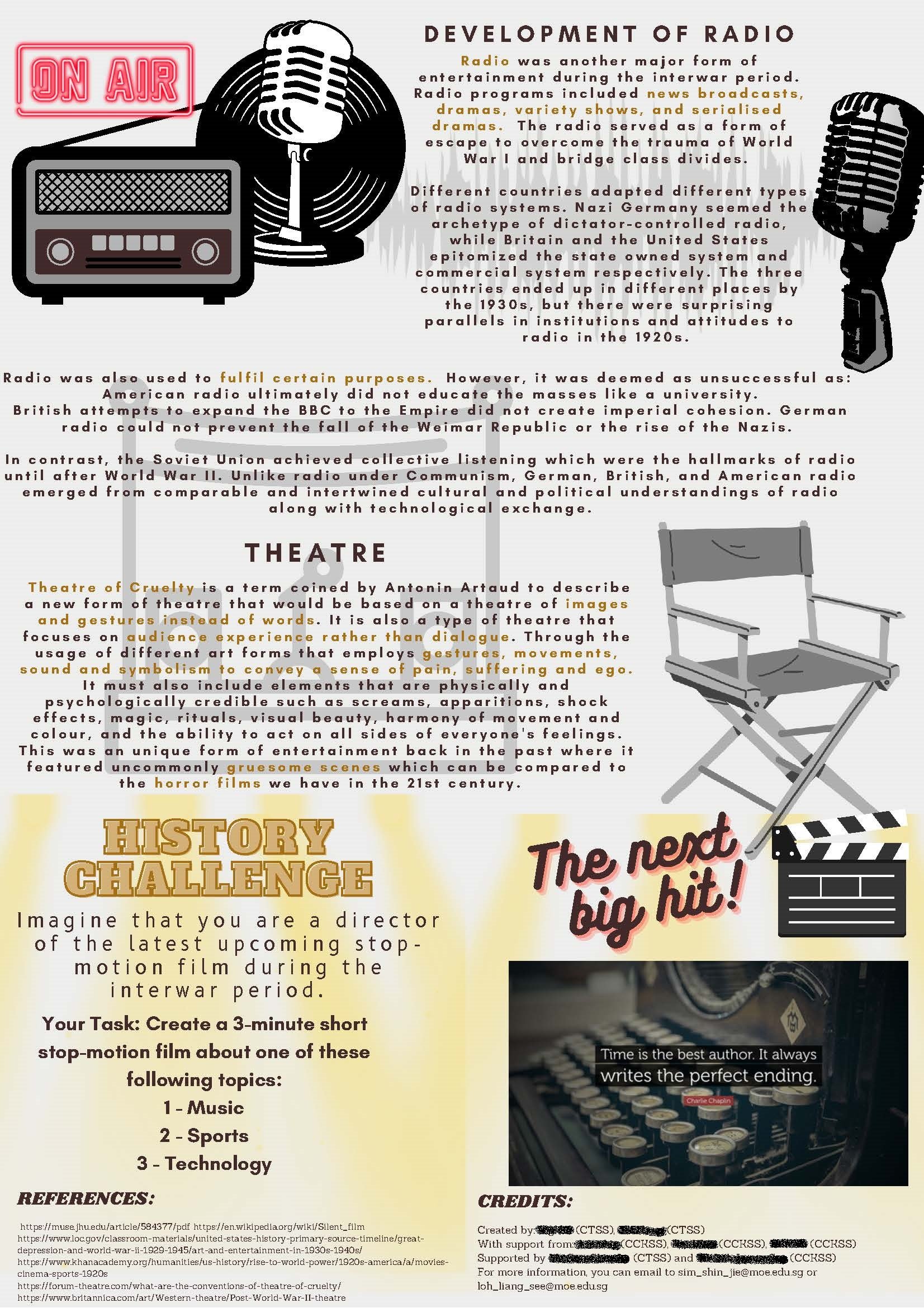

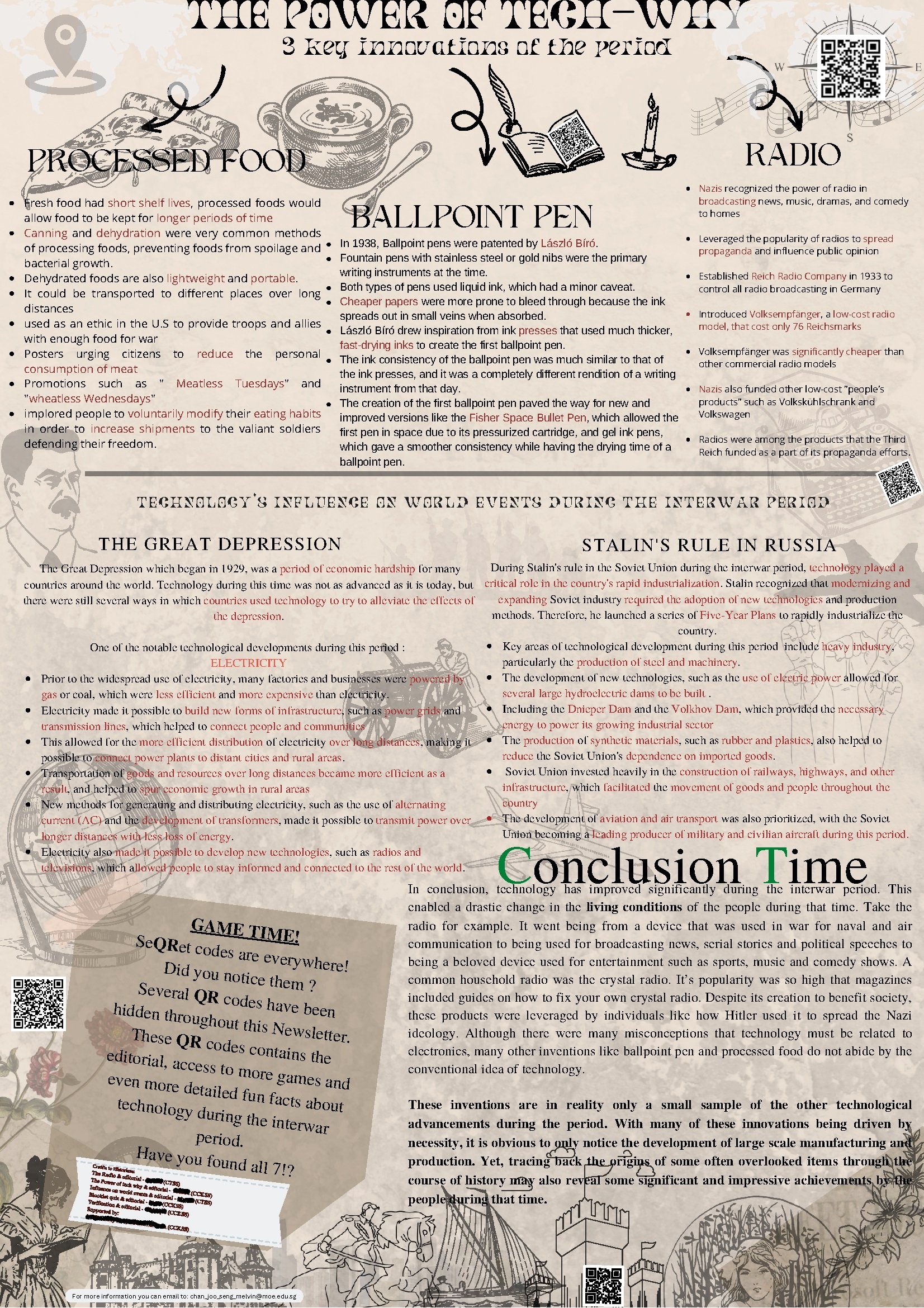
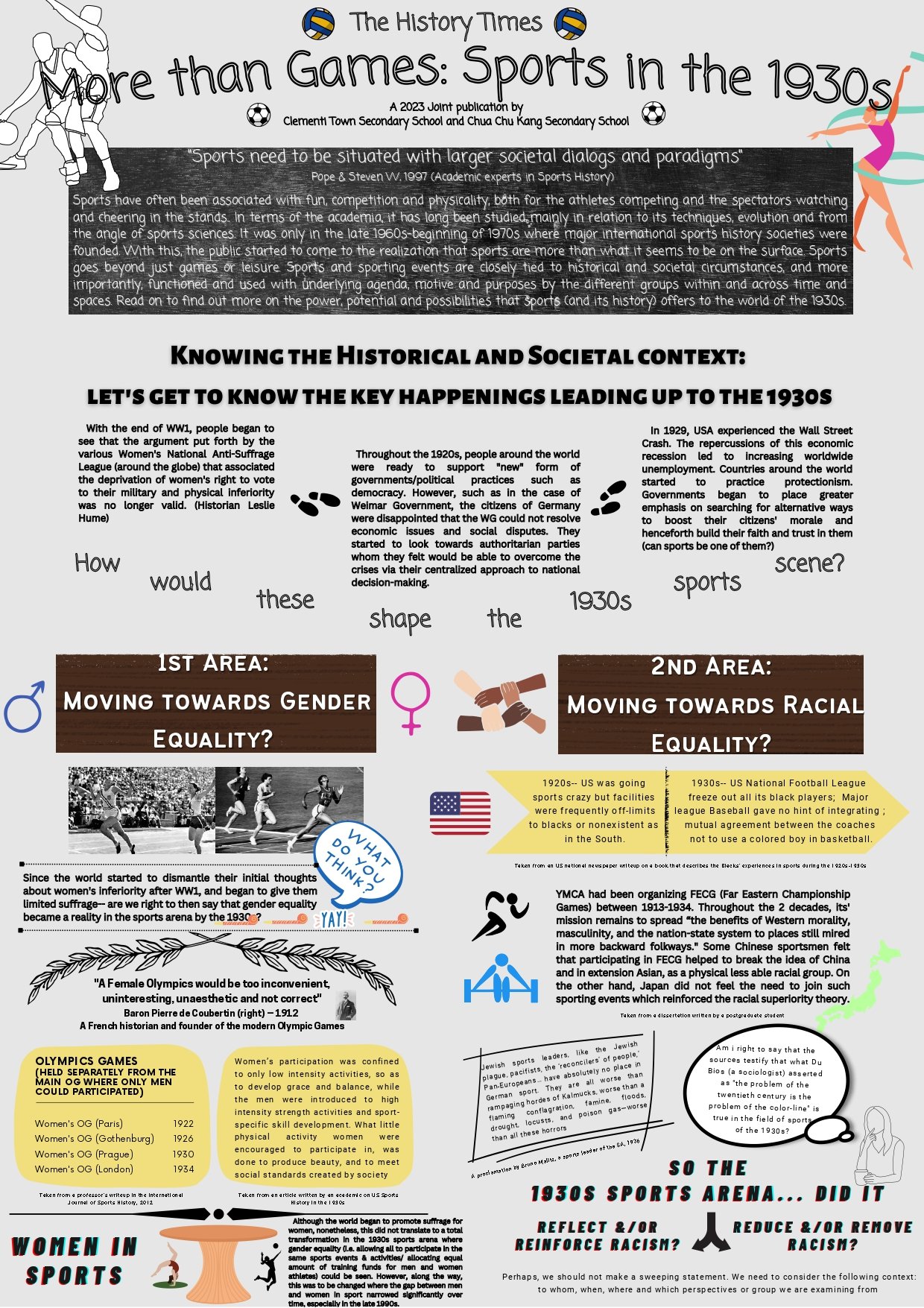
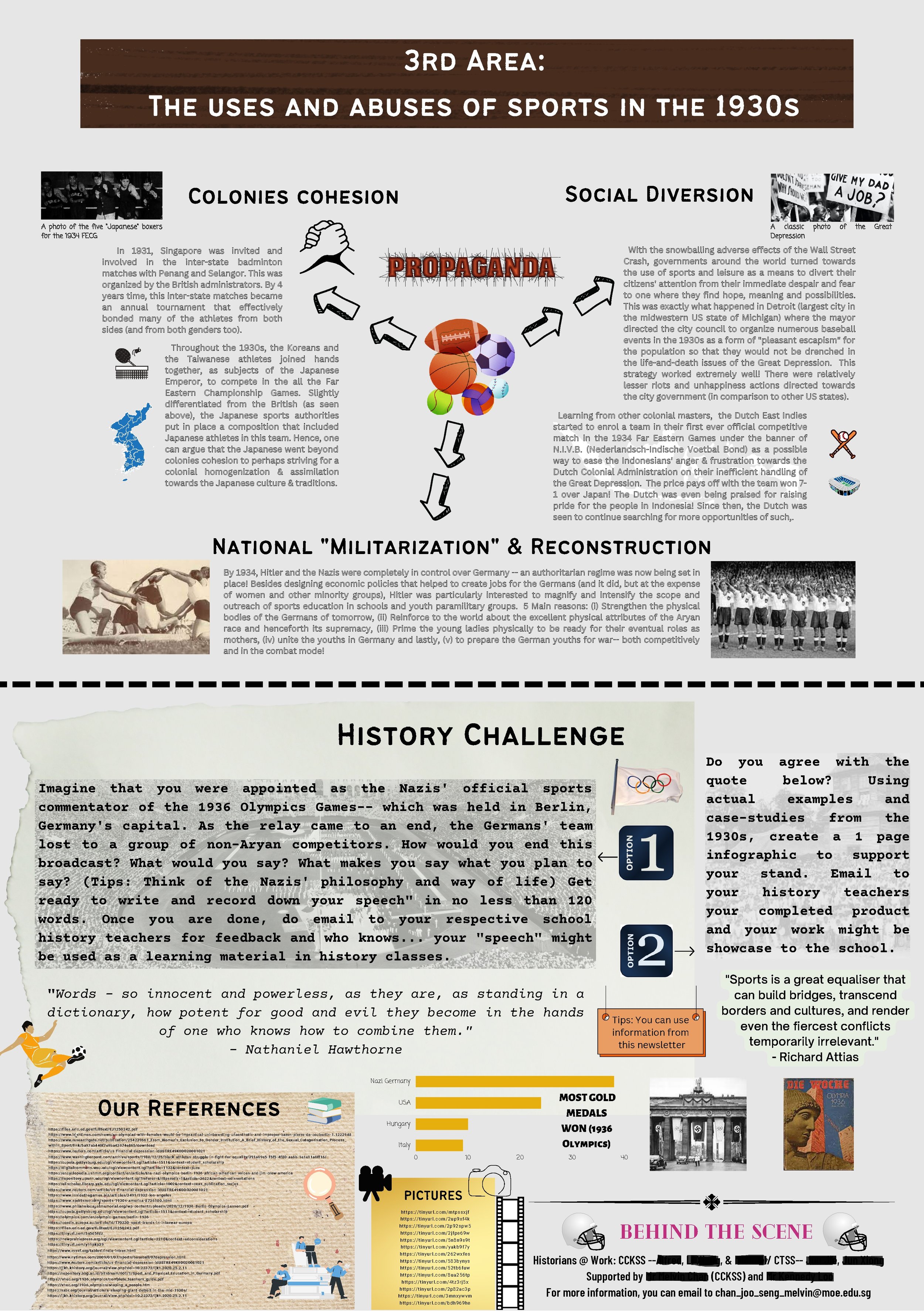
Knowledge Building Design Studio: Data Science and Sustainability (24 and 25 Nov 2022)
Introduction
The 6th run of Knowledge Building Design Studio (KBDS), themed “Data Science and Sustainability”, was held on 24 and 25 November 2022. It was conducted in a hybrid format where Day 1 was face-to-face, and Day 2 was online. Together, we invited 45 secondary students, teachers, experts, researchers, and facilitators to investigate the real-world problem - “Sustainability in Singapore.” The team creatively integrated data analysis in understanding the theme of sustainability. This KBDS integrated multiple technology platforms, including data analysis software Common Online Data Analysis Platform (CODAP), ZOOM, and Knowledge Forum, an online discussion tool for knowledge building.
Main Design of the KBDS
Emergent Grouping to increase students' agency: In this iteration, we designed kick-off activities where students watch videos and hear experts sharing to spark their interests in related topics of sustainability and Data Science. Then students write down the topic they are interested in and form them tougher on an idea wall. Based on the common themes, five groups emerged, and students regrouped based on their common interests for deep investigation. A correspondent group structure was created in the online KF platform to further support students' group discussions.
Co-create A Journey of Thinking to synthesize the learning progress
Students wrote and shared in their group views, pursuing an in-depth understanding of their inquiry. Students reviewed the diverse idea contributions and synthesized their shared advances through co-authoring a reflection note - Journey of thinking (JOT). JOT facilitated students in synthesizing ideas and rising above in KF; with the scaffolds (Our questions, we used to think, we still need to know… ), students created one group Journey of Thinking to reflect on how their ideas progressed over the two days, and then shared in the community space.
Experts sharing
Several experts were invited to share their expertise regarding Data Science and Sustainability. The expert sharings helped students to learn more about what they can do with data and how data analysis can be used to solve real-world problems.
Ms Jeanne McClure, a Ph.D. Student in Learning Analytics from the North Carolina State University in the States, kickstarted by setting the stage– that Data Science is everywhere and helps us understand the world. Jeanne is involved in many COOL data science education efforts in both K-12 and higher education. She shared her insights about data science and invited students to engage in multiple hands-on interactive online interactions.
The sharing continued with Mr. Ong Lip Sin, who is the Business Operations Planning Manager at the NTU Sustainability Office. Their office facilitates NTU's commitment to the well-being of a shared world and mitigating the environmental, social, and economic challenges of building a sustainable tomorrow. He shared about sustainability issues, efforts and goals adopted by NTU and their relevance to the world.
There were sharings by a research assistant, Ahmed Hazyl Hilmy, and two students, Minh Anh and Minh Tuan, on their experience with data science. They helped students to see the many possibilities and ways of exploring the world through data science.
Ahmed Hazyl Hilmy is a research assistant at the National Institute of Education, Singapore. He specialises in designing technological tools to support and enhance learning. He works with a research team that designs pedagogical strategies and curricula involving the use of immersive learning environments, open-source software and hardware (such as Arduino, micro: bit and Raspberry Pi), and machine learning.
Minh Anh and Minh Tuan are a pair of student researchers who have experience in collecting and analyzing data for their project under the Nanyang Research Programme. They just finished their O level this year and are continuing their research.
On day 2, a data scientist, Professor Farhan, was invited to give students feedback on refining their investigative question and data analysis.
Farhan Ali is an Assistant Professor in the Learning Sciences and Assessment Academic Group. A neuroscientist by training. Farhan received his Ph.D. (Neuroscience) from Harvard University, doing basic research on brain circuits. He gave students useful comments and suggestions to improve their project– by revisiting the clarity of graph visualization, clarifying the relationships between variables, considering multiple factors, and analyzing techniques to explore their data further.
Moving Forward
Through this run of KBDS, students were able to apply data science skills and use the CODAP statistical tool to analyse and interpret data. In the upcoming run of KBDS, students will be able to use a new statistical tool, JASP, in addition to CODAP, to solve investigative questions related to sustainability. KBDS 2023 will be a fully face-to-face event, with more opportunities for hands-on activities and experimentation. Students will delve deeper into environmental and sustainability issues. They will engage in knowledge building discourse with peers across different cultures, and work with international students, scientists and experts from energy industries. Students will get the opportunity to go on an exciting field trip to witness how Singapore develops some innovative solutions to tackle sustainability issues.
Knowledge Building Design Studio (KBDS) November 2022
The Student Knowledge Building Design Studio 2022 (KBDS Nov2022) will be held on the 24th and 25th November 2022, with the aim of fostering a KB community among field experts, research analysts, teachers as learning scientists, and students as budding knowledge builders.
This time, participants will be engaged in creative work by creating and building on ideas related to the studio’s central theme of “Sustainability” and also working on the emerging theme of Data Science. We hope everyone can come together to work creatively with ideas on real-world issues using actual data from live sites.
We welcome students and teachers to the NIE campus and hope everyone will be able to discuss and share ideas with experts, researchers, and analysts from the United States and Singapore. See you at KBSD Nov2022!
Successful conclusion to Idea Cafe in 2022
The Idea Cafe has successfully concluded, after a pilot run on the 13th September and 12th October 2022. We greatly appreciate teachers taking off 15 mins of their busy work schedules to join the KB communities to share and discuss about how analytics can be designed, analysed and implemented into their practices at schools. Mr Andy Ng (St. Hilda’s Primary School), Mr Melvin Chan & Mr Lin JieHui (Teck Whye Secondary School) has kindly provided the following content and slides.
Also, we hope you can continue to share and build on your ideas on this Padlet!
We hope to see everyone again when the Idea Cafe resumes in 2023!
Registration is not required and Idea Cafe is a free event.
For more information, please contact aloysius.ong@nie.edu.sg
Organised by the Learning Science & Innovation Group, CRPP, NIE; KBC Singapore
Knowledge Building Design Studio (KBDS) June 2022
Sustainability - 1st to 3rd June 2022
Knowledge Building Design Studio (KBDS) June 2022 brought together over 40 teachers, students, researchers and international experts to build their knowledge on the big idea of ‘Sustainability’. The KBDS was conducted virtually over three consecutive days and participants worked together to tackle authentic problems and produce novel solutions, by producing and sharing innovative ideas to advance community knowledge. Students were able to continuously improve their ideas via ongoing collaborative discourse that was conducted on the online Knowledge Forum (KF) and breakout sessions that took place via Zoom.
Different from previous iterations of KBDS, international experts who have attended KBDS over the years were invited to share and talk with groups of students on their specific interests. This arrangement brings students directly in contact with experts in an authentic learning environment and helps to support them to develop better and improved ideas. The invited experts are:
Dr Don Philip, with Dr Ortnela and Adriano from Canada
Ms Hoe Yeen Nie, from London, England
Dr Erik Jahner, from California, US
Dr Theresa Su, from Singapore
Local student experts (Terence, Tristan, Minh Anh, and Minh Tuan)
During these focus sessions with the experts, students were able to raise and share their inquiries directly with the experts to better understand the issue from a different perspective and further improve their ideas. Over the three days, students were readily encouraged to share their journey of thinking with each other, while documenting their reflections and growth of ideas on the Knowledge Forum. Through the reflections, students identified gaps in their current knowledge, spurring them to conduct extensive research and deeper discourse with their peers in order to advance their group’s and community’s knowledge.
Students sharing their prior knowledge of sustainability on the Knowledge Forum and with the greater community.
Day 1
On the first day, students were encouraged to share their initial understanding of sustainability and the pertinent issues that they were interested to explore further on the Knowledge Forum. Based on the initial community discussion, students voiced out their interests and formed special interest groups related to various areas of sustainability. Three specific interest groups subsequently emerged with different foci, namely: Sustainable materials & energy (split into two smaller groups), Wildlife and Carbon. Students then kickstarted their discussions by sharing and selecting topics that enable them to further explore content related to their topics of interest.
Dr Don Philip, Dr Ortnela and Adriano from Canada engaging local students on their topics.
Day 2
On the second day, students continued to work on authentic problems that were identified and developed through their discussions on the first day. Experts from different fields such as sustainable healthcare to sustainable ecosystems were invited to support the students in raising inquiries and questions, further encouraging students to take on different perspectives.
Students engaging with Ms Hoe Yeen Nie on sustainable ecosystems to improve their current ideas.
Students were also given the chance to engage in cross-community discussions, where students from different groups came together to identify commonalities and probe each other’s ideas, thus helping to deepen ongoing discourse and allowing students to gain a better understanding of the underlying issues and complexities surrounding sustainability-related issues.
Day 3
On the final third day, students were given opportunities to experiment with analytical tools that can be used on their own discourse data. Ms Leanne Ma, expert analyst from the University of Toronto, then shared with students about analytics results and feedback that can be obtained when she analyzed students’ notes on the KF and further encouraged students to explore the analytical tools on their own. Throughout a short hands-on period, students were able to identify promising words in community discourse and brought them into their own group discussions for building on and development of newer connections to other concepts. As students continued working on their ideas, they also begun thinking about how they would present their ideas and strategies in a 1-minute video clip (1MC).
Expert analyst, Ms Leanne Ma, shared analytics results from student-generated discourse on Day 3.
1-minute clip (1MC) sharing
Before the end of a productive Design Studio, students from each group shared their 1MC, which were creatively developed using available tools and technologies. By using the ‘Journey of Thinking’, a concise reflection tool and set of scaffolds that helped students develop deeper thoughts and defined ideas, students and teachers in the community were able to provide constructive feedback to each other and encourage greater motivation to continue the improvement of ideas beyond the Design Studio. By listening to each other’s presentation, students identified connections across the different topics of interest leading to newer and cutting-edge ideas.
Students sharing their 1-minute video clip (1MC) with the larger community.
Students sharing their Journey of Thinking with the larger Knowledge Building community.
KBDS June 2022 has provided proof and confidence that future iterations of the Knowledge Building Design Studio should give students even more epistemic agency in controlling their own ideas, thoughts, and interests that they want to pursue.
By providing students the agency to decide their own discussion topics and choice of experts, they will believe in their own capabilities to bring forward their ideas to the community, improve the ideas, and even generate new avenues of discovery that were previously unidentified.
We truly hope that students would be able to have more of such opportunities to work on novel work and the benefits of such work can be brought to the attention of the larger community for greater and public good. We thank all participating teachers and students, international experts and researchers, and see you at the next KB Design Studio!
Knowledge Building Community Network Learning (KBCNL) March 2022
KBCNL participants from across the region
The Knowledge Building Community Network Learning (KBCNL), titled ‘Imagining New Possibilities in the Hybrid World: Cross Community Knowledge Building’ was held on 22 March 2022. This unique Network Learning session was jointly hosted by the University of Hong Kong, Shenzhen SongHe Primary School (China) and the Center of Research in Pedagogy and Practice, National Institute of Education (CRPP/NIE). The event brought together a total of 67 teachers and researchers from Hong Kong, Shenzhen and Singapore for an afternoon of cross-community sharing and reflection on KB practice across various disciplines. Nine local students from Teck Whye Secondary School and Clementi Town Secondary School were also invited to provide an in-depth and enriching account of their learning experiences from their KB projects. This cross-community connection was intended to support teachers in expanding their KB knowledge and practice through the collaborative sharing of their KB stories and metacognitive reflection.
Design of cross-community interactions
To further support interactions within the teachers’ cross community, a “KB metaspace” was constructed on the Knowledge Forum to provide teachers with a virtual space to share their KB stories, and their reflections across various subjects were supported by KB scaffolds. These scaffolds, termed ‘reflection of practice’, helped teachers to reflect and improve on their own KB lessons. Another set of scaffolds were designed for ‘cross community interaction’, allowing for the support of teachers in reflection and building on to peers’ ideas. Both sets of scaffolds are made available in English and Chinese to facilitate the interactions between teachers from the different regions (Singapore, Hong Kong and Shenzhen).
(Above) The KB Metaspace and Teachers’ stories are spaces and content created on the Knowledge Forum to support cross-community teachers’ interaction.
The above are two sets of KB scaffolds “Reflection of practice” and “Cross community interaction”, created to support metacognitive reflection among teachers.
Teachers’ cross-community discussion
Teacher Wu Jia Ling sharing how she used KB in designing her creative composition lessons
Teacher Wang Zhi Yong sharing the context and scaffolds design for the KB lesson.
Two Chinese Language teachers, Ms Wu Jia Ling from ShenZhen SongHe primary school (China) and Mr Wang Zhi Yong from St Hilda’s primary school (Singapore) kickstarted the sharing session by discussing and reflecting on pedagogical strategies to support primary students in creative composition. The teachers presented their KB stories that are guided by principle-based practices and KB principles of idea diversity and idea improvement, forming the foundation of the students’ exploration. Participants were encouraged to discuss the strategies emerging in the classroom, like the use of KB scaffolds, and shared how these can be brought back into their own classroom.
Teacher Jia Chen showcasing how ideas are being integrated into lessons.
Teacher Jiangyu presenting the different phases of students’ idea improvement.
Next, teachers from ShenZhen SongHe primary school continued the cross-community interaction on KB practice related to Mathematics and Science. Math teacher Jia Chen shared the design of using student ideas to help them make connections between mathematical concepts in the KB story titled ‘Volume’ in a fifth-grade classroom. Two science teachers, Ms Jiangyu and Ms Ouyang, also shared how a fifth-grade combined class worked on a KB story titled ‘Hot and Cold’ and ‘Super Architecture’. The teachers related how the improvement of students’ epistemic agency and strategies helped deepen students’ exploration with big ideas. Overall, the teachers presented students’ theories about thermal expansion and contraction while further discussing how they utilised promising ideas to support students in the theory improvement.
Teachers Melvin and Kennedy sharing on their KB framework to guide the history project.
To wrap up the sharing session, two humanities teachers Mr Melvin Chan from Teck Whye secondary school and Mr Kennedy Loo from Clementi Town secondary school shared a history KB story titled ‘Developing Theories About War Through Newsletter Collaboration’. The teachers presented their students’ innovative ideas on war and the idea improvement journey that supported students to visualise the progression of their ideas and to see possible avenues for exploration. Both teachers also engaged with participants to discuss and reflect on the strategies that were used to support the growth of student ideas.
Live sharing on KB experience from students
During the final session, History students (from Teck Whye Secondary School and Clementi Town Secondary School) joined the sharing and presented their learning experiences from their KB projects. The students shared how they benefitted from the collective meaning-making processes and the inquiry of each other’s ideas to identify gaps for idea improvement and rise-above questions. The students also gradually appreciated idea diversity arising from collaborative discussions and exerted greater agency in building on to each others’ ideas so that they can deepen their collective understanding of History and war.
Students presenting their personal views and reflections at the KBCNL.
Student conducting an activity for teachers to understand the history of war, based on the decisions a fictional admiral will make.
Moving Forward
By the end of the network learning session, teachers across the various geographical regions were able to connect, share, and understand more about collaborative discussions in both synchronous and asynchronous modes. The sharings from teachers across different subject domains and the students’ learning experience created a rich and ongoing space for all KB teachers to grow in their understanding and design of KB practice. By constantly reflecting on their lessons to focus on growing creative student ideas, teachers are able to truly promote students’ agency and support them in knowledge building.
In the upcoming Network Learning sessions, we hope teachers can continue to work closely with the KB community to produce meaningful and enriching cross-community interactions through the ‘KB metaspace’, as a means for enhancing their professional development.
If you are interested to join the KB metaspace and/or the next KBC Network Learning session, we encourage you to use the following link so that we can keep you updated!
Knowledge Building Design Studio - November 2021
Saving the Planet, Saving Lives
Knowledge Building Design Studio (KBDS) November 2021 brought together over 50 teachers, students, researchers, and experts to knowledge build on the big idea of ‘Saving Planet, Saving Lives’. The KBDS was conducted virtually over two consecutive days and the participants worked together to tackle authentic problems and produce innovative ideas for advancing community knowledge on sustainability. Students’ collaborative discourse was supported by the use of Knowledge Forum (KF) and breakout sessions on Zoom.
Dr Lim sharing findings about strays in Singapore.
THE COMMUNITY
On Day 1, Dr Norman Lim, a scientist from NIE, engaged students with his research work on stray animals in Singapore. Students were introduced to the bigger problems of pet ownership via community discussions, and they also gained research insights on the impact of stray animals on the environment and humans.
Dr Erik explaining how the brain works for different people and personalities.
Dr Erik Jahner, a neuroscientist from the University of California Riverside, subsequently engaged students with neuroscience evidence on brain creativity and the role of emotions in learning. The community discussion helped students to understand how the brain works in creative people and how emotions can influence the way they learn and recall information. For example, students learnt to appreciate that creative people are more open to diverse perspectives and that feelings of frustration during learning can actually be helpful to learning. The discussion further helped students to understand that the emotion surveys that were conducted throughout the two-day studio allowed students themselves and the analysts to better understand the role of emotions in learning.
The motivating talks and community discussions led by Dr Norman and Dr Erik served to galvanise students to start off with an open mindset to develop unique and creative solutions for tackling problems that they were genuinely interested in.
For the remainder of the morning, students collectively generated areas of inquiry on "Saving the Planet, Saving Lives”. A total of five areas of interest were initiated by the students, namely, animals and humans, food wastage, global warming, renewable energy and the plastic problem. After a hearty lunch, the students joined these interest groups to inquire deeper into the respective areas.
To support students in developing their ideas, we invited another guest speaker to share about the importance of biodiversity on our planet.
Yeen Nie sharing her insights about insect health and their role in supporting a thriving Earth.
Yeen Nie, a journalist and documentary producer from CNA, shared with students about biodiversity, sustainability and insect health. From the talk, students understood the importance of little “heroes”, like ants, bees and spiders in supporting a thriving planet. Students were able to take on diverse perspectives of the role of animals, which gave them a better understanding of the need and urgency to protect different animal species on Earth.
EVERYONE IS A VALID CONTRIBUTOR TO THE COMMUNITY KNOWLEDGE.
On the second day, students interacted with analytics to see emerging ideas across group discussions for sustaining their inquiry. Leanna Ma, a researcher from the University of Toronto, shared with students the analytics feedback that she had conducted on their KF notes and encouraged students to explore the analytics on their own. Through the visualisation of other groups’ ideas using the analytics, students were able to identity interesting words that can be brought into their discussions to develop new connections and improve ideas.
Day 2 continued with cross-group interactions where student representatives were involved in another breakout discussion. From the breakout discussion, they brought new ideas shared back to their interest group to support their group’s idea improvement. In addition, a “KF community” time was included for students to share their journey of thinking. In this large group discussion, students shared their reflections based on what they used to think and what they now know.
This trend of thoughts, also coined as a “Journey of Thinking”, supported students in visualising how their ideas grew were able to connect key ideas across groups. A common focus from the various groups was the students’ interest in pushing for a change in mindset towards saving the planet. For example, the “animals and humans” group felt that by raising awareness of how humans are hurting animals, it will change people’s mindsets about consuming meat, while the “plastic problem” group wanted to know more about how people’s mindset can be changed to reduce plastic wastage.
Students sharing their Journey of Thinking on the Knowledge Forum.
Students used the rest of the day to create artefacts and prototypes based on their improved ideas. They created several artefacts such as websites to encourage people to take care of animals with steps on how to co-live with animals, or posters to raise awareness of global warming and to encourage the public to reduce their plastic usage. These artefacts showed new ideas from students to tackle sustainability problems, and demonstrated how they advanced community knowledge together. Day 2 ended with a rise above session for students to see new gaps and connections from their ideas that they can explored further.
One group of students created a website on taking care of animals.
Posters about global warming were among the few topics shared by some groups.
Throughout the two days, the students showed high levels of epistemic agency where they had identified problems that they wanted to explore further, worked with diverse ideas and information and rose above to see connections at the cutting-edge. By participating in the Design Studio, students were able to deepen their interests in causes they believe in and continue to develop a deeper understanding of their roles in saving the planet and saving lives.
To extend the work that the students had done, Jaslyn Pang, a representative from the National Youth Council, shared with students about the Youth Changemakers Grant, that they can apply to extend their work beyond the Design Studio. This is an opportunity for students to bring their ideas from the Knowledge Building into the society and also contribute back to the larger society.
As the year 2021 comes to an end, we hope knowledge builders are able to continue their efforts from the Knowledge Building Design Studio, pursue opportunities and extend their work about novel solutions, bring these solutions to the general public and share them as public good.
Knowledge Building Community Network Learning (KBCNL) September 2021
The Knowledge Building Community Network Learning, titled ‘Bridging research and practice in Knowledge Building: Drawing insights from neuroscience and psychology research’ was held on the 15th of September, hosted by Center of Research in Pedagogy and Practice (CRPP/NIE). More than 50 teachers and researchers from Hong Kong, Shenzhen and Singapore came together for an afternoon of cross-community discussion of KB practice and an interactive talk on cognitive development and Knowledge Building.
This article is also posted on the NIE website.
KB stories from across the world
The session started with Ms Jiang Yu, a KB teacher from ShenZhen SongHe Primary School, sharing her KB science lesson titled ‘Sink or Float’ with her fifth-grade students. This is Ms Jiang’s first attempt in KB. She shared how she created opportunities for students to engage in ideas and questions that they were genuinely interested to explore. She used KF and the KB scaffolds to support her students in identifying promising research problems and to build knowledge on buoyancy, gravity and density. She highlighted how KB impacted her students and she observed them developing mindset of a scientist, one that constantly inquire and improve ideas.
Ms Jiang shared her Knowledge Building story where she promoted collective knowledge advancement in her 5th grade class.
KB and Art
Ms Catherine, a KB teacher from Teck Whye Secondary school shared her KB story titled ‘Enabling Student Agency in Art Education’. Catherine’s story offered insights of KB in Art. She described how her NT students took increasingly higher level of agency in art lessons as she adopted strategies guided by the Knowledge Building principles. She focused on (i) centrality of student voices and choices, (ii) culture of building on and (iii) culture of rising above which provided opportunities for students to generate and improve on their competencies in Art.
Catherine designed three activities, of which students first learn to respond to other’s work through online discussions.
Catherine started her students in replicating professional sculpture with complex design. This process of replication involved students studying the artist’s original work and students generating ideas about the artist’s thoughts (which was recorded on an online mapping too, Coggle). When students encountered problem in replicating the artist’s original work using clay, she promoted peer sharing and self-directed learning by getting them to help each other improve their replications. She observed immediate improvement in the clay model built by students. Students were collectively reflecting, discovering new possibilities, and improving their second attempt.
The second of three activities allow students to build on each other’s responses and ideas.
Guided by the knowledge building principles, Catherine allowed her students’ voices to be heard, encouraging them to continuously build on to each other and rise above.
The Psychology and Neuroscience of Knowledge Building
Nastassja shared how human brains develop across ages
Following this, Nastassja and Timothy, researchers from the Centre for Lifelong Learning and Individualized Cognition (CLIC), co-led the second half of KBCNL, to explore the micro-level measures of knowledge building competencies, what neuroscience says about the impact of KB on students. Nastassja shared on how the human brain develops from childhood to adulthood and she highlighted the importance of the learning environment and the needs of the individual, which can influence changes in the brain. A lively discussion with the participants ensued on KF regarding this topic.
Teachers were engaged on what brain development meant for teaching and learning using the ‘KB Metaspace 2021’ view on KF.
Timothy then continued the session to engage participants in exploring and understanding how students’ executive functions are used when students engage in KF and KB discussion. Timothy shared a video of students in a KB classroom who were asked to reflect on their discussion. He explained how the interactions can help the students exercise and develop cognitive flexibility. Timothy shared practical advice on how teachers could promote development of cognitive flexibility in students by using the KB scaffolds and analytics tools on KF to get students to appreciate the diverse forms of thinking and discussion that are possible. These strategies may encourage students to develop habits of mind. Timothy closed the session with a discussion on the inter-relatedness of the executive functions and KB practice, supported by the KB metaspace 2021.
Summary of how cognitive flexibility may be observed in the KB classroom and strategies for teachers.
Teachers continued supporting and discussing their understanding of executive functions and the impact on Knowledge Building practice.
We greatly encourage teachers to get on the ‘KB metaspace 2021’ and build their KB stories and explore KB practice! The ‘KB metaspace 2021’ is a community space on the Knowledge Forum designed to support teachers from different schools in cross-community sharing and reflection of KB practice for professional development.
If you are interested to join the KB metaspace and/or the next KBC Network Learning session, we encourage you to use the following link so that we can keep you updated!
Knowledge Building Design Studio - June 2021
Knowledge Building in the New Normal
Knowledge Building Design Studios (KBDS) 2021 is the 3rd edition of a series of Design Studios, organised by the KB team in Singapore. After successfully conducting studios in 2019 and 2020, KBDS2021 was the first of two studios that are planned for the year 2021. On the 3rd and 4th of June 2021, the design studio was held virtually with a continuation of an ongoing theme of ‘Saving Planet, Saving Lives’. This serves as an extension of content and context from previous years, where students can come together and join a community of experts, researchers, teachers and other students, to discuss topics that interests them, to create new ideas, and to continuously knowledge build together as a community.
Knowledge Forum for KBDS2021
Experts and researchers from around the world, together with teachers and student participants from schools all over Singapore, were invited to join the Knowledge Forum, which serves as an online discourse platform for all participants to knowledge build. This Design Studio presents an opportunity for knowledge builders to collectively work together on this online platform, by sharing ideas related to the theme and symmetrically advance community knowledge, through the showcase of idea improvement and collaboration. Similar to the virtual studio organised in the previous year, participants actively contributed to discussions using the Zoom platform as an alternative to face-to-face discussions for deepening their discussions. Over the two-day Design Studio, students between the ages of 10 to 15 years old in Singapore met up with experts from London and the United States, researchers from Toronto, and teachers from Singapore schools.
First Day
Students working together on a note posted on the Knowledge Forum
Students were welcomed to the community and briefly introduced to the theme of ‘Saving Planet, Saving Lives’. Following this, a short video, from David Attenborough’s ‘Plea for the Planet’, was shown to students to trigger their thoughts, ideas, and their roles in saving the planet. The community then came together to discuss parts of the video that appealed to them and describe ideas that they want to better understand.
Talk by Dr Erik Jahner on emotions, empathy, and memory
Dr Erik Jahner, from the University of California Riverside, then shared with students how emotions affect and impact learning. Through this sharing, students were able to develop a better understanding of how emotions, such as empathy, can influence their learning and memory. Students became more encouraged in accepting a diversity of ideas from other peers and studio participants, as part of a collective effort to deepen their understanding.
Within smaller break-out groups, students freely discussed ideas that they had regarding saving Earth. Students were able to embrace this opportunity to constructively use authoritative sources and improve each other’s ideas by voicing out questions that they can further explore. Unlike previous Design Studios where a fixed set of challenges were presented by the experts to the community for discussions, students in this Design Studio were allowed to exercise epistemic agency and generate big ideas that they wish to investigate and propose these idea or solutions to the whole community. The big ideas that emerged from discussions include suggestions about reducing plastic wastage, tackling problems about fast fashion, and solutions to reduce waste and to use electricity more efficiently.
Sharing by Hoe Yeen Nie from London
To further inspire students to think about their big ideas, Hoe Yeen Nie, a journalist and ChannelNewsAsia (CNA) producer-director of the documentary ‘Climate Change: A Wicked Problem’, was introduced to the community as a main speaker of the Design Studio. Yeen Nie shared her insights and experiences of documenting plastic wastes in Singapore and how everyone can play a part in reducing their plastic consumption. Students were curious in wanting to know more about the situations in various aspects of combating wastage in Singapore, something which students may not be readily exposed to, as they keenly sought information from Yeen Nie about ideas and problems that they want to further investigate about. Students then broke up into smaller groups, where they continued and focused their discussions based on the sharing, to develop a team statement relevant to their selected topics of interests and to continue improving on their ideas.
Students are encouraged to think deep and produce a team statement by the end of the Design Studio
Second Day
Text analytics used on various topics in the Knowledge Forum
Students were given some time to consolidate their findings before developing their team statement. However, to broaden students’ thinking and trigger recall from the previous day’s discussions, researchers Leanne Ma, Monica Resendes, and Ahmad Khlanri, from the University of Toronto were invited to share with students text analytics that they had conducted based on the students’ existing Knowledge Forum posts. These analytical insights provided students with the opportunity to view and compare emerging ideas across other groups. Students were able to identify gaps in their current knowledge and decide whether certain words could encourage further research to determine their understanding of topics. As a result, students became responsible for their own learning and were able to set more objectives to aid their group in achieving their team goals.
Students then continued to work on developing their team statements, where they exchanged diverse ideas based on their own understanding of the problem and generated plausible solutions. During this period, teachers and experts dropped by different breakout rooms to listen to and contribute ideas towards the ongoing discussions. By the end of the Design Studio, the students managed to design, create, and develop memorable artifacts that include posters that encourage people to reduce their plastic consumption, placards and brochures that raise awareness of the pollution and accompanying solutions. One group even created pamphlets that encourage the gamification of the act of reducing single-use plastics, so that users can have fun while practicing the act of reducing plastic waste. The full list of artefacts can be found in this link.
One of the poster presented during the Studio
Gamification of recycling - ‘Our Recycled Games’
Towards the end of the Design Studio, students reflected on the knowledge building activities and created rise-above notes to illustrate what they envisioned of the future on the topic of ‘Saving Planet, Saving Lives’ as individuals and as a community. Given the short duration of a two-day Design Studio, students performed admirably and demonstrated high levels of epistemic agency in identifying problems, working with diverse ideas, and rising to the occasion in presenting their team statement to the wider community of experts, teachers, and fellow peers. If you are interested to join such a knowledge building experience, be sure to look out for the notice of the next Design Studio!
Student Artifacts from KBDS2021
The Student Knowledge Building Design Studio (KBDS2021) was conducted on the 3rd and 4th June 2021 and it has successfully concluded, with students contributing and concretizing their ideas into fun games, attractive posters, and insightful presentations.
This year, students gathered in groups to discuss topics aligned to their interests. Below are the artifacts collated from five groups of students and their discussions.
Group 1’s theme: Our Recycled Games (Gamification)
Group 2’s theme: Plastic Pollution (Poster)
Group 3’s theme: Causes, Impacts, and Solutions to Pollution (Poster)
Group 4’s theme: Sustainable Fashion (Poster)
Group 5’s theme: Sustainable Living and Renewable Energy (Series of posters)
Download parts 1 and 2 of the full series in the following links.
KBC Network Learning - 29 March 2021
“How does Knowledge Building (KB) support students to learn and think like scientists?”
This question stood out among the many questions that were on the minds of participants as they attended the Knowledge Building Community Network Learning conducted on 29 March 2021. The network session showcased how students tackled real-world problems on ‘Sustainability and Environment’ in an authentic KB environment, to an audience of 58 participants including teachers (from preschool, primary, and secondary schools), researchers and leaders from the Ministry of Education, Institute for Adult Learning, and the National Institute of Education.
The first part of the session unfolded as NIE researcher Alwyn Lee shared how students came together to build knowledge on the theme of “Saving the planet, Saving Lives” at last year’s design studio (KBDS 2020). Guided by the KB principle of community knowledge and collective responsibility, students from different schools collaborated to create, share, and improve real ideas that can potentially resolve authentic problems. In the Design Studio, students were given the opportunity to interact with scientists from the Toronto Rehabilitation Institute (KITE) in Toronto, Canada, to understand the various approaches to problem solving, such as using simulation laboratories to conduct robust experimentations on novel prototypes for assistive living.
Unpacking of KBDS2020’s design on KF by Alwyn
Pointing out the important features of group and community discussion views on KF
KBDS 2020 was an opportunity for teachers’ professional development as they took on a researcher role during the Design Studio. Teachers engage each other by noting down observations of students’ collaboration in the design challenges and subsequently penned reflection notes within their own community on how this phenomenon can be tried in back in their schools and respective activities. Thereafter, six teachers and students who attended the KBDS2020 were invited to form a panel to share their experiences and reflections with the audience.
Panel discussions facilitated by Samuel (top left)
Students and teachers shared their experiences from KBDS2020
Samuel Tan, a lead specialist from MOE, facilitated the panel discussions, and students were first invited to share on how KBDS 2020 as a knowledge building environment provided the space and support to help them create and improve ideas to resolve authentic problems. KBDS2020 has also led them to start “thinking like scientists”, and to approach “big ideas” in a wider community beyond the current context, such as “Saving the planet, Saving lives”. Teachers also further commented about the unique aspects of the Design Studio that can enhance student learning and pedagogical practice in the classrooms (e.g., Student collaboration led to diversity of ideas that allows the community to rise above for deepening of understanding.
Samuel then summarised the insights from teachers and students, before presenting the use of e-pedagogy in the context of KBDS 2020 and the participants’ experiences. Samuel highlighted the following pointers:
The affordance of Knowledge Forum (KF), as an online community space that supports knowledge building and students’ interaction with members of different communities.
Students’ agency in the community, as they have the opportunity to work closely with each other and take on collective responsibility in the classroom. These e-pedagogy moves also allow for more democratic discourses when students are given more agency in their own learning.
Sharing on e-Pedagogy by Samuel
Samuel explaining potential technological applications
“Can Knowledge Building be used in the preschools?”
Why not? And can preschool children build knowledge?
Preschool teachers were invited to share how they and their students embarked on a KB learning journey to tackle real problems on the environment. In one instance, teacher Sulo from Sarada Kindergarten shared her lesson design on the topic of ‘Water’. Guided by the KB principle of “real ideas, authentic problems” and “improvable ideas”, she provided opportunities for students to question and answer the origins of water and where is waste water processed. She conducted field trips for students to observe the piping system around the school and to conduct simple experiments, such as testing different materials that can filter sediments in water. Teacher Sulo’s practice has shown that KB can indeed support rich learning experiences and deep inquiry among preschool children!
Knowledge building can be integrated into Home-Based Learning too!
Another teacher, Vaishnavi, shared how she implemented her lessons during the home-based learning (HBL) period, by facilitating discussions with her students on the respiratory system and students were to design masks with different materials and layers. She purposefully involved the parents to improve their children’s ideas, such as creating human lungs that students can “show and tell” when they return to the physical classroom. A short breakout session then ensued as preschool teachers took turns to interact with the other participants on queries regarding KB in the preschools.
Idea-Fiend Map used to showcase students’ ideas
Before the end of the session, our keynote speaker, Feng Xueqi from Hong Kong University, was invited to share how her designed analytics in a primary school supported students in the idea improvement process. The importance of student agency in KB was further emphasised as she showed how students used visualisations of the connections between student ideas to view emerging ideas and deepen their inquiries collectively as a class.
By providing students the appropriate support and environment, students have shown that they are keen to think and work like scientists. This KBCNL session has also demonstrated that knowledge building need not be age-limited and can be practiced in preschools and K-12 schools. We thank the participants who actively participated and contributed to this network session, and see you at the next Knowledge Building Community Network Learning session!













































































































